Our documentation library is your go-to resource for all things EpiSensor IIoT. It contains a wide range of materials, including user guides, data sheets, application notes, and installation sheets, to help you get the most out of your IIoT systems.
Documentation
| Image | Title | Summary | Categories | Reference | Link | hf:doc_categories | hf:tax:product-range | hf:tax:application |
|---|---|---|---|---|---|---|---|---|
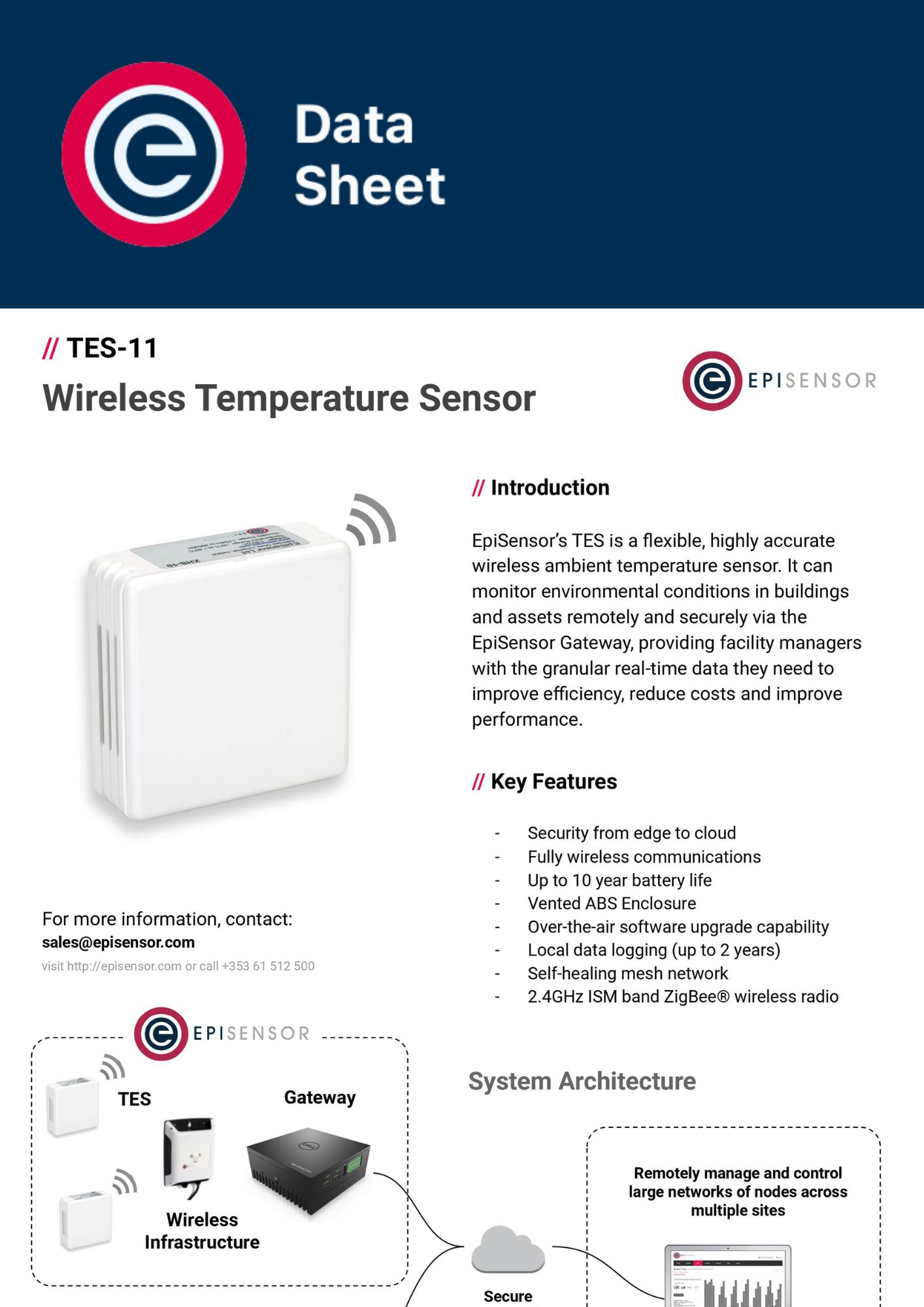 | Ambient Temperature Sensor (TES-1X) Datasheet | EpiSensor’s TES is a flexible, highly accurate wireless ambient temperature sensor. It can monitor environmental conditions in buildings and assets remotely and securely via the EpiSensor Gateway, providing facility managers | Datasheets | EPI-200-00 | datasheets | tes | environmental-monitoring | |
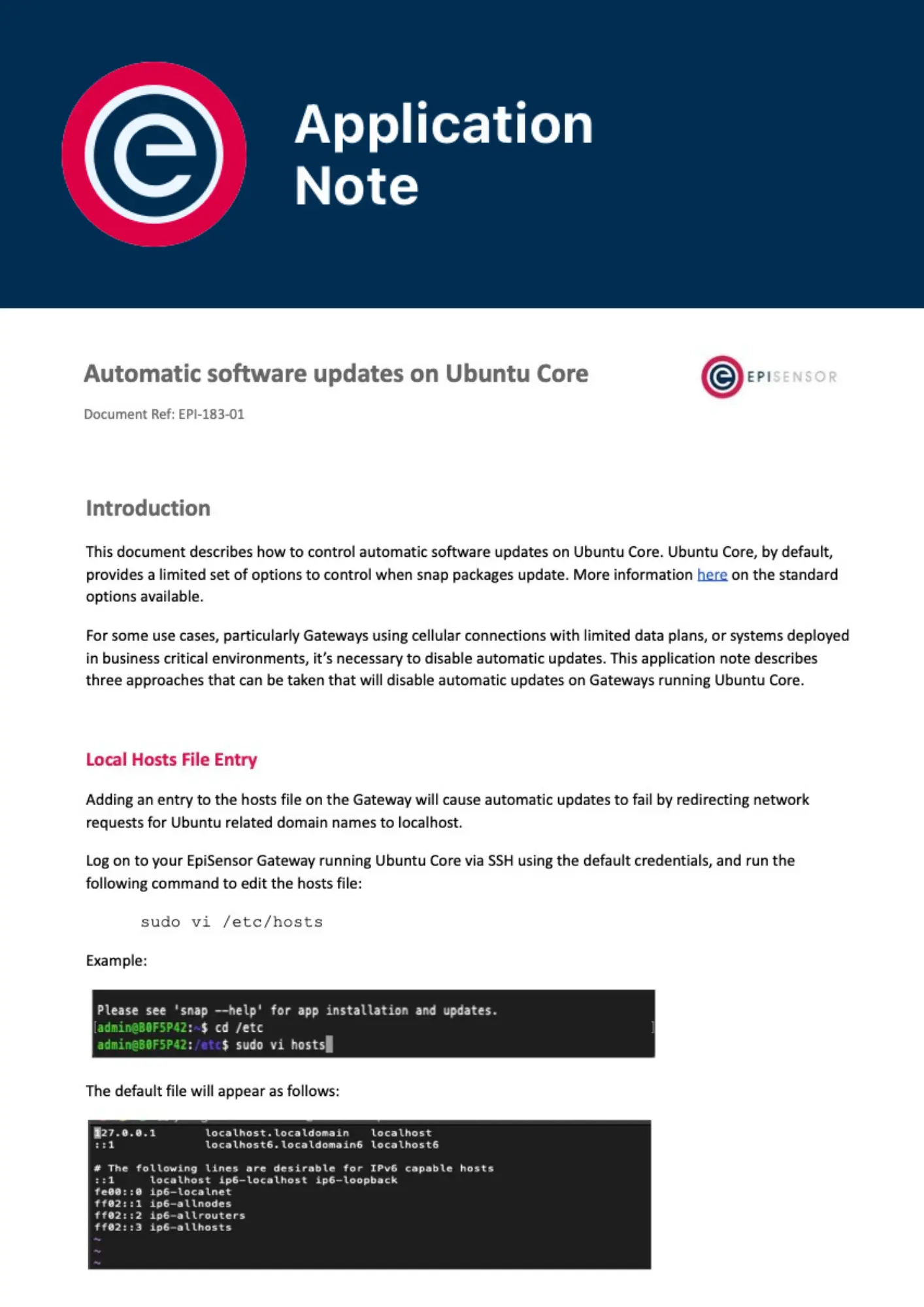 | Automatic software updates on Ubuntu Core Application Note | This document describes how to control automatic software updates on Ubuntu Core. Ubuntu Core, by default, provides a limited set of options to control when snap packages update. More information here on the standard options available. | Application Notes | EPI-183-01 | application-notes | ngr zgw | demand-response energy-management environmental-monitoring | |
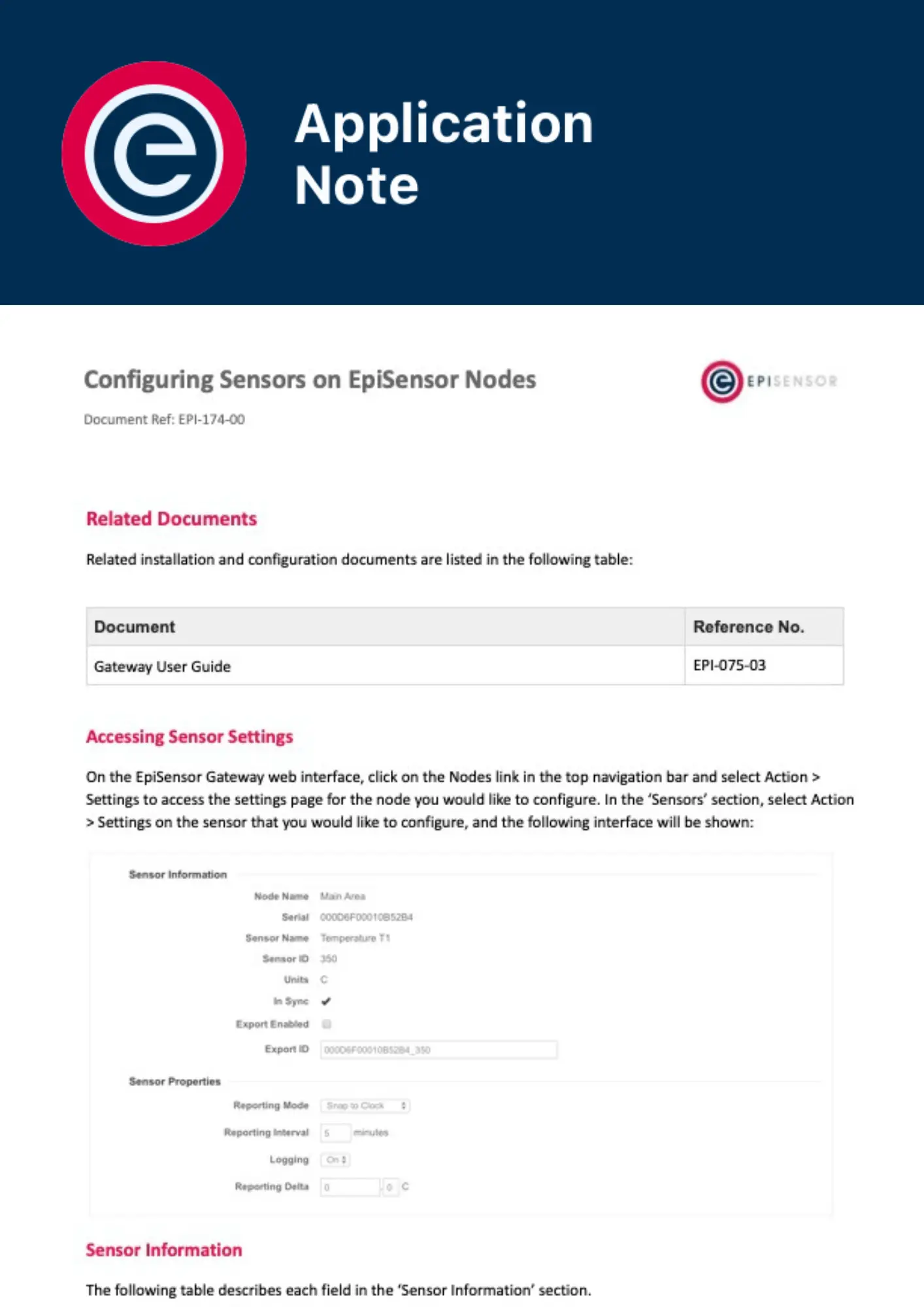 | Configuring Sensors on EpiSensor Nodes Application Note | This Application Note describes the process of configuring EpiSensor Nodes on the ZGW and NGR Gateway web interface. Here you can find instructions on how to access the sensor settings on the EpiSensor Gateway web interface along with the description of all the sensor properties and sensor information fields. | Application Notes | EPI-174-00 | application-notes | ngr zgw | demand-response energy-management environmental-monitoring | |
 | Configuring the High Speed Data Module on ZDR Application Note | EpiSensor’s Demand Response Controller is an all-in-one solution for large-scale Demand Side Response programs. Built on EpiSensor’s hardened Industrial IoT platform, it meets the highest standards of accuracy, reliability and security, with a consumer-class user experience that’s easy to install, configure and maintain. This Application Note describes the installation, configuration and use of the High Speed Data Module in the ZDR-16. | Application Notes | EPI-131-03 | application-notes | zdr | demand-response | |
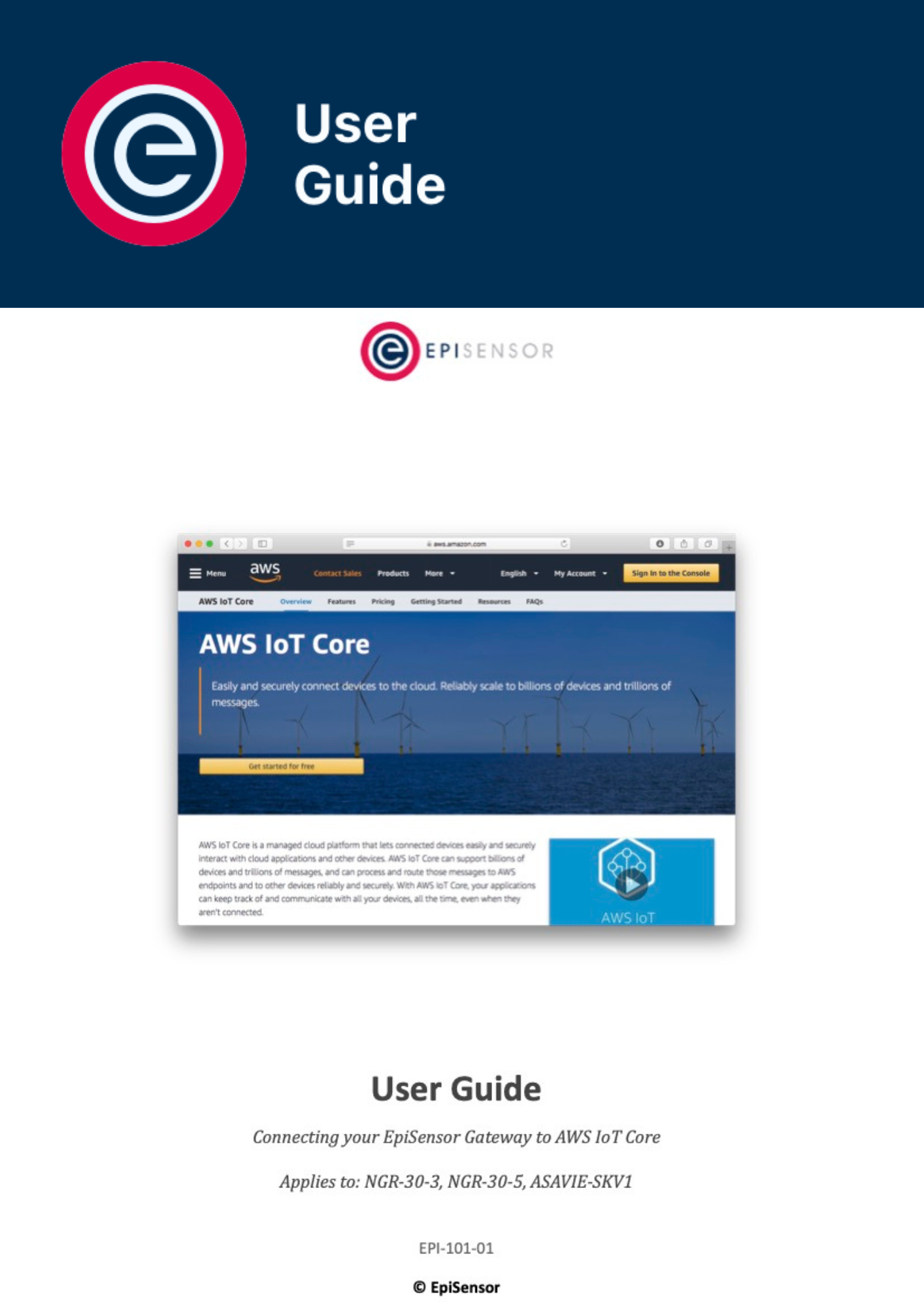 | Connecting your EpiSensor Gateway to AWS IoT Core | EpiSensor’s Internet of Things platform is easy to deploy, configure and scale and includes a range of sensor products that can monitor a variety of environmental and energy usage parameters in commercial and industrial environments. | User Guides | EPI-101-01 | user-guides | zgw | demand-response energy-management environmental-monitoring | |
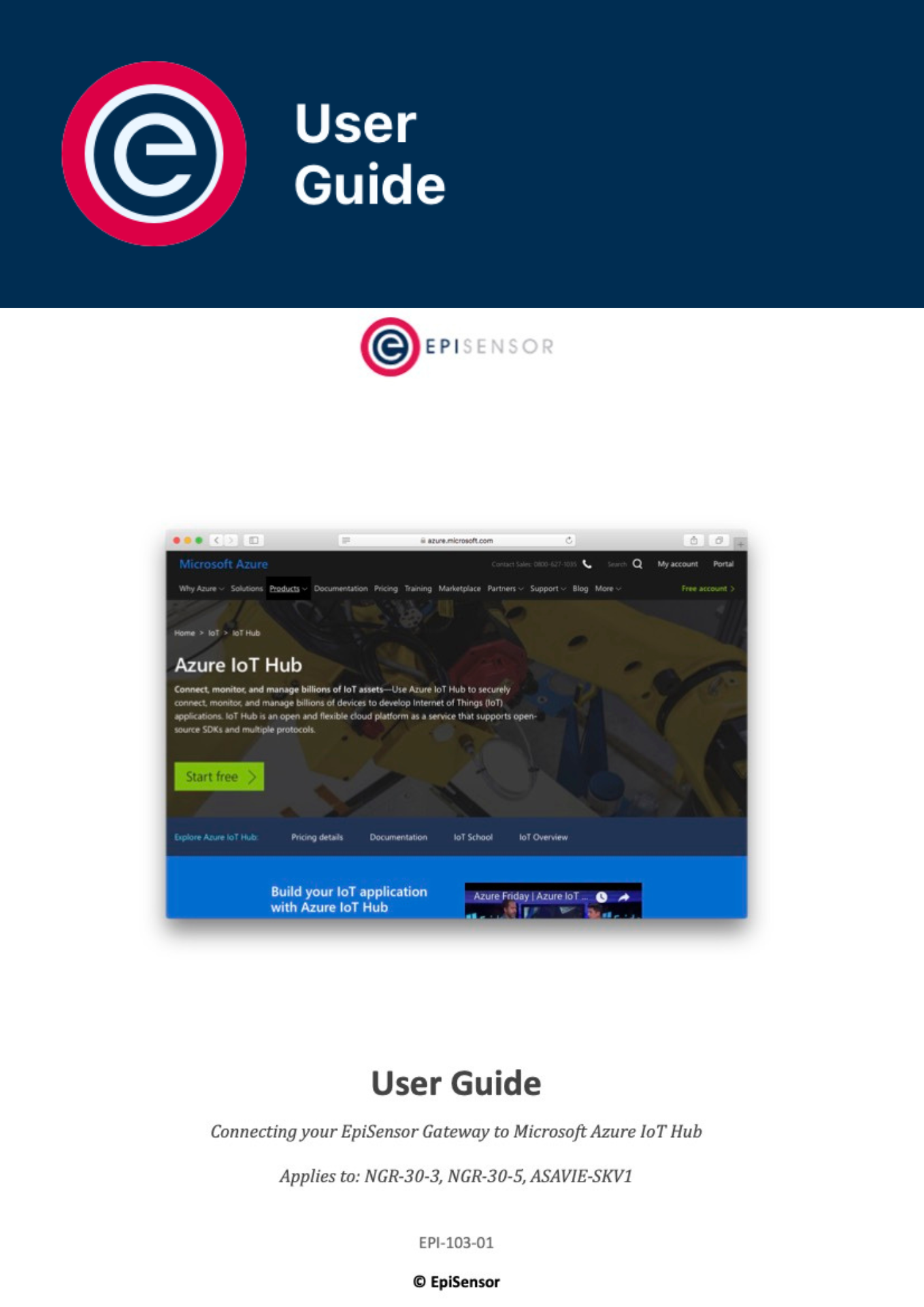 | Connecting your EpiSensor Gateway to Microsoft Azure IoT Hub | EpiSensor’s Internet of Things platform is easy to deploy, configure and scale and includes a range of sensor products that can monitor a variety of environmental and energy usage parameters in commercial and industrial environments. | User Guides | EPI-103-01 | user-guides | ngr zgw | demand-response energy-management environmental-monitoring | |
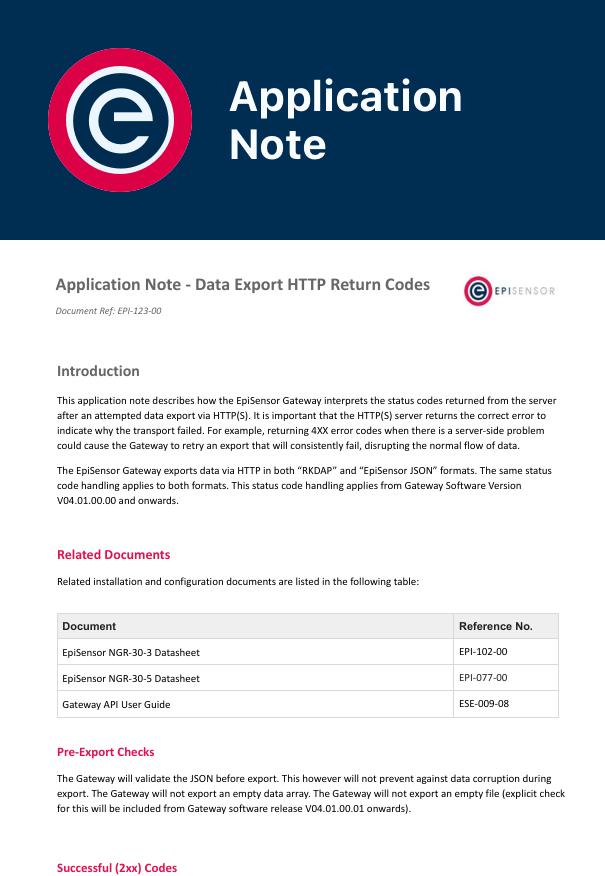 | Data Export HTTP Return Codes Application Note | This application note describes how the EpiSensor Gateway interprets the status codes returned from the server after an attempted data export via HTTP(S). It is important that the HTTP(S) server returns the correct error to indicate why the transport failed. For example, returning 4XX error codes when there is a server-side problem could cause the Gateway to retry an export that will consistently fail, disrupting the normal flow of data. | Application Notes | EPI-123-00 | application-notes | ngr zgw | demand-response energy-management environmental-monitoring | |
 | Demand Response Event Data Application Note | This Application Note describes how demand response event data (which is produced by the high-speed data module on EpiSensor’s ZDR product line) is handled by the EpiSensor Gateway. | Application Notes | EPI-124-01 | application-notes | zdr zgw | demand-response | |
 | Demand Response with EpiSensor Application Note | EpiSensor’s ZDR is an all-in-one solution for large-scale Demand Side Response programs. Built on EpiSensor’s hardened Industrial IoT platform, it meets the highest standards of accuracy, reliability and security, with a consumer-class user experience that’s easy to install, configure and maintain. This Application Note shows at high level example of demand response implementation. | Application Notes | EPI-121-00 | application-notes | zdr zgw | demand-response | |
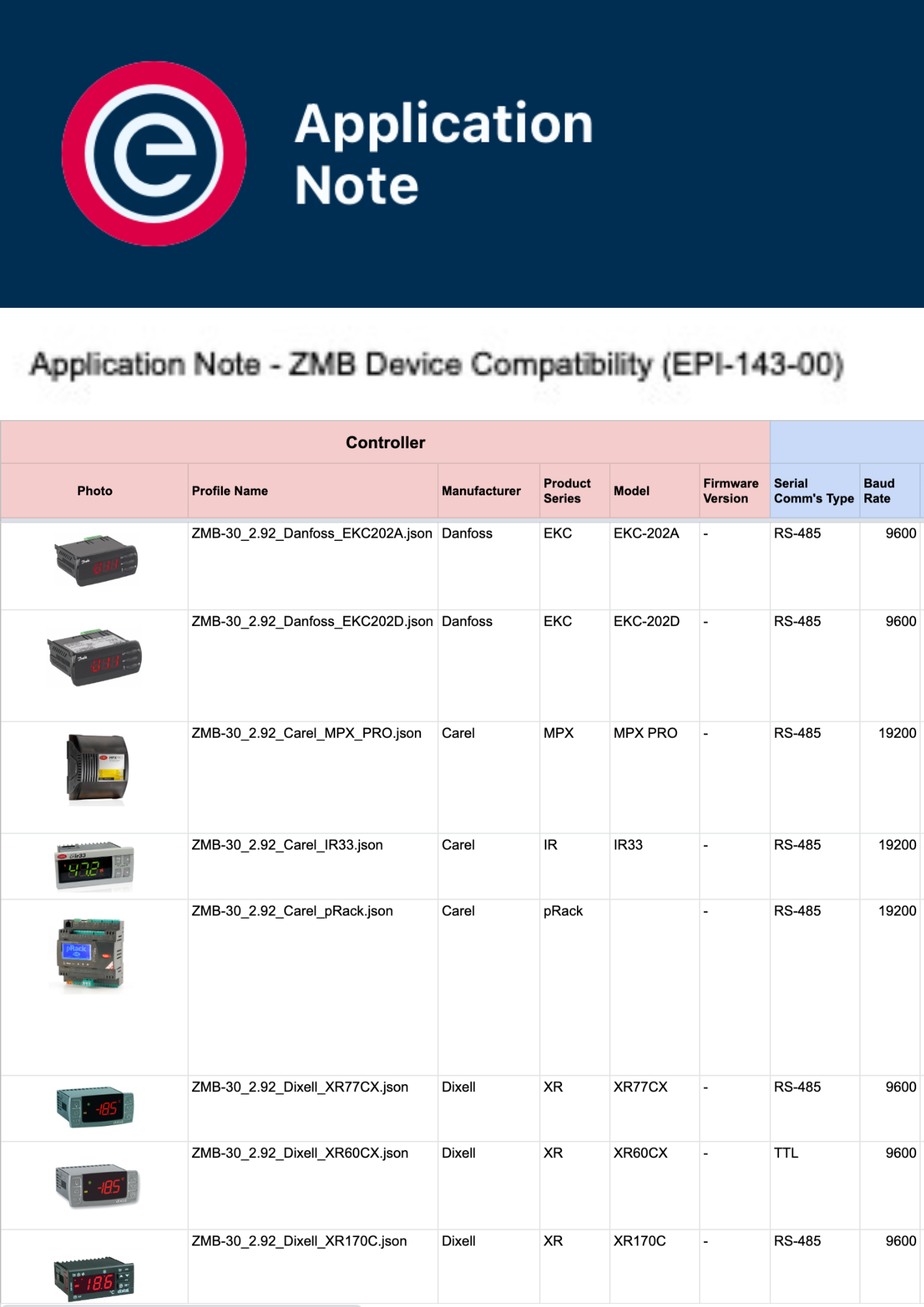 | Device Compatibility Wireless Modbus Interface (ZMB) Application Note | EpiSensor’s Wireless Modbus Interface (ZMB) makes it easy to collect data from wired Modbus-enabled equipment. Data is transferred securely over a wireless network to a central Gateway, where it is stored and exported to a variety of 3rd party platforms for storage, visualisation and analysis. This application note lists some of the devices compatible with the EpiSensor ZMB, with a particular focus on refrigeration monitoring. | Application Notes | EPI-143-00 | application-notes | zmb | demand-response energy-management environmental-monitoring | |
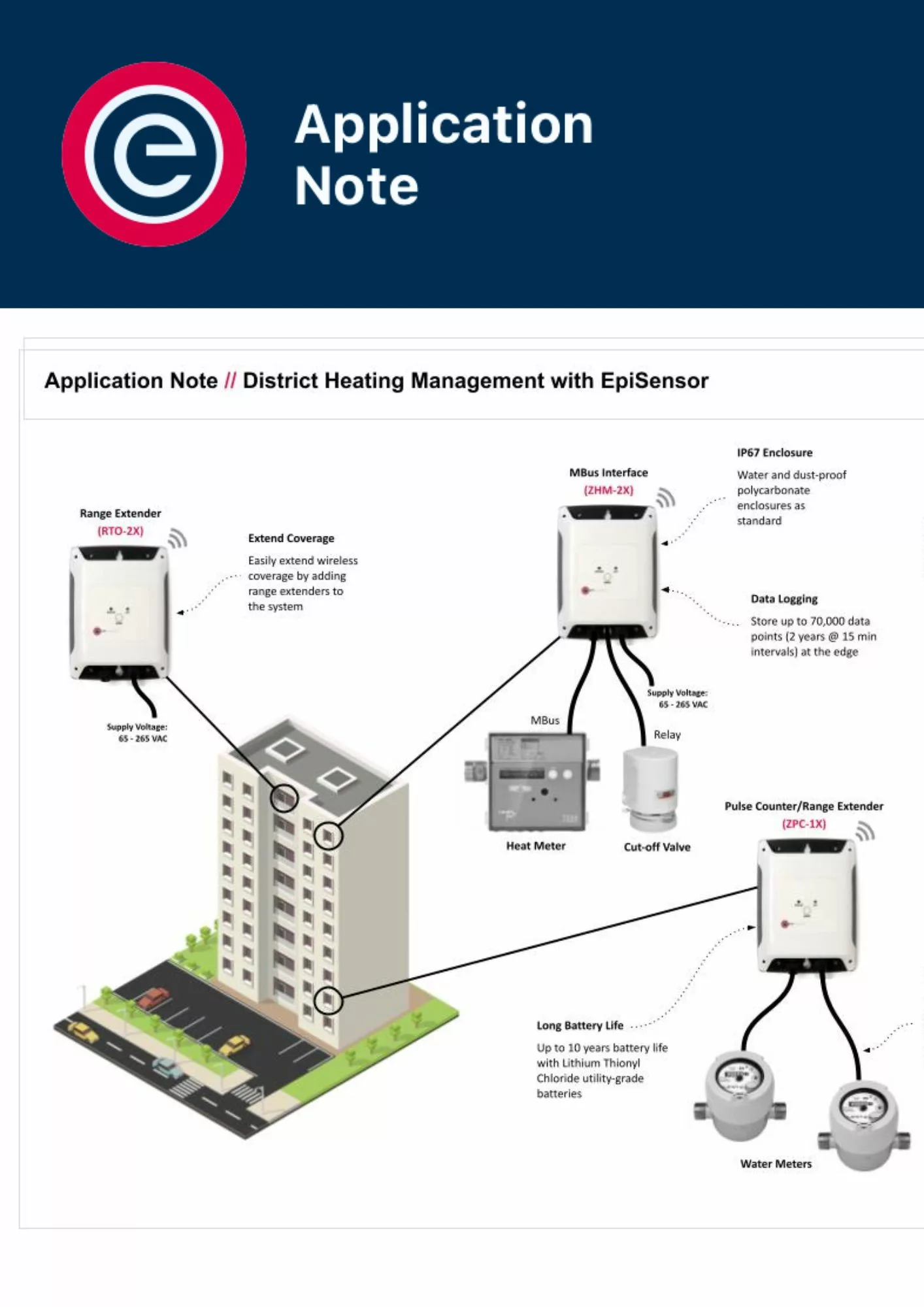 | District Heating Management with EpiSensor Application Note | This system diagram details the district heating management possible with EpiSensor. | Application Notes | EPI-065-00 | application-notes | zhm | energy-management | |
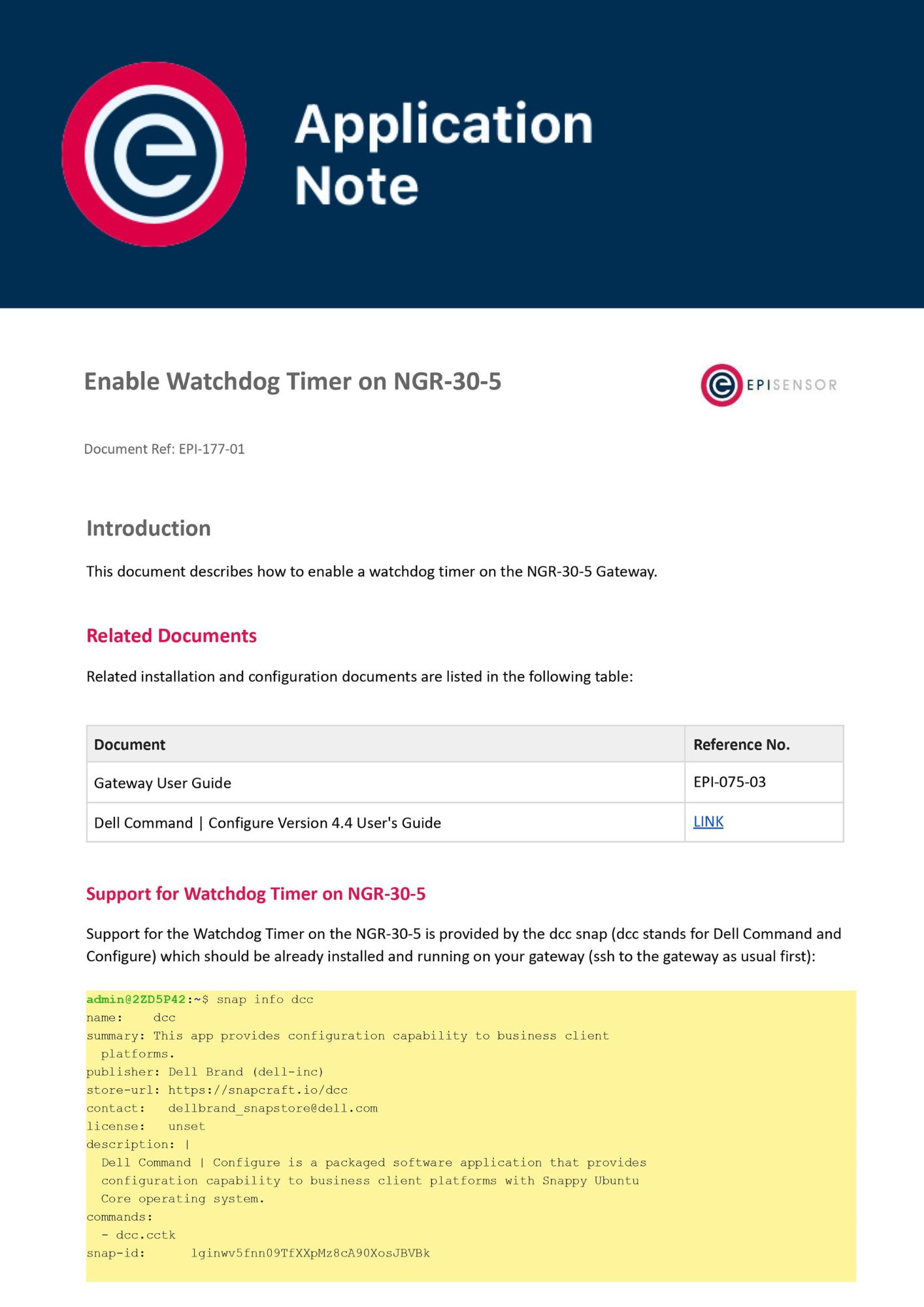 | Enable Watchdog Timer on NGR-30-5 Application Note | Support for the Watchdog Timer on the NGR-30-5 is provided by the dcc snap (dcc stands for Dell Command and Configure) which should be already installed and running on your gateway. | Application Notes | EPI-177-01 | application-notes | ngr | demand-response energy-management environmental-monitoring | |
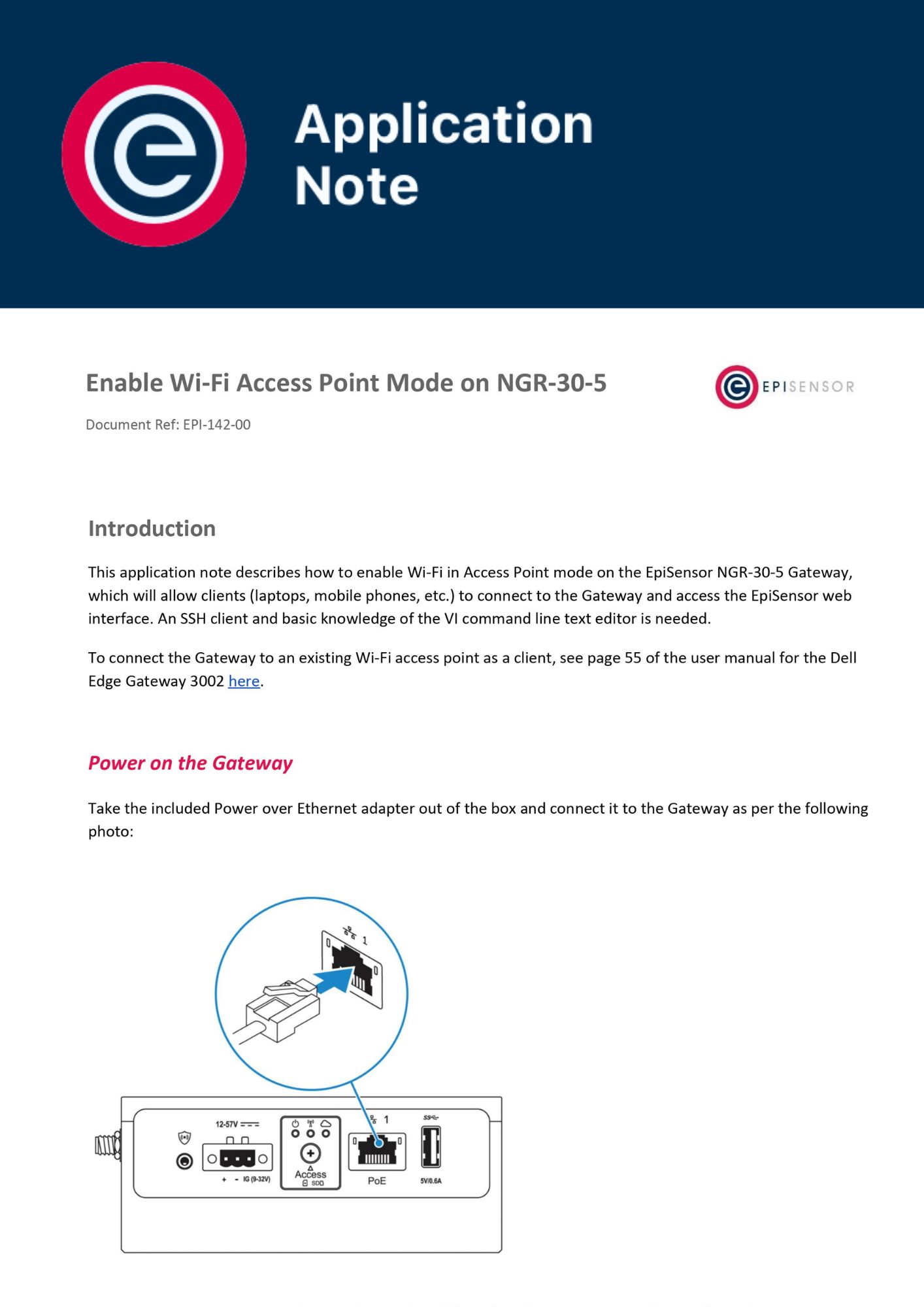 | Enable Wi-Fi Access Point Mode on NGR-30-5 Application Note | This application note describes how to enable Wi-Fi in Access Point mode on the EpiSensor NGR-30-5 Gateway, which will allow clients (laptops, mobile phones, etc.) to connect to the Gateway and access the EpiSensor web interface. An SSH client and basic knowledge of the VI command line text editor is needed. | Application Notes | EPI-142-00 | application-notes | ngr | demand-response energy-management environmental-monitoring | |
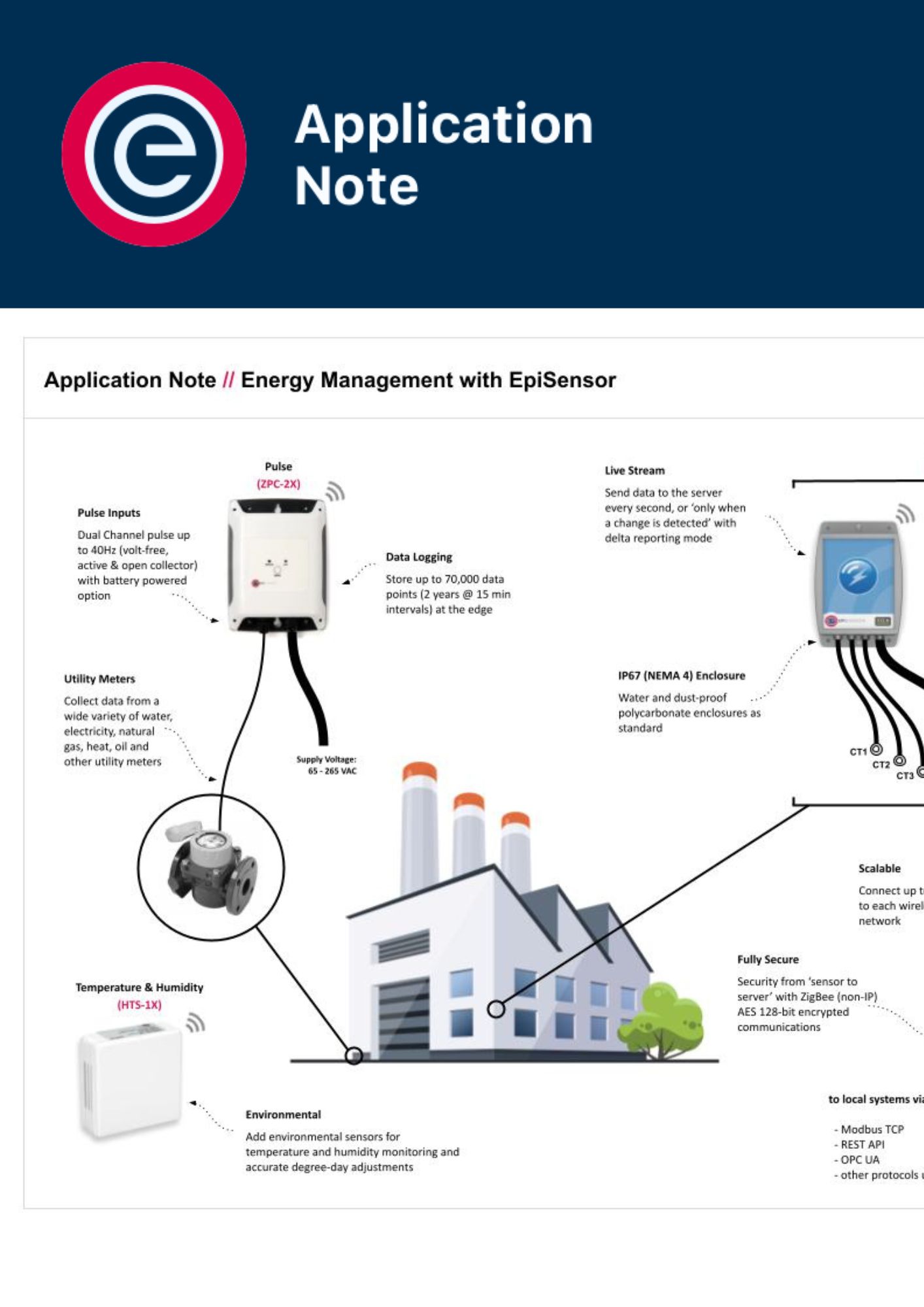 | Energy Management with EpiSensor Application Note | This diagram details the energy management possible with EpiSensor. It gives a high level view of the integration of EpiSensor Gateway software and devices with IoT software apps over cloud networks to assist with Energy Management | Application Notes | EPI-115-00 | application-notes | zem zgw zhm zmb zpc | energy-management | |
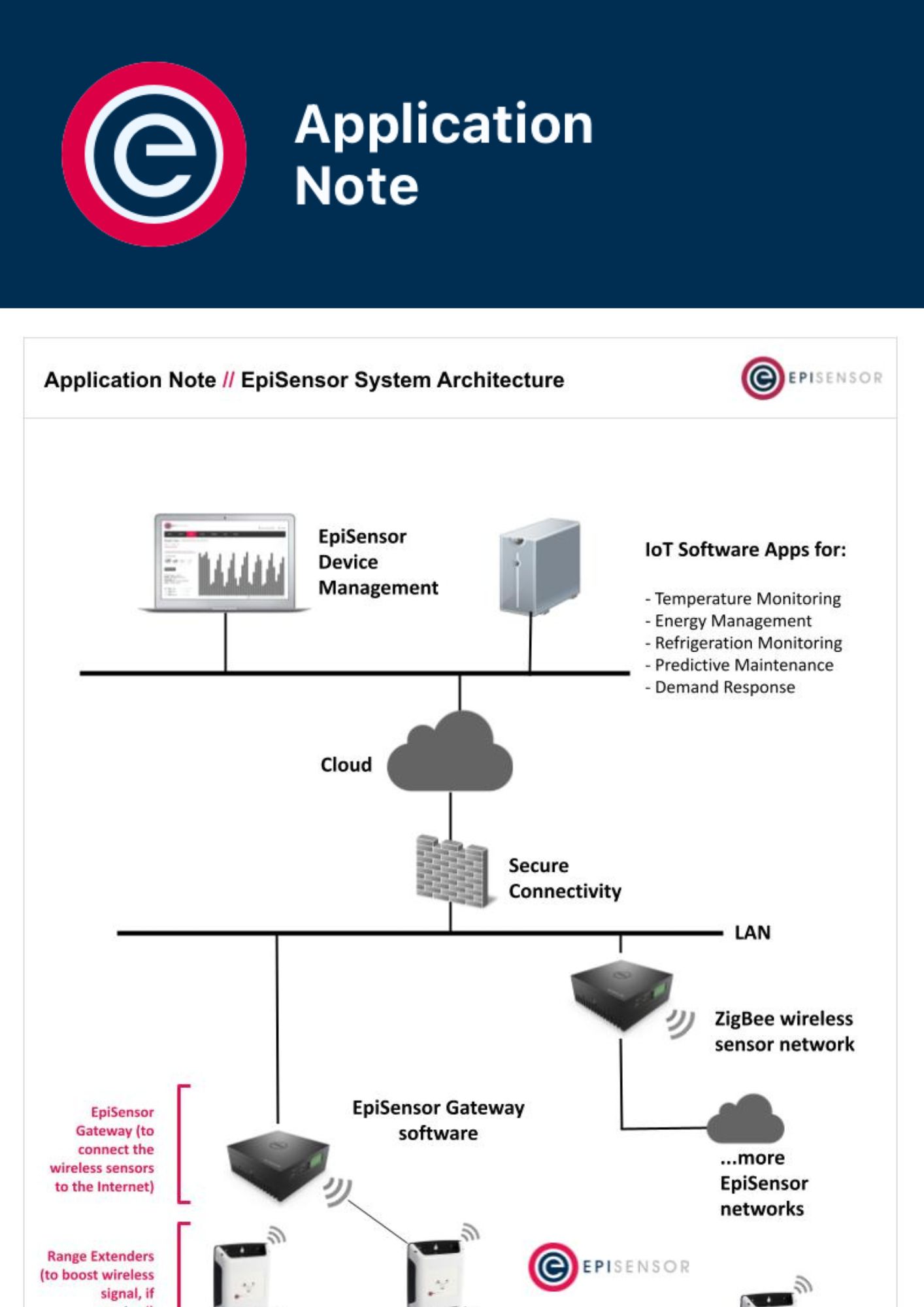 | EpiSensor System Architecture Application Note | This system diagram gives a high level view of the integration of EpiSensor Gateway software and devices with IoT software apps over cloud networks to assist with: Temperature Monitoring | Application Notes | EPI-116-00 | application-notes | rto tes zdr zem zgw zht zmb zpc | demand-response energy-management environmental-monitoring | |
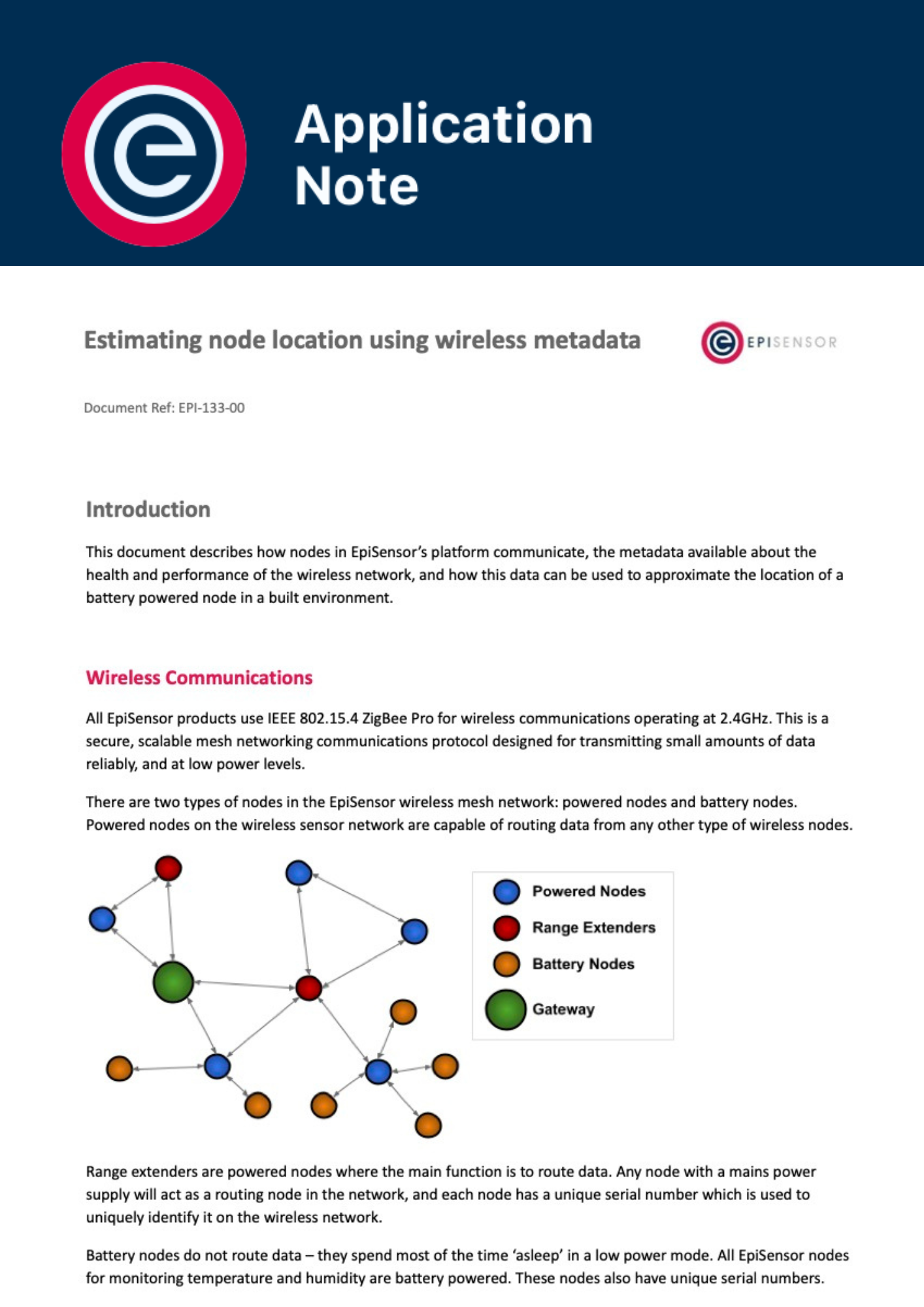 | Estimating Node Location Using Wireless Metadata Application Note | This document describes how nodes in EpiSensor’s platform communicate, the metadata available about the health and performance of the wireless network, and how this data can be used to approximate the location of a battery powered node in a built environment. | Application Notes | EPI-133-00 | application-notes | zgw | demand-response energy-management environmental-monitoring | |
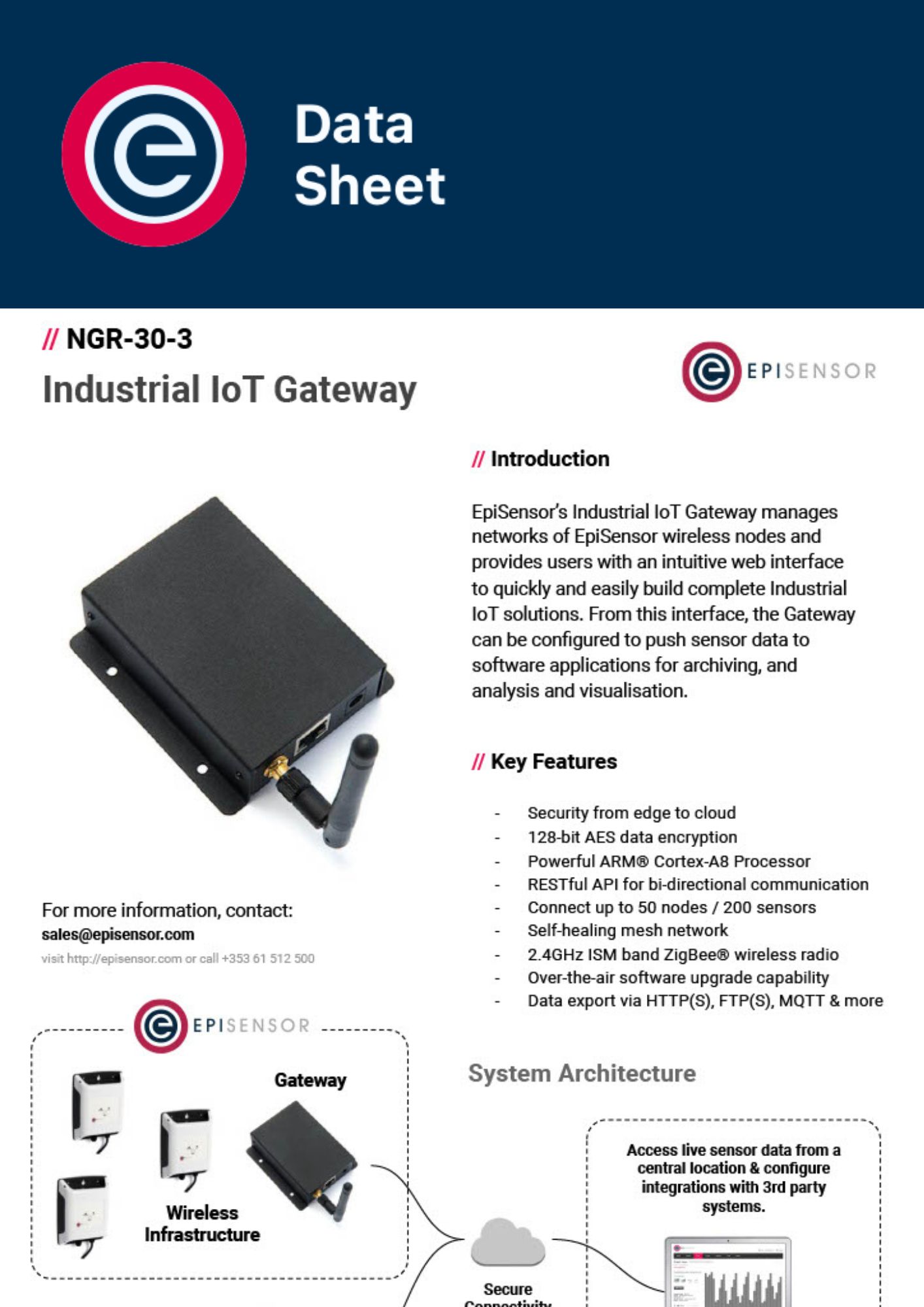 | Gateway (NGR-30-3) Datasheet | EpiSensor’s Industrial IoT Gateway manages networks of EpiSensor wireless nodes and provides users with an intuitive web interface to quickly and easily build complete Industrial IoT solutions. From this interface, the Gateway can be configured to push sensor data to software applications for archiving, and analysis and visualisation. | Datasheets | EPI-102-00 | datasheets | ngr | energy-management environmental-monitoring | |
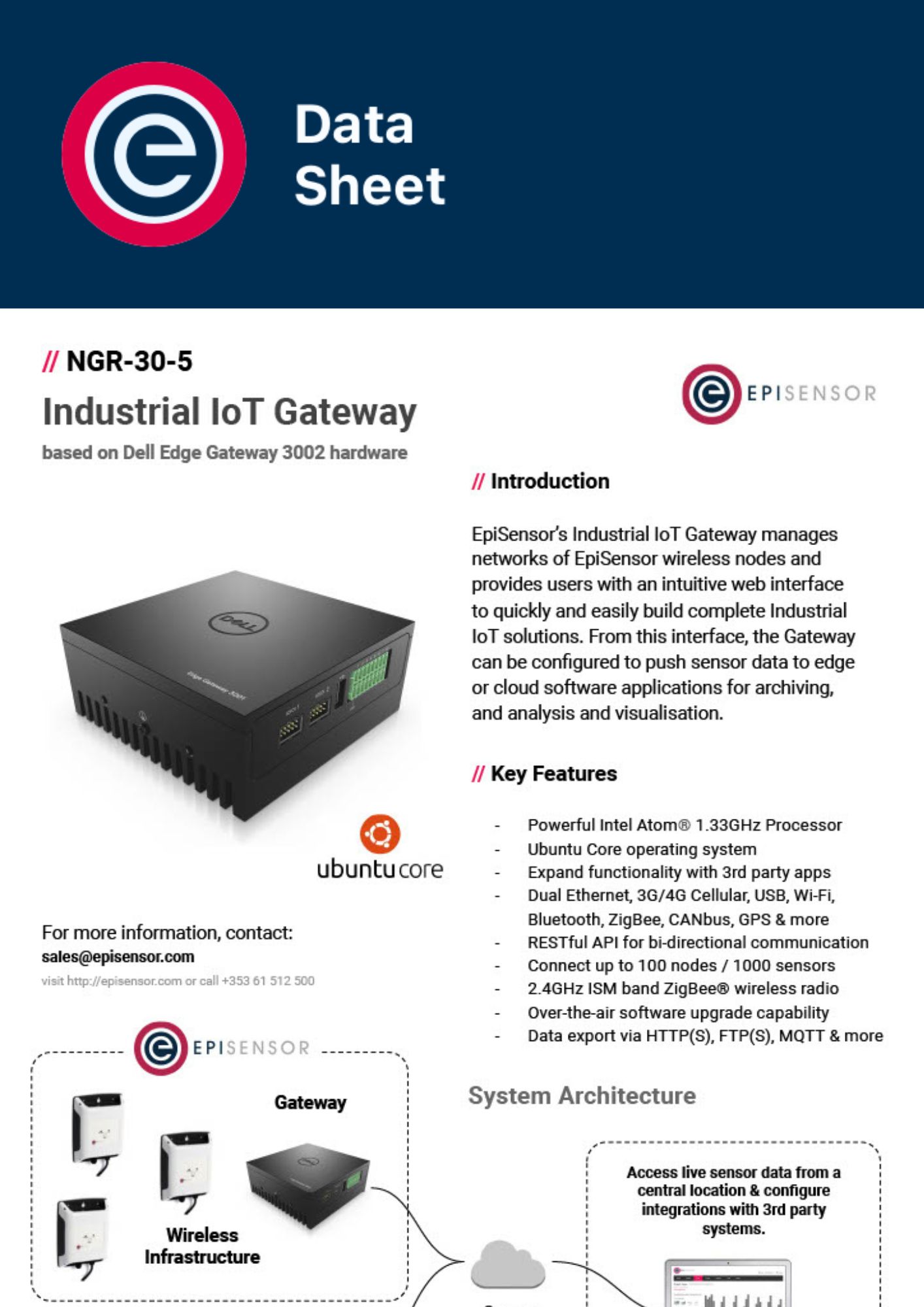 | Gateway (NGR-30-5) Datasheet | EpiSensor’s Industrial IoT Gateway manages networks of EpiSensor wireless nodes and provides users with an intuitive web interface to quickly and easily build complete Industrial IoT solutions. From this interface, the Gateway can be configured to push sensor data to edge or cloud software applications for archiving, and analysis and visualisation. | Datasheets | EPI-077-01 | datasheets | ngr | demand-response energy-management environmental-monitoring | |
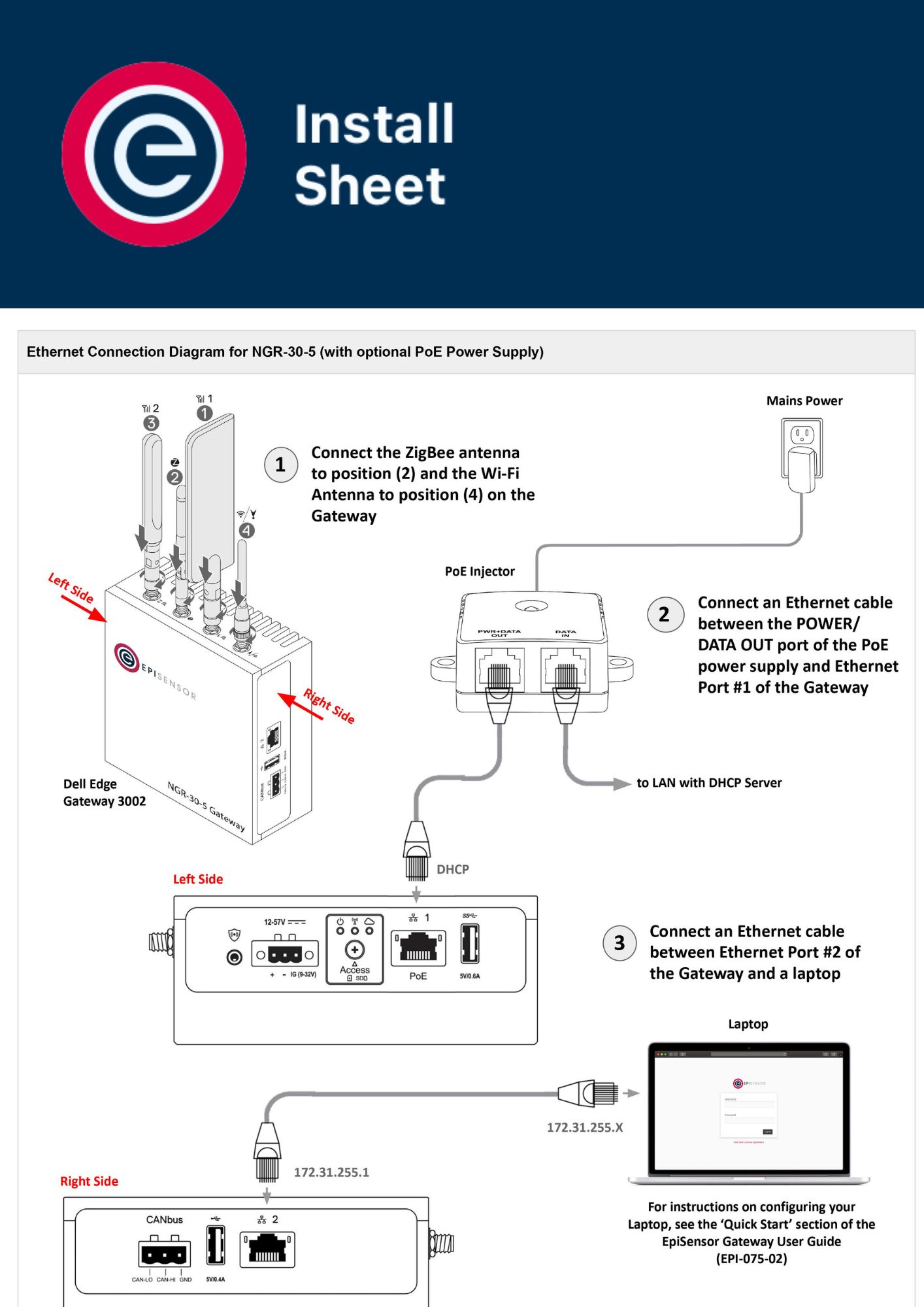 | Gateway (NGR-30-5) Install Sheet | This document details the installation of the EpiSensor NGR-30-5 Gateway. EpiSensor’s Industrial IoT Gateway manages networks of EpiSensor wireless nodes and provides users with an intuitive web interface to quickly and easily build complete Industrial IoT solutions. From this interface, the Gateway can be configured to push sensor data to edge or cloud software applications for archiving, and analysis and visualisation. | Install Sheets | EPI-148-01 | install-sheets | ngr | demand-response energy-management environmental-monitoring | |
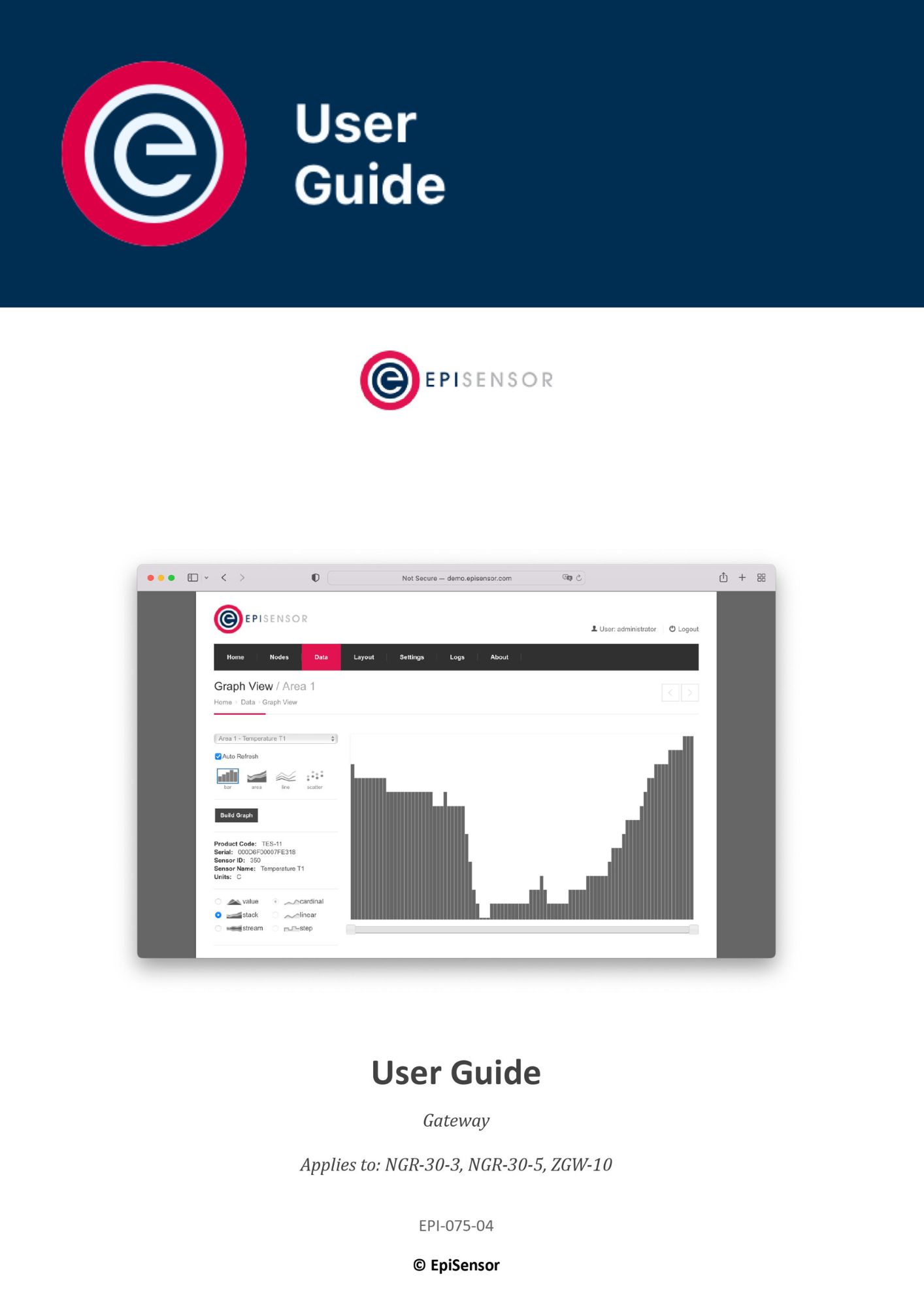 | Gateway (NGR) User Guide | EpiSensor’s Internet of Things platform is easy to deploy, configure and scale and includes a range of sensor products that can monitor a variety of environmental and energy usage parameters in commercial and industrial environments. | User Guides | EPI-075-04 | user-guides | ngr | energy-management environmental-monitoring | |
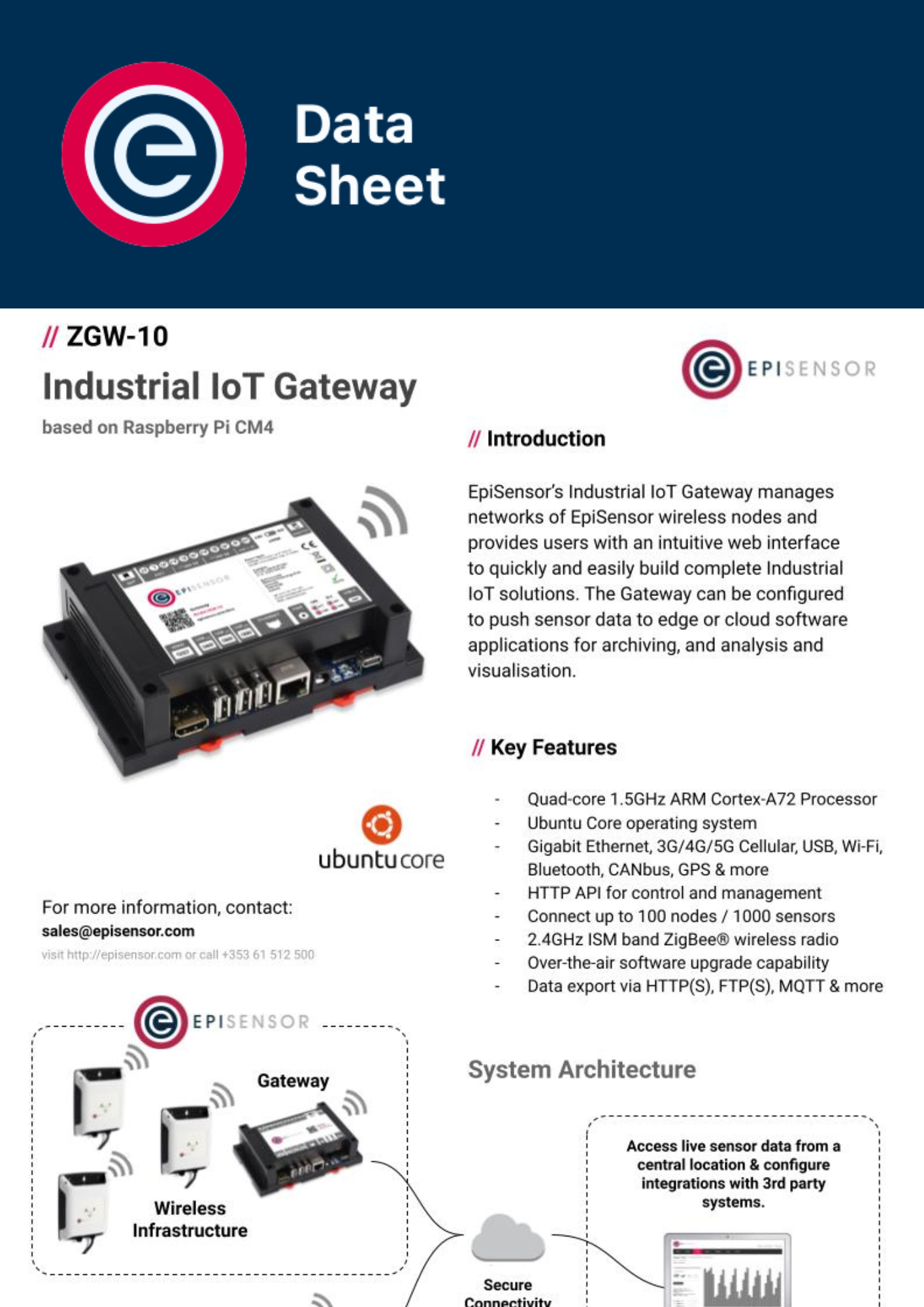 | Gateway (ZGW-10) Datasheet | EpiSensor’s Industrial IoT Gateway manages networks of EpiSensor wireless nodes and provides users with an intuitive web interface to quickly and easily build complete Industrial IoT solutions. The Gateway can be configured to push sensor data to edge or cloud software applications for archiving, and analysis and visualisation. | Datasheets | EPI-213-01 | datasheets | zgw | demand-response energy-management environmental-monitoring | |
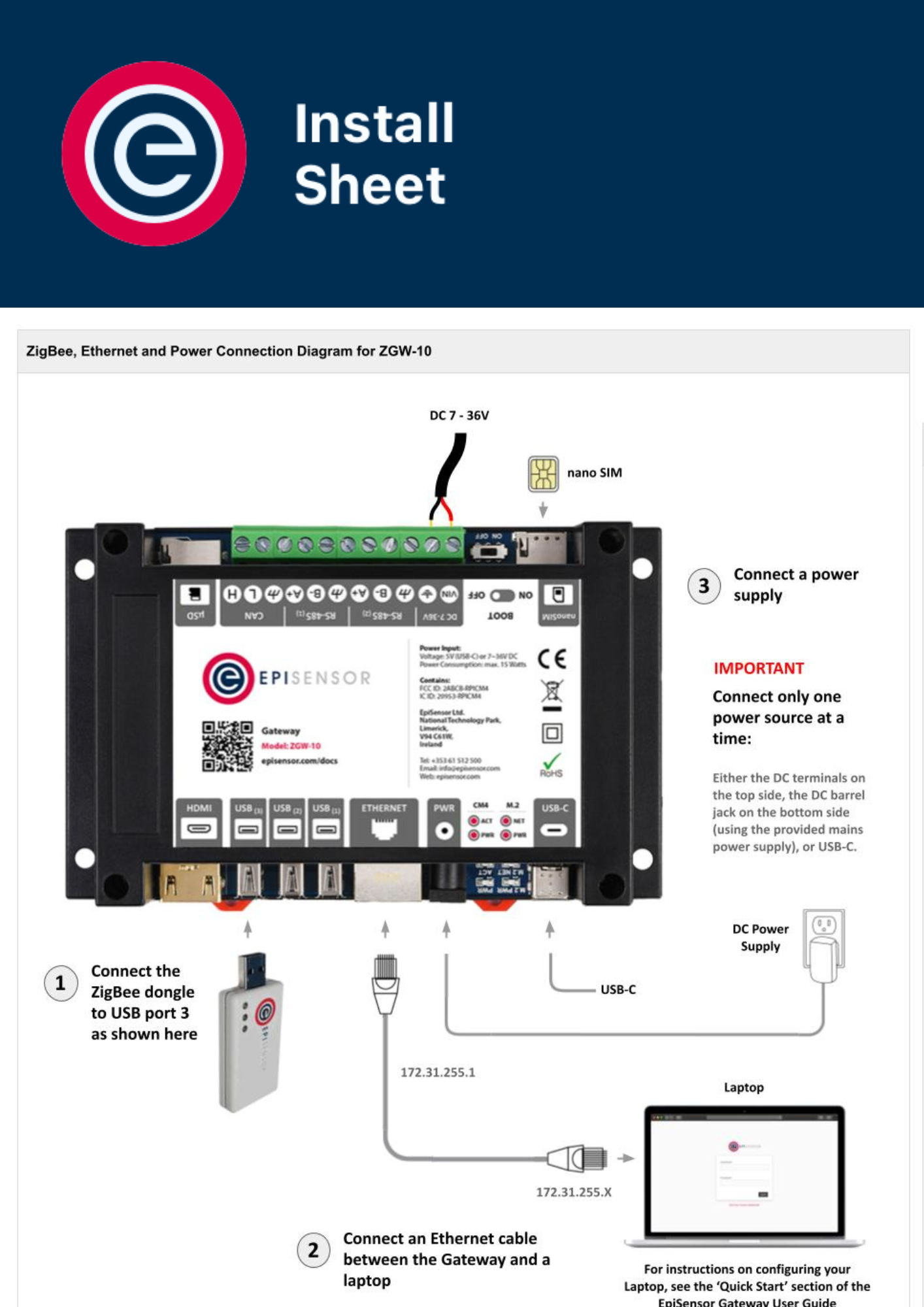 | Gateway (ZGW-10) Install Sheet | EpiSensor’s Industrial IoT Gateway manages networks of EpiSensor wireless nodes and provides users with an intuitive web interface to quickly and easily build complete Industrial IoT solutions. The Gateway can be configured to push sensor data to edge or cloud software applications for archiving, and analysis and visualisation. This document shows the installation of the EpiSensor Gateway ZGW-10. | Install Sheets | EPI-215-01 | install-sheets | zgw | demand-response energy-management environmental-monitoring | |
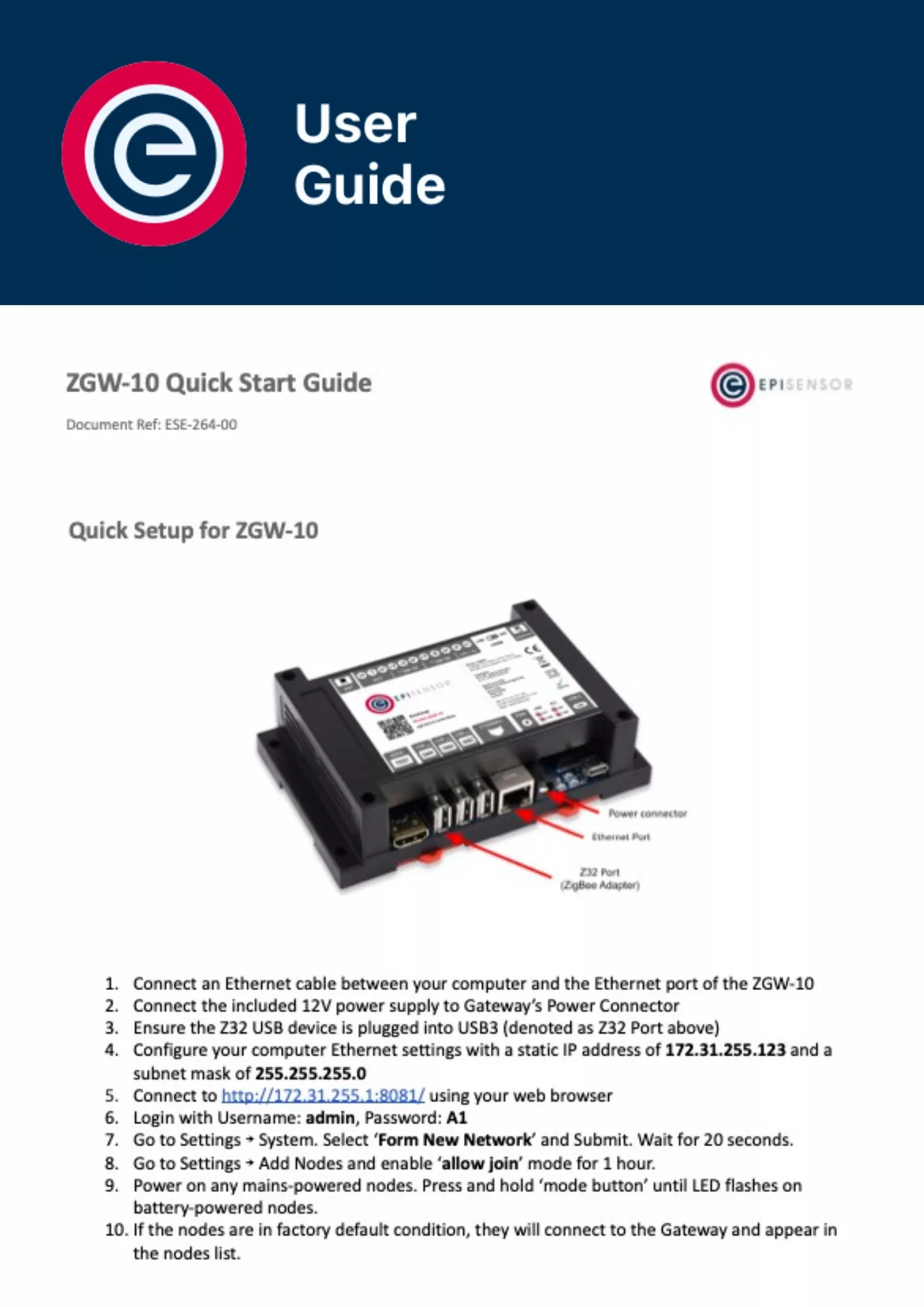 | Gateway (ZGW-10) Quick Start Guide | The EpiSensor ZGW-10 gateway quick start guide, to help get you on your way with initial setup up to connecting nodes | User Guides | EPI-264-00 | user-guides | zgw | demand-response energy-management environmental-monitoring | |
 | Gateway (ZGW-10) User Guide | This user guide contains technical information on configuring and maintaining the central component in the platform – the Gateway. For a minimum system, you will need a Gateway, a computer to access the web interface of the Gateway, an Ethernet cable (included) and at least one wireless node. | User Guides | EPI-233-03 | user-guides | ngr zgw | demand-response energy-management environmental-monitoring | |
 | Gateway API User Guide | EpiSensor’s Gateway provides a HTTP API so developers can interact with the Gateway and wireless nodes programmatically. This means that changes can be made in bulk and systems can be more easily monitored and maintained remotely. This document describes how to interact with the Gateway API. | User Guides | EPI-009-10 | user-guides | ngr zgw | demand-response energy-management environmental-monitoring | |
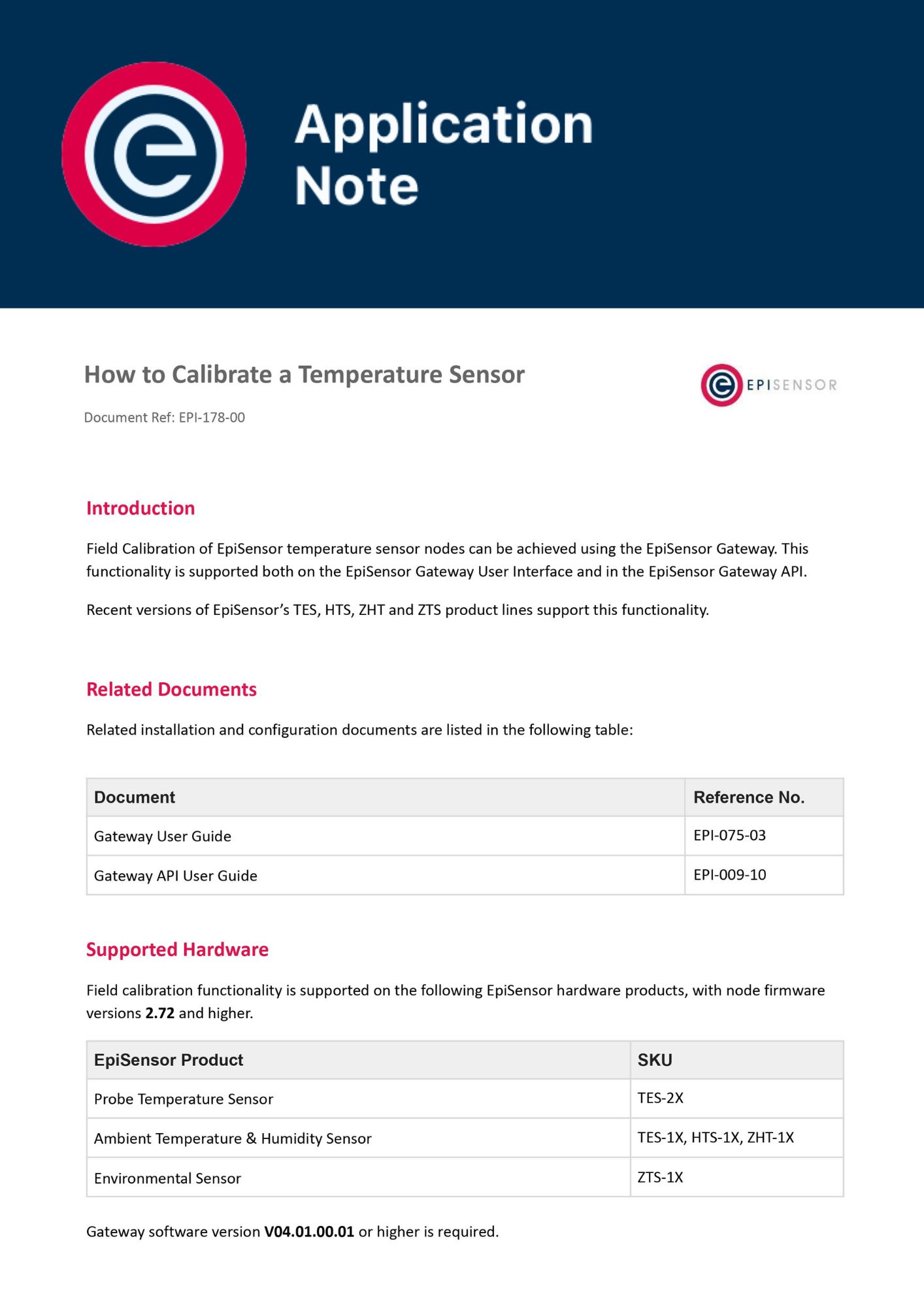 | How To Calibrate a Temperature Sensor Application Note | Field Calibration of EpiSensor temperature sensor nodes can be achieved using the EpiSensor Gateway. This functionality is supported both on the EpiSensor Gateway User Interface and in the EpiSensor Gateway API. Recent versions of EpiSensor’s TES, HTS, ZHT and ZTS product lines support this functionality. | Application Notes | EPI-178-00 | application-notes | tes zgw | environmental-monitoring | |
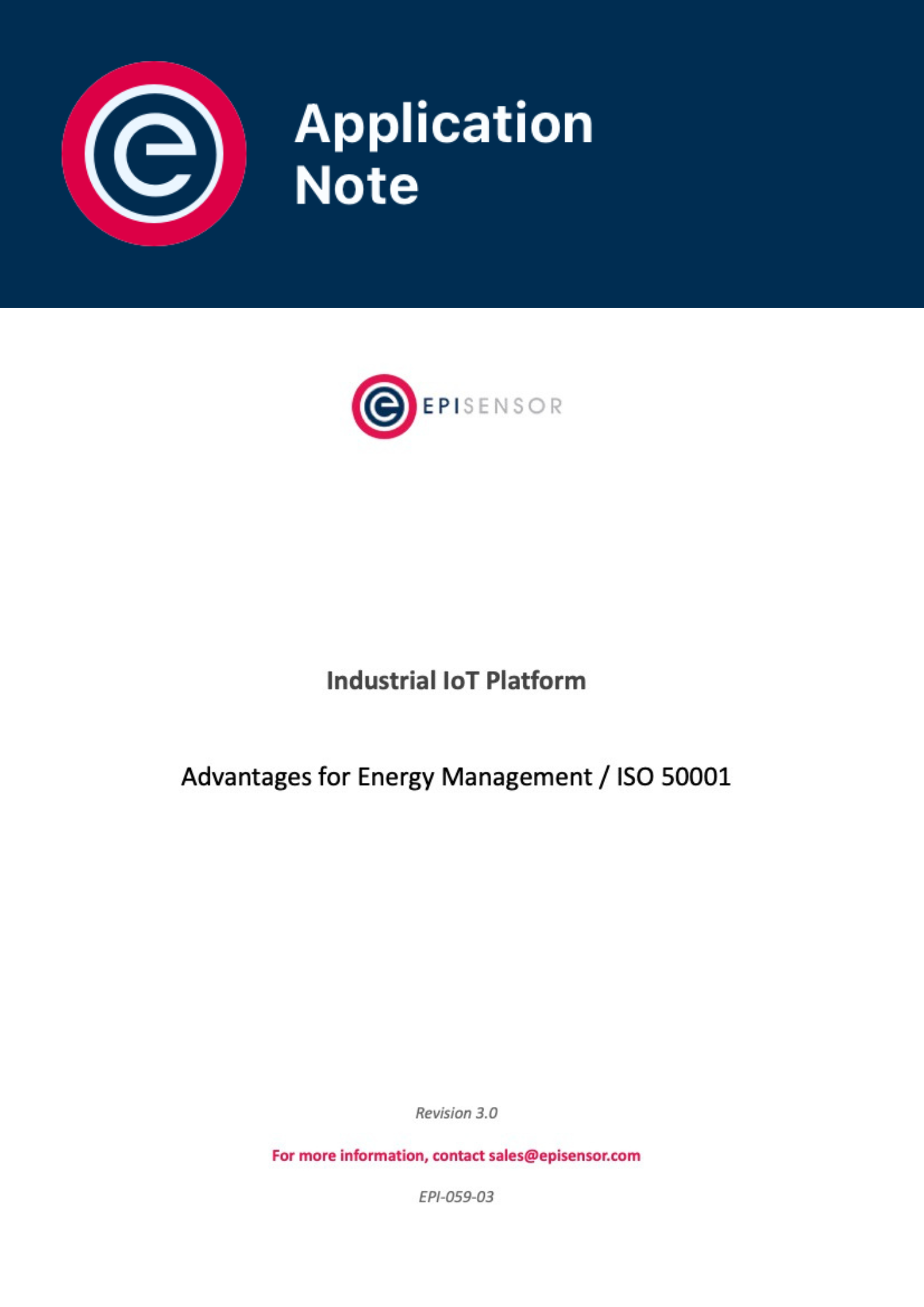 | ISO 50001 and the Advantages of the EpiSensor Platform Application Note | EpiSensor’s Industrial IoT platform makes it easier than ever to collect data, so people can make better decisions, reduce cost and improve energy efficiency. Data produced by our platform can transform the efficiency of an organisation by providing insight into areas of waste that could not be achieved using traditional monitoring, control and automation systems. | Application Notes | EPI-059-03 | application-notes | zem zgw | energy-management | |
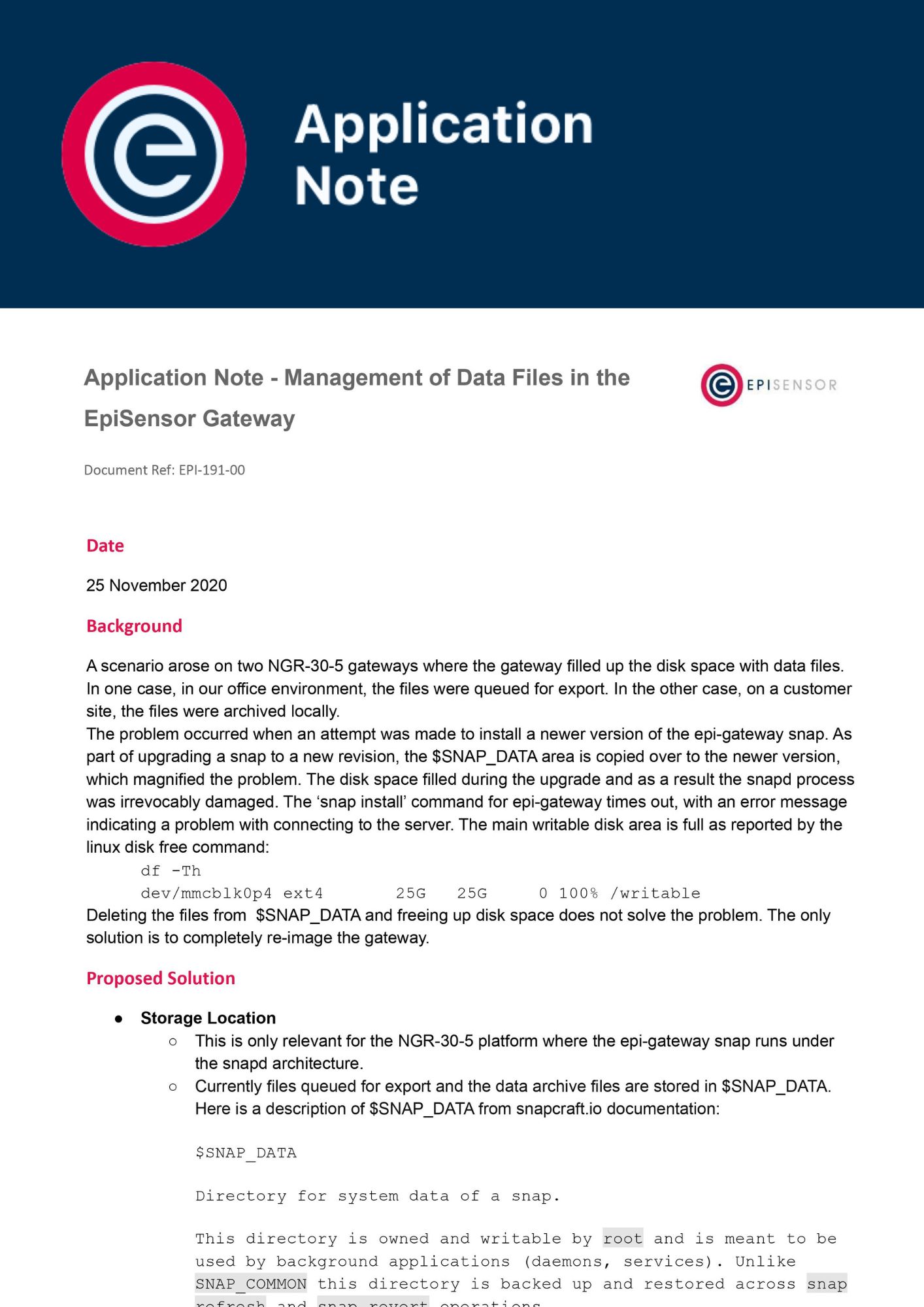 | Management of Data Files in the EpiSensor Gateway Application Note | This Application Note details the actions to remedy the issue when a gateway fills up disk space with data files, and an attempt to upgrade to a newer version of the epi-gateway has not resolved the issue. The solution is to completely re-image the gateway. | Application Notes | EPI-191-00 | application-notes | ngr zgw | demand-response energy-management environmental-monitoring | |
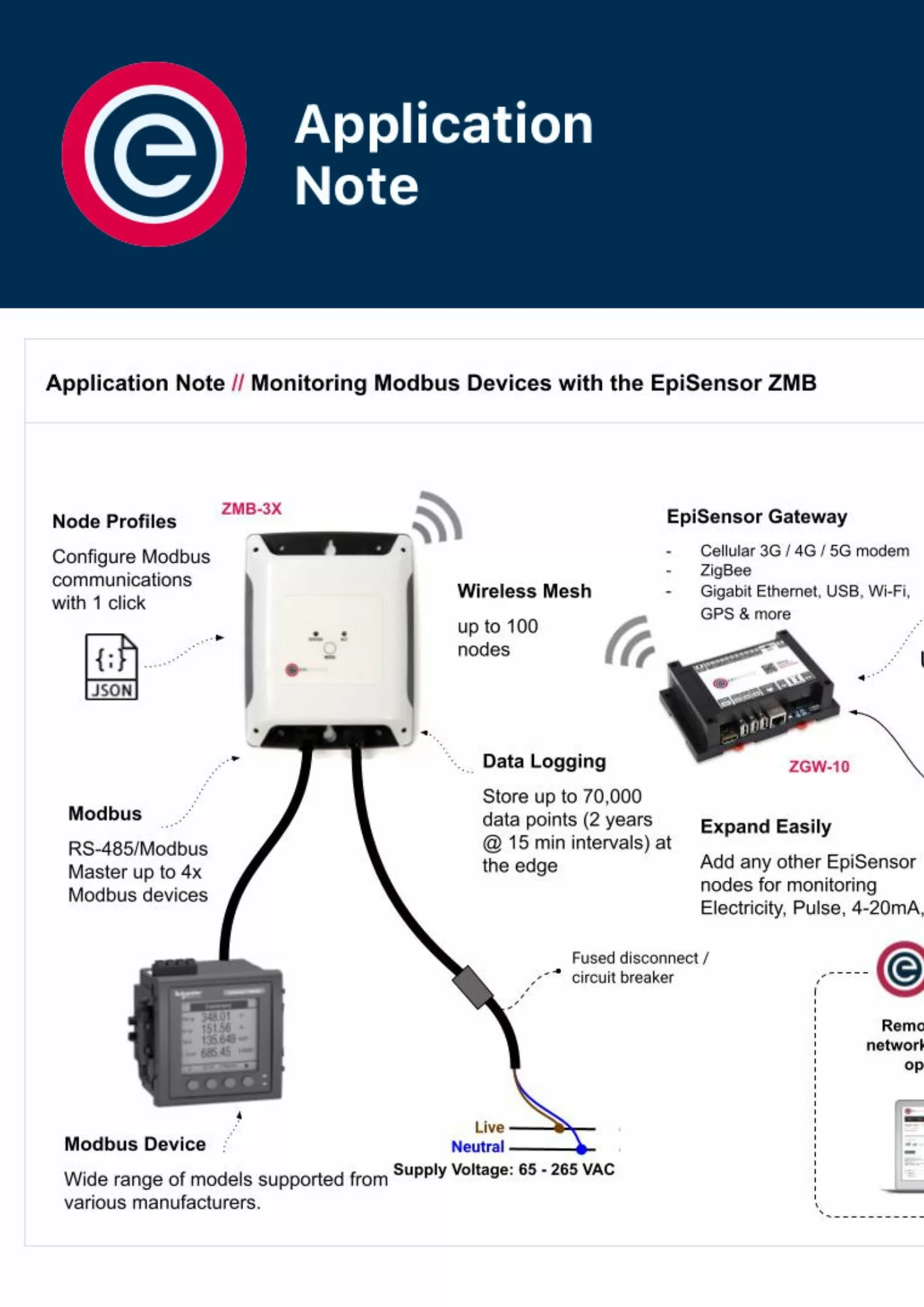 | Monitoring Modbus Devices with the EpiSensor ZMB Application Note | EpiSensor’s ZMB makes it easy to collect data from wired Modbus-enabled equipment. Data is transferred securely over a wireless network to a central Gateway, where it is stored and exported to a variety of 3rd party platforms for storage, visualisation and analysis. This Application Note details the system architecture of monitoring Modbus devices with our ZMB. | Application Notes | EPI-063-00 | application-notes | zmb | energy-management | |
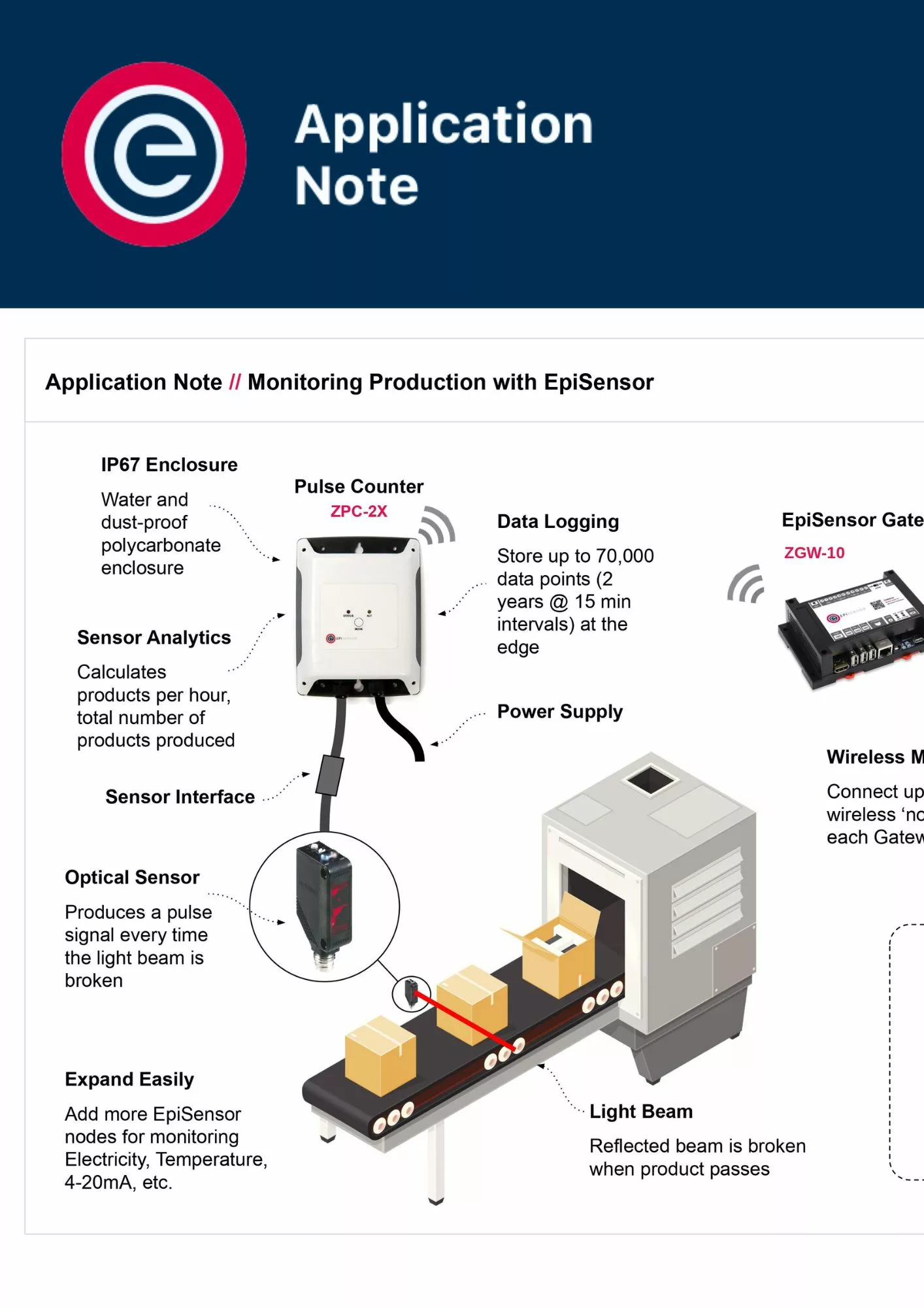 | Monitoring Production with EpiSensor Application Note | This system diagram gives a high level view of the integration of EpiSensor Gateway software and devices with IoT software apps over cloud networks to assist with Production Monitoring | Application Notes | EPI-145-00 | application-notes | ngr zgw zpc | ||
 | Monitoring the secondary output of a CT with ZDR Application Note | This Application Note describes how to monitor the secondary output of existing current transformers with ZDR. This approach simplifies the electrical installation and reduces cost and disruption of collecting electricity consumption data from customer sites and assets. This approach may not be suitable for all programs, particularly those with requirements for high accuracy metering. Mini CT’s are available as an option on ZDR hardware v1.5 only and must be specified at time of order (see ‘ordering information’ from the ZDR user guide). | Application Notes | EPI-144-00 | application-notes | zdr | demand-response | |
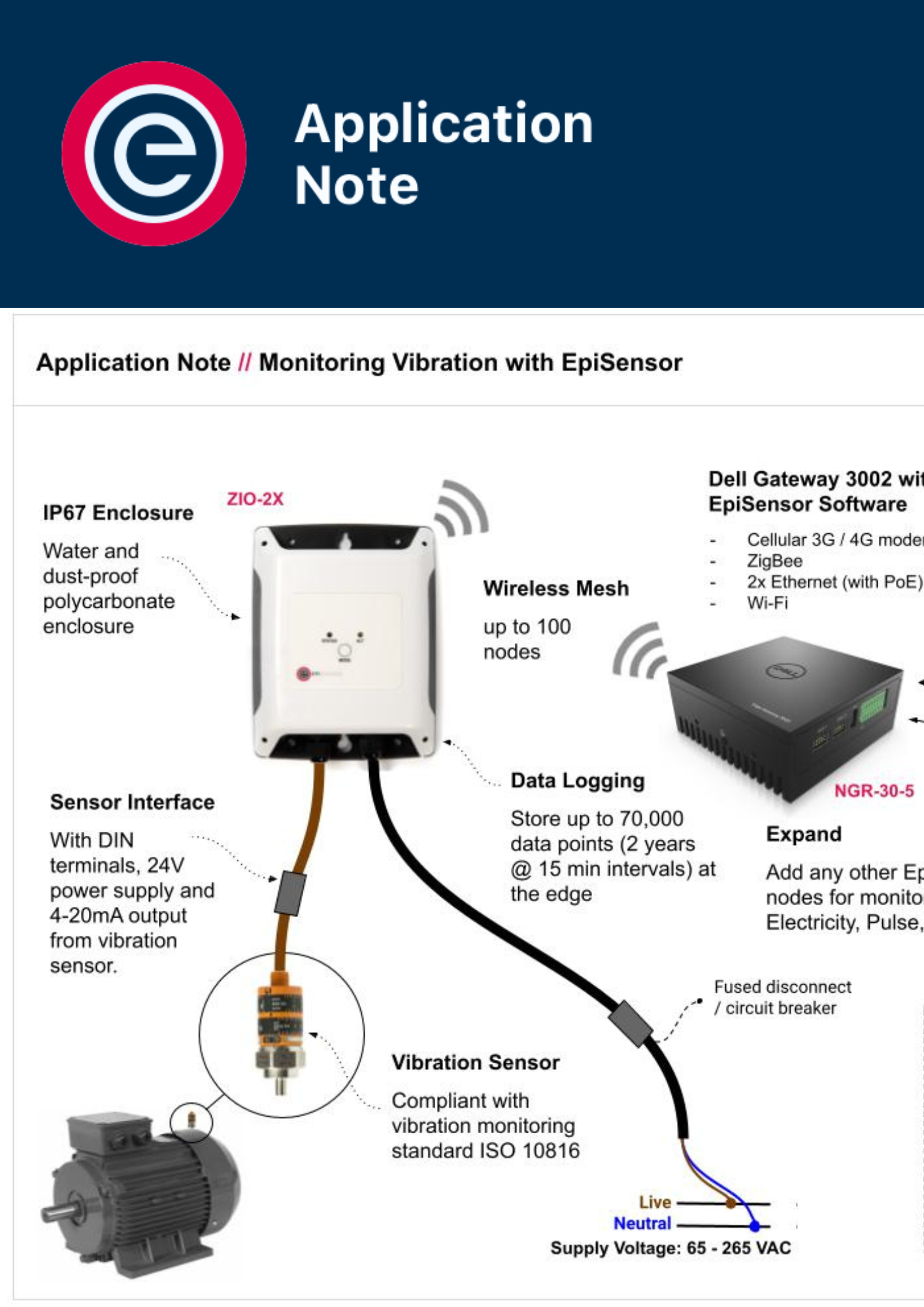 | Monitoring Vibration with EpiSensor ZIO Application Note | EpiSensor’s analogue signal sensor (ZIO) is a rugged, mains-powered sensor used to monitor flow rates, pressure levels, pH or any other energy related output which uses the industry standard 4-20mA current loop. The data is recorded and transferred securely over a wireless mesh network to a central EpiSensor Gateway where it can be exported to a variety of 3rd party systems for storage, visualisation and analysis to improve energy efficiency and reduce cost. | Application Notes | EPI-062-00 | application-notes | zio | ||
 | NGR-30-3 Java Versions Application Note | This application note describes the compatibility issues surrounding Java versions in the EpiSensor NGR-30-3 product. In general, Java Virtual Machines are backwards compatible with Java source code compiled with an earlier version of Java but are not forwards compatible. | Application Notes | EPI-067-00 | application-notes | ngr | ||
 | Phase and Frequency Analysis on ZDR Application Note | EpiSensor’s Demand Response Controller is an all-in-one solution for large-scale Demand Side Response programs. Built on EpiSensor’s hardened Industrial IoT platform, it meets the highest standards of accuracy, reliability and security, with a consumer-class user experience that’s easy to install, configure and maintain. This Application Note describes how to use the Frequency Analysis settings to analyse and correct potential installation errors with a ZDR. | Application Notes | EPI-180-00 | application-notes | zdr | demand-response | |
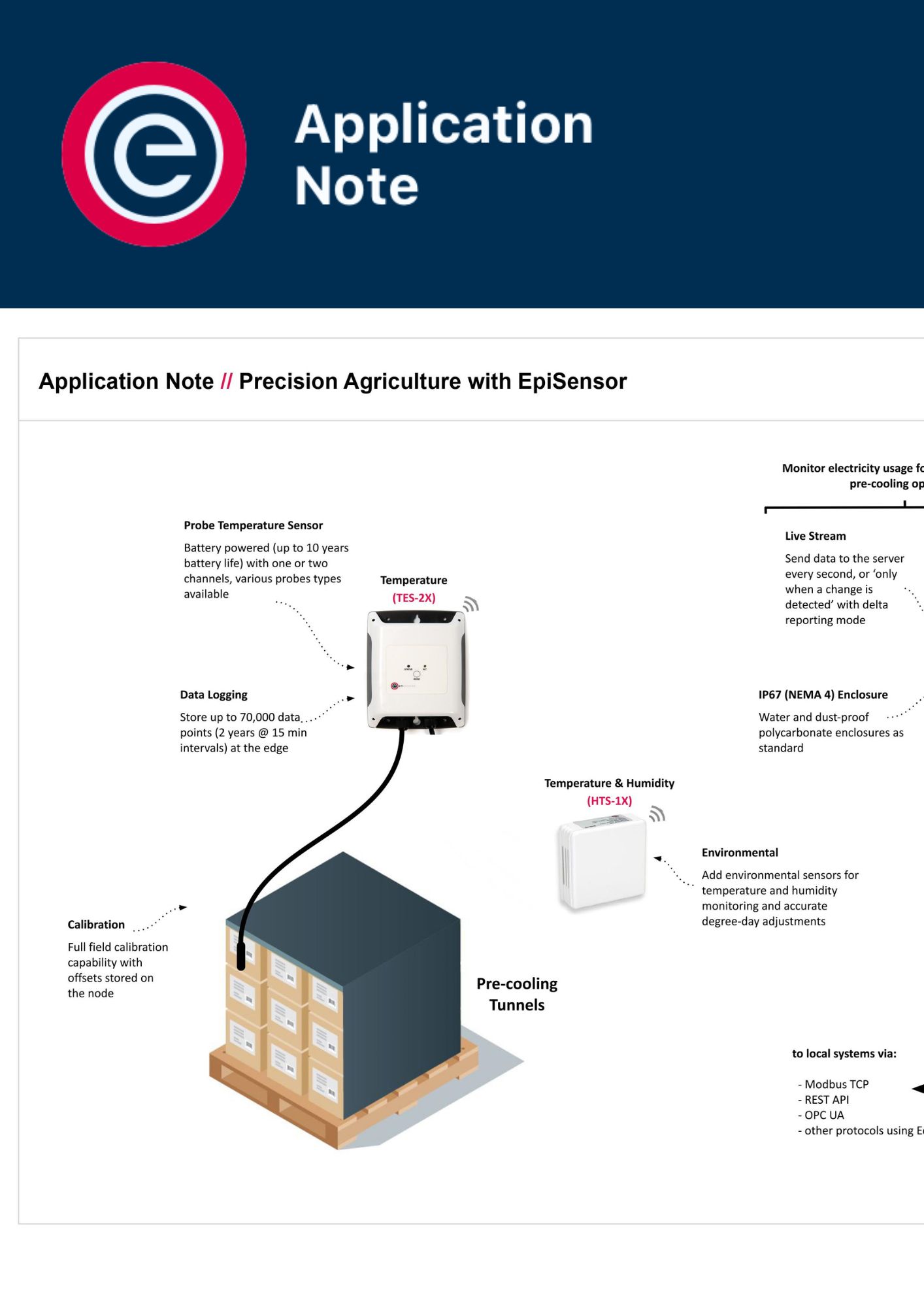 | Precision Agriculture with EpiSensor Application Note | This diagram details the precision agriculture possible with EpiSensor. This system diagram gives a high level view of the integration of EpiSensor Gateway software and devices with IoT software apps over cloud networks to assist with Temperature Monitoring and Energy Management | Application Notes | EPI-150-00 | application-notes | hts ngr tes zem zgw | energy-management environmental-monitoring | |
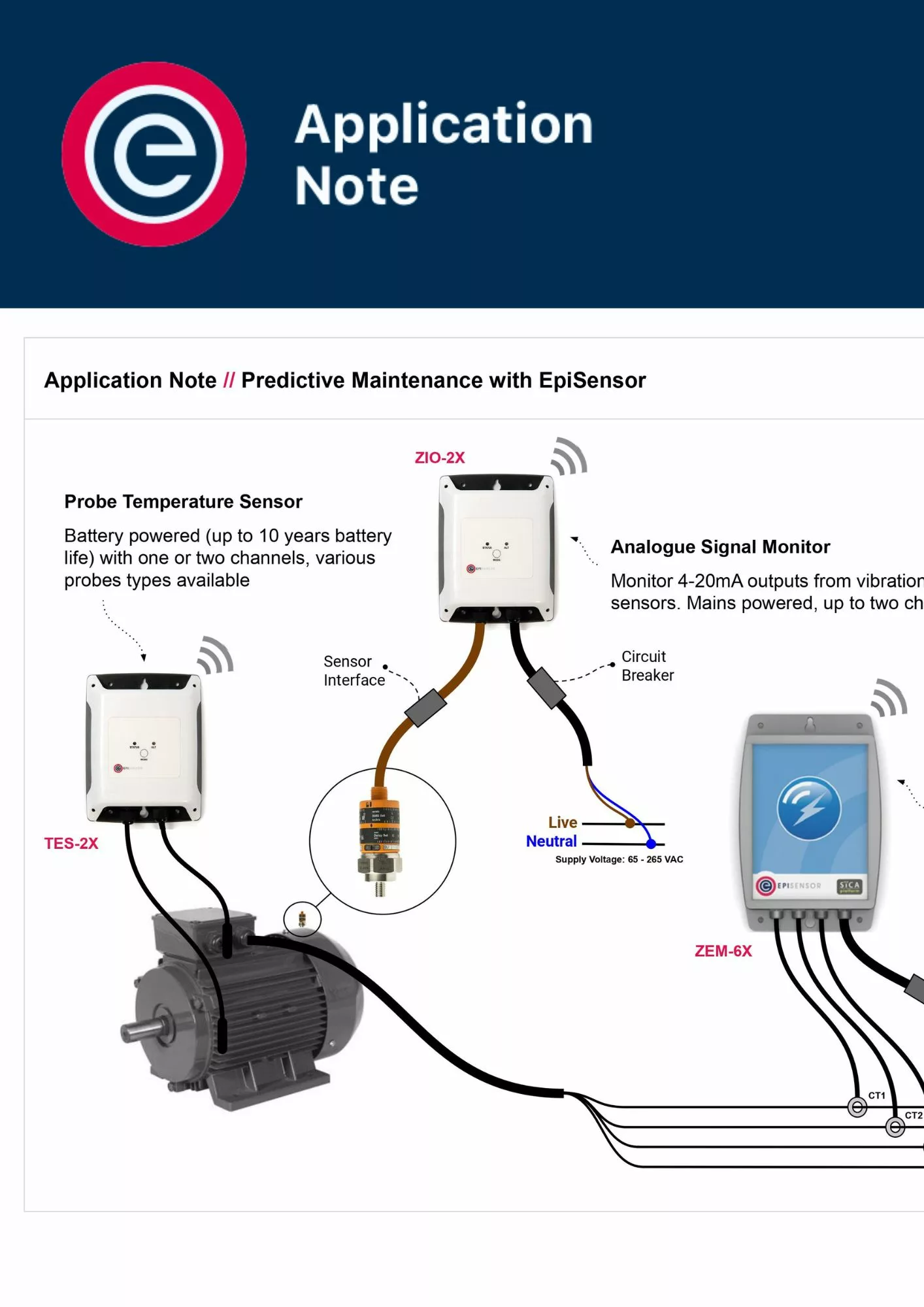 | Predictive Maintenance with EpiSensor Application Note | This system diagram details the predictive maintenance possible with EpiSensor. It gives a high level view of the integration of EpiSensor Gateway software and devices with IoT software apps over cloud networks. | Application Notes | EPI-060-00 | application-notes | ngr tes zem zgw zio | energy-management environmental-monitoring | |
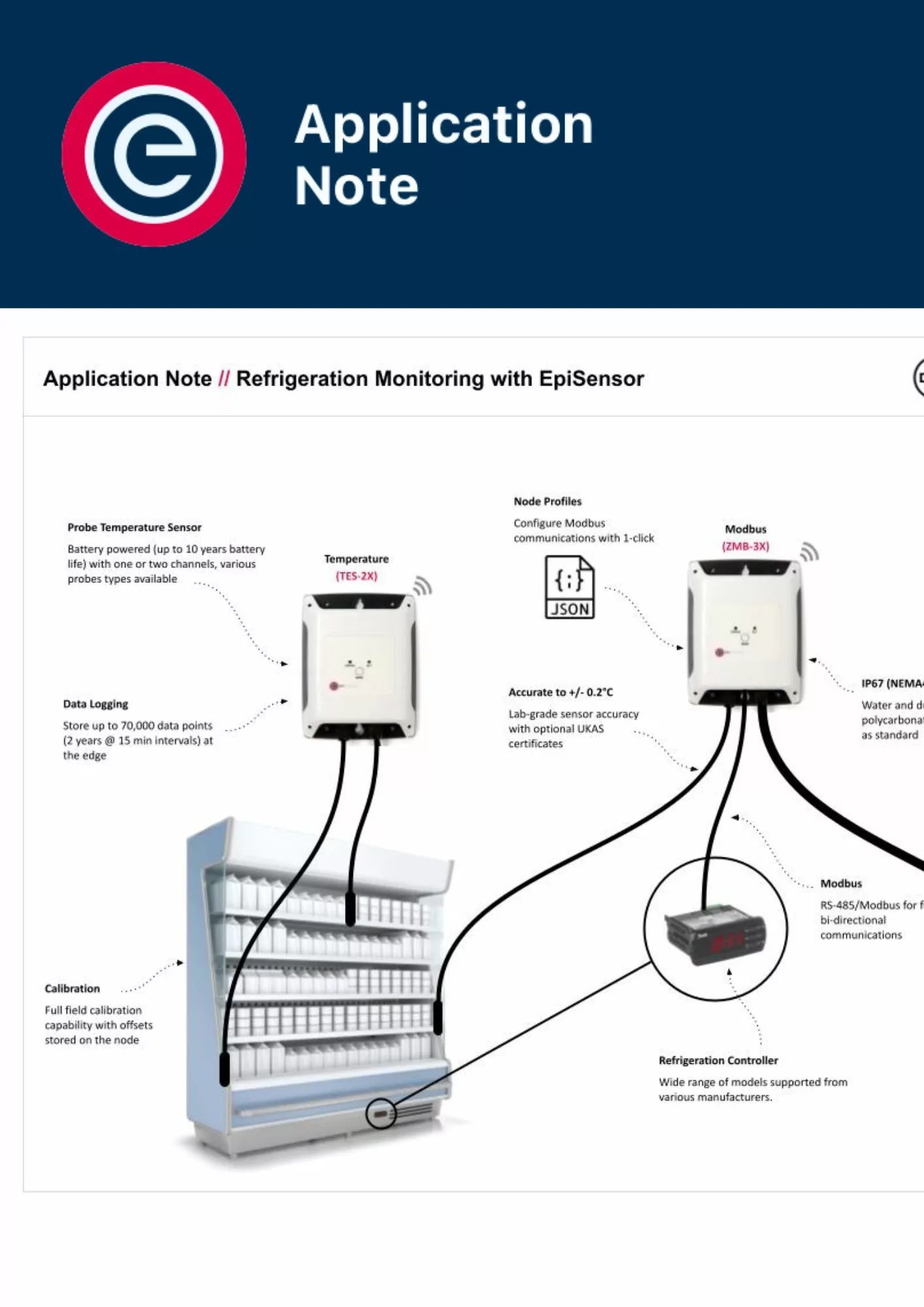 | Refrigeration Monitoring with EpiSensor Application Note | This system diagram details the refrigeration monitoring possible with EpiSensor. | Application Notes | EPI-061-00 | application-notes | tes | environmental-monitoring | |
 | Reloading Calibration Registers on ZDR-16 Application Note | EpiSensor’s Demand Response Controller is an all-in-one solution for large-scale Demand Side Response programs. Built on EpiSensor’s hardened Industrial IoT platform, it meets the highest standards of accuracy, reliability and security, with a consumer-class user experience that’s easy to install, configure and maintain. | Application Notes | EPI-182-00 | application-notes | zdr | demand-response | |
 | Security Considerations for EpiSensor Gateways, Application Note | This document describes a range of procedures and settings for the EpiSensor Gateway that can be used to increase security when deploying EpiSensor systems in critical environments. This is not intended to be a comprehensive guide to Linux systems administration, but rather covers security considerations for EpiSensor’s application software and its communications requirements. | Application Notes | EPI-210-01 | application-notes | ngr zgw | demand-response energy-management environmental-monitoring | |
 | Setting a Static IP Address on client devices | This document outlines the process for setting a fixed IP Address on a client device to directly connect to an EpiSensor Gateway | User Guides | EPI-260-00 | user-guides | zgw | ||
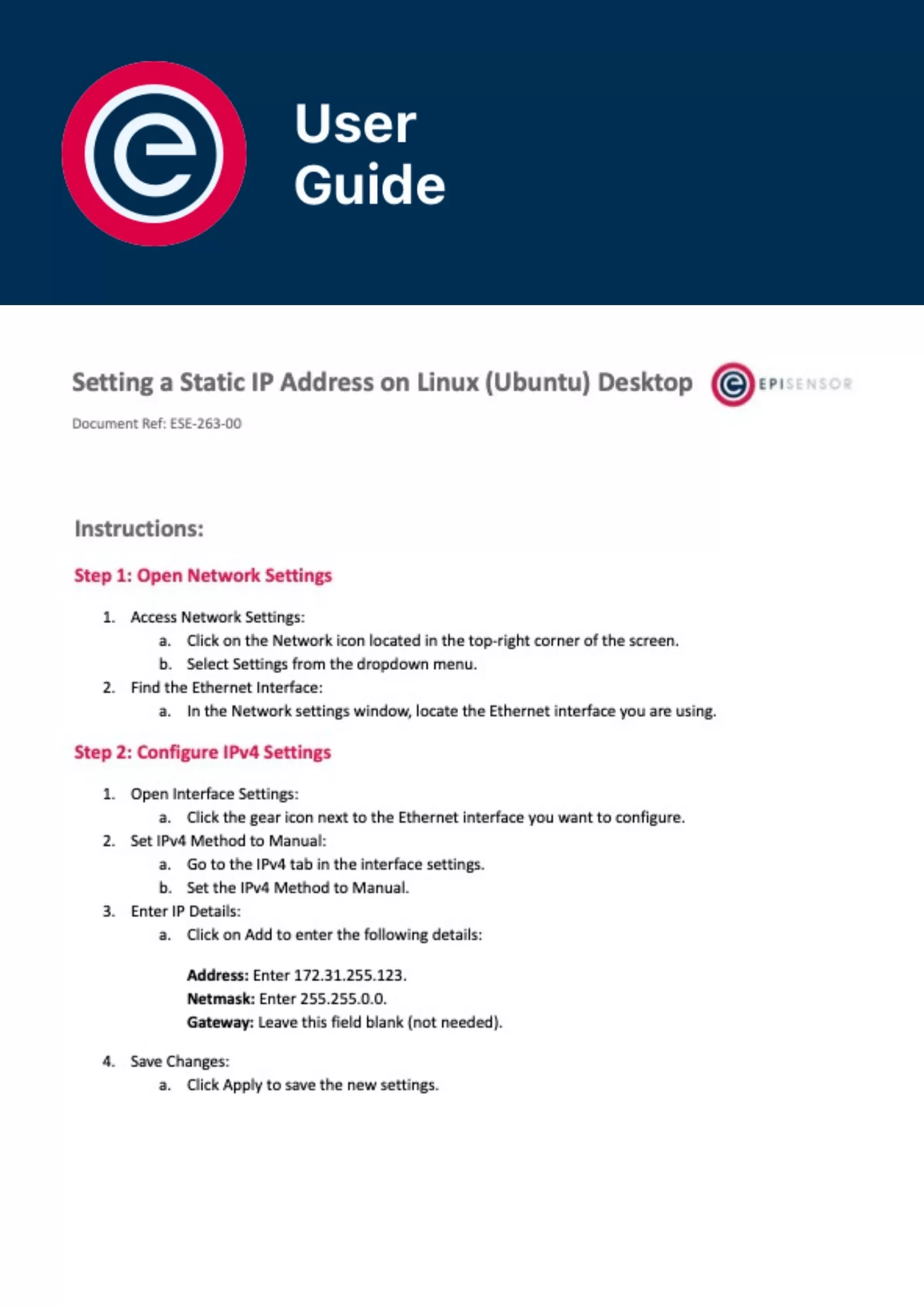 | Setting a Static IP Address on Linux (Ubuntu) Desktop | This document outlines the process for setting a static (fixed) IP Address on a Linux (Ubuntu) Desktop client device to directly connect to an EpiSensor Gateway | User Guides | EPI-263-00 | user-guides | zgw | ||
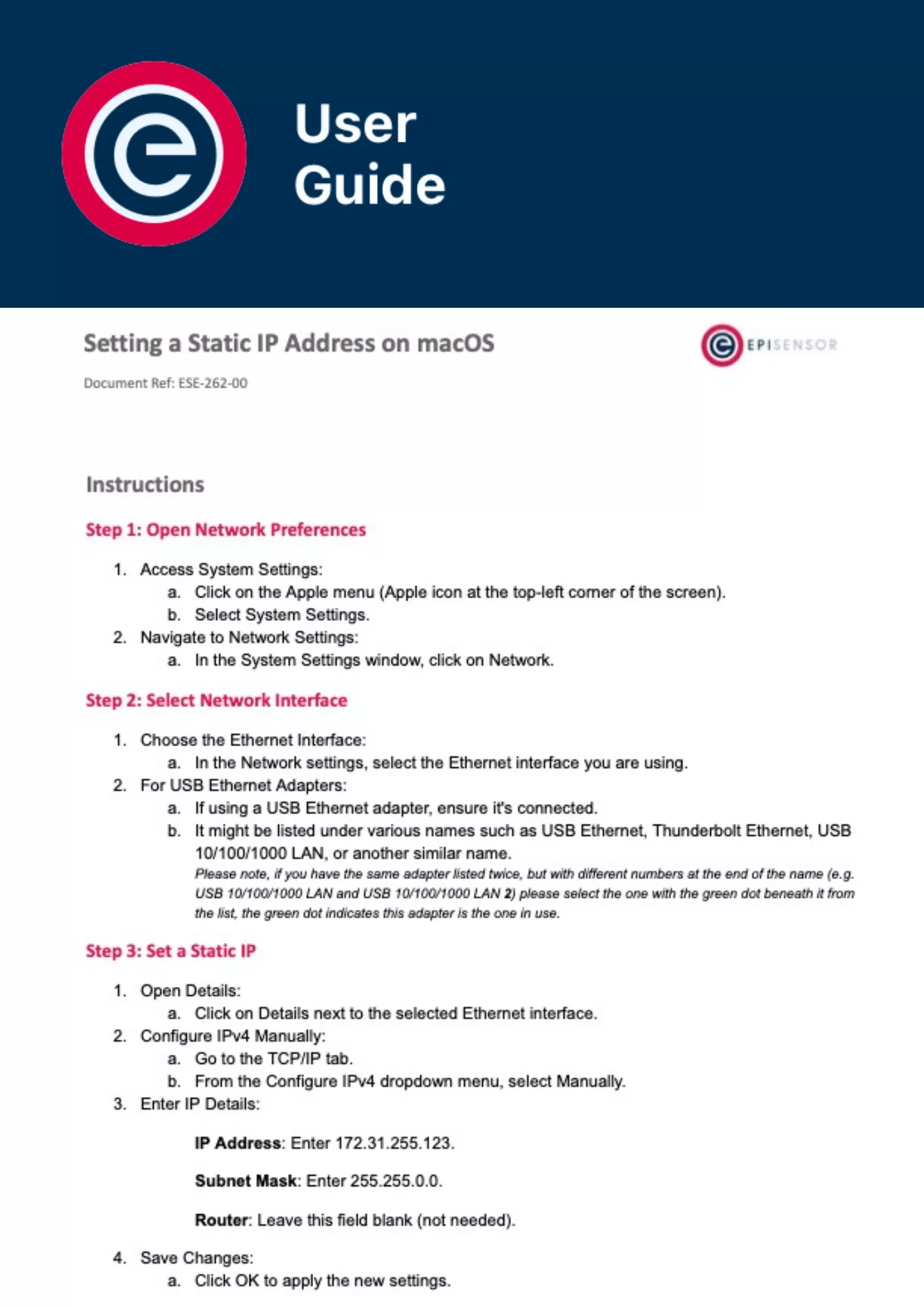 | Setting a Static IP Address on macOS | This document outlines the process for setting a static (fixed) IP Address on a macOS client device to directly connect to an EpiSensor Gateway | User Guides | EPI-262-00 | user-guides | zgw | ||
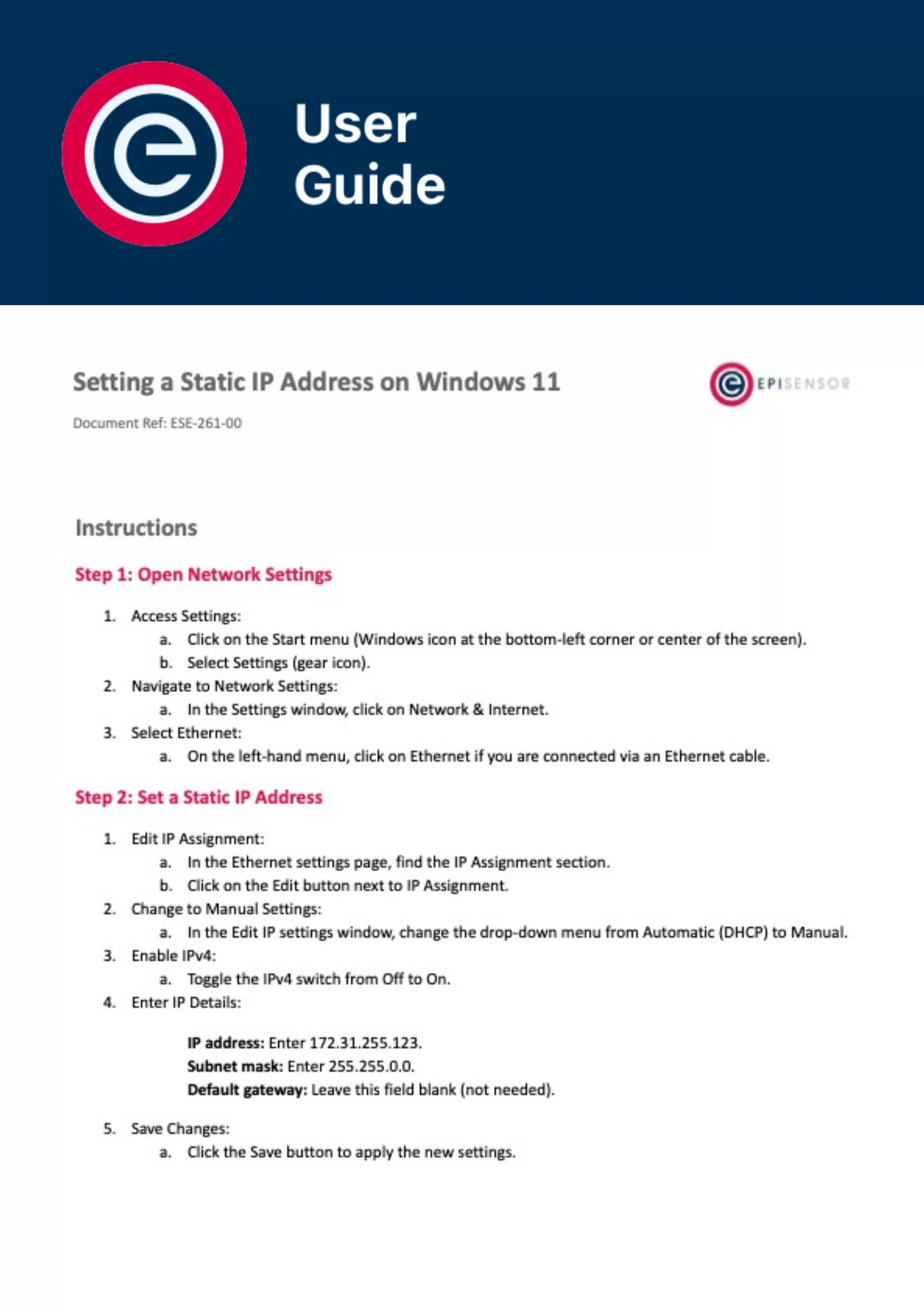 | Setting a Static IP Address on Windows 11 | This document outlines the process for setting a static (fixed) IP Address on a Windows 11 client device to directly connect to an EpiSensor Gateway | User Guides | EPI-261-00 | user-guides | zgw | ||
 | Software Injection Testing on ZDR Application Note | This application note details the way EpiSensor’s ZDR supports software injection testing to simulate a frequency event so a site or asset’s reaction and performance can be monitored without the need for external hardware. | Application Notes | EPI-163-00 | application-notes | zdr | demand-response | |
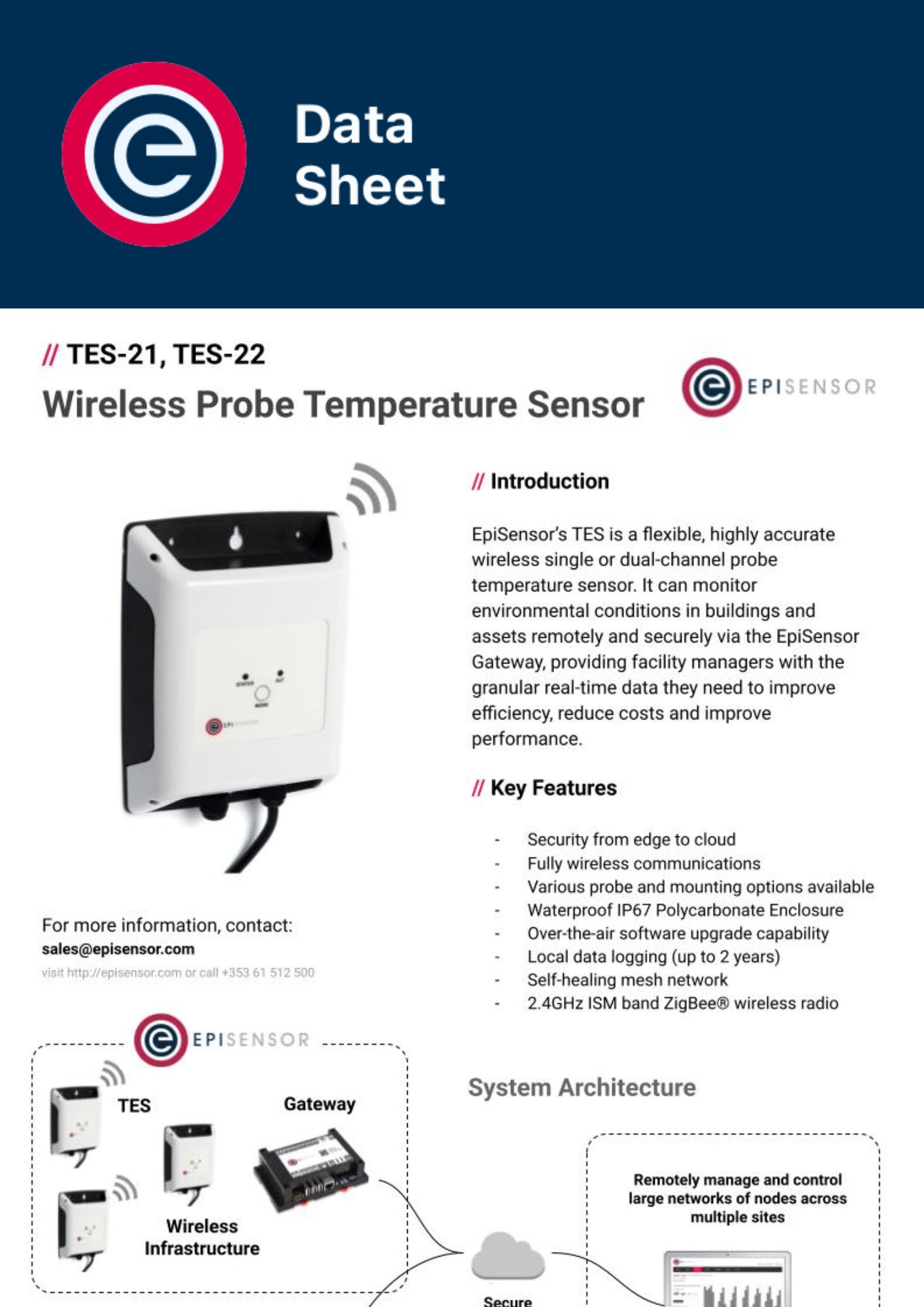 | Temperature Sensor (TES-2X) Datasheet | EpiSensor’s TES is a flexible, highly accurate wireless single or dual-channel probe temperature sensor. It can monitor environmental conditions in buildings and assets remotely and securely via the EpiSensor Gateway, providing facility managers with the granular real-time data they need to improve efficiency, reduce costs and improve performance. | Datasheets | EPI-196-00 | datasheets | tes | environmental-monitoring | |
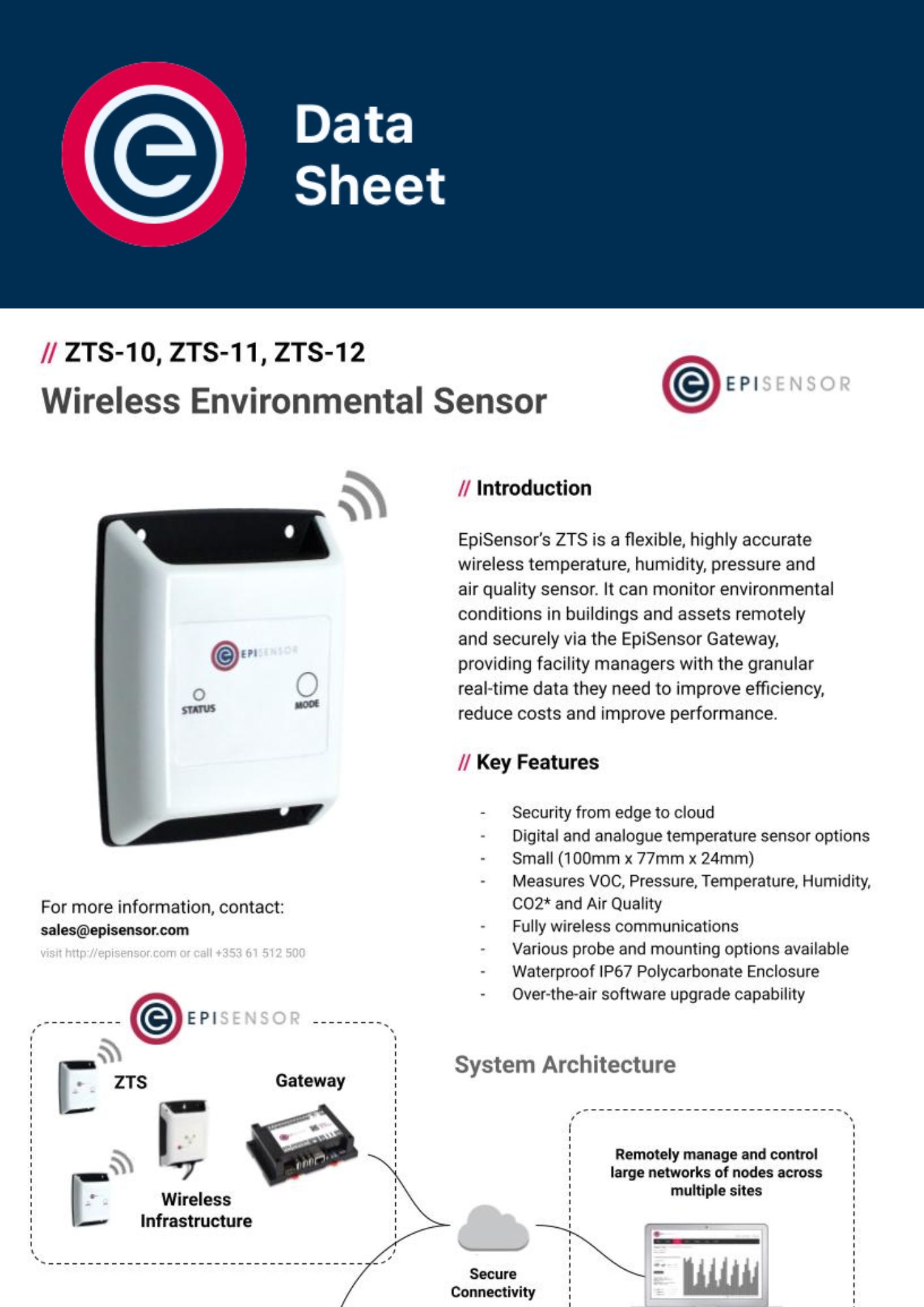 | Temperature, Humidity, Pressure and Air Quality Sensor (ZTS-1X) Datasheet | EpiSensor’s ZTS is a flexible, highly accurate wireless temperature, humidity, pressure and air quality sensor. It can monitor environmental conditions in buildings and assets remotely and securely via the EpiSensor Gateway, providing facility managers with the granular real-time data they need to improve efficiency, reduce costs and improve performance. | Datasheets | EPI-170-00 | datasheets | zts | environmental-monitoring | |
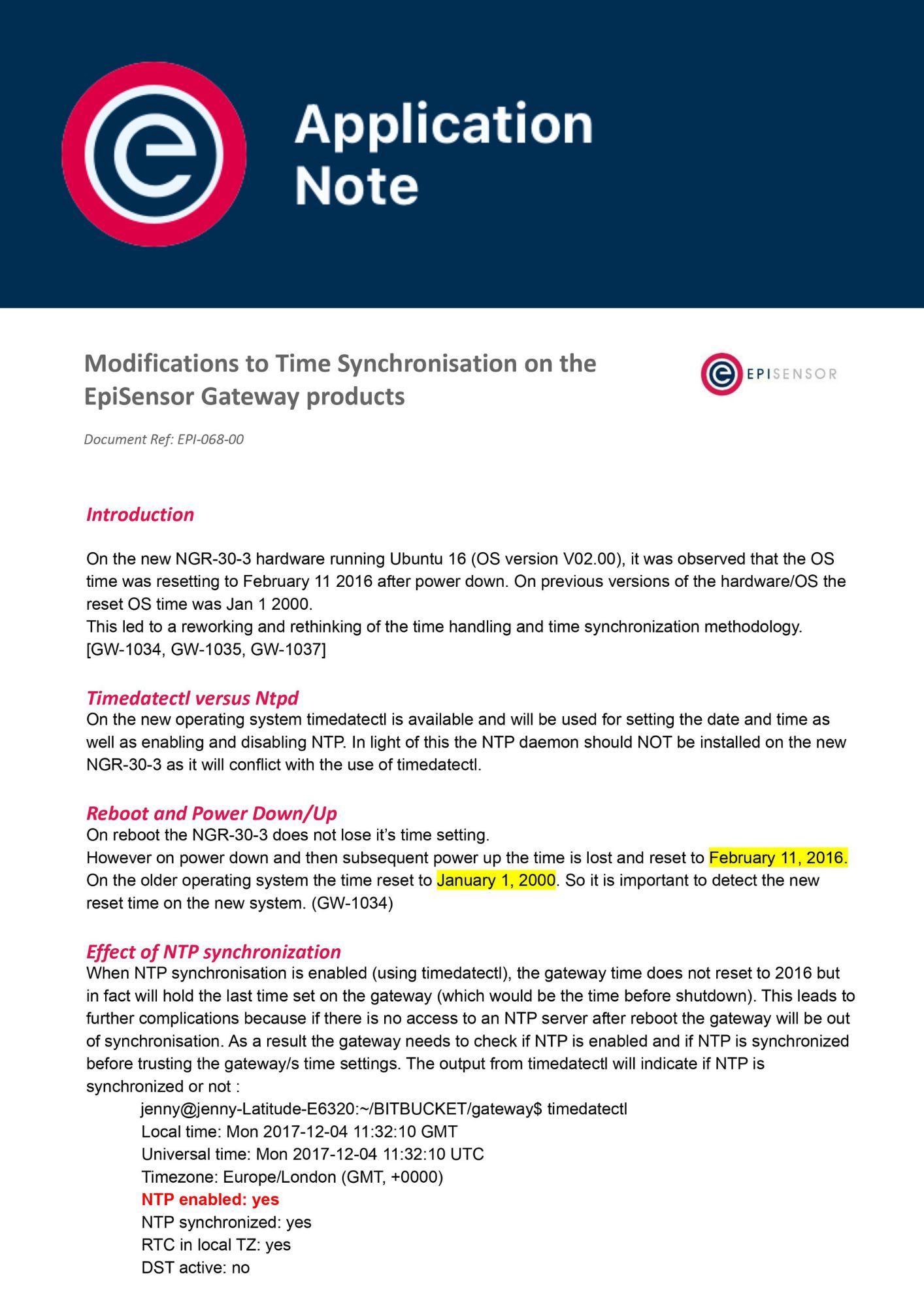 | Time Synchronisation on the Gateway (NGR) Application Note | On the new NGR-30-3 hardware running Ubuntu 16 (OS version V02.00), it was observed that the OS time was resetting to February 11 2016 after power down. On previous versions of the hardware/OS the reset OS time was Jan 1 2000. | Application Notes | EPI-068-00 | application-notes | ngr | energy-management environmental-monitoring | |
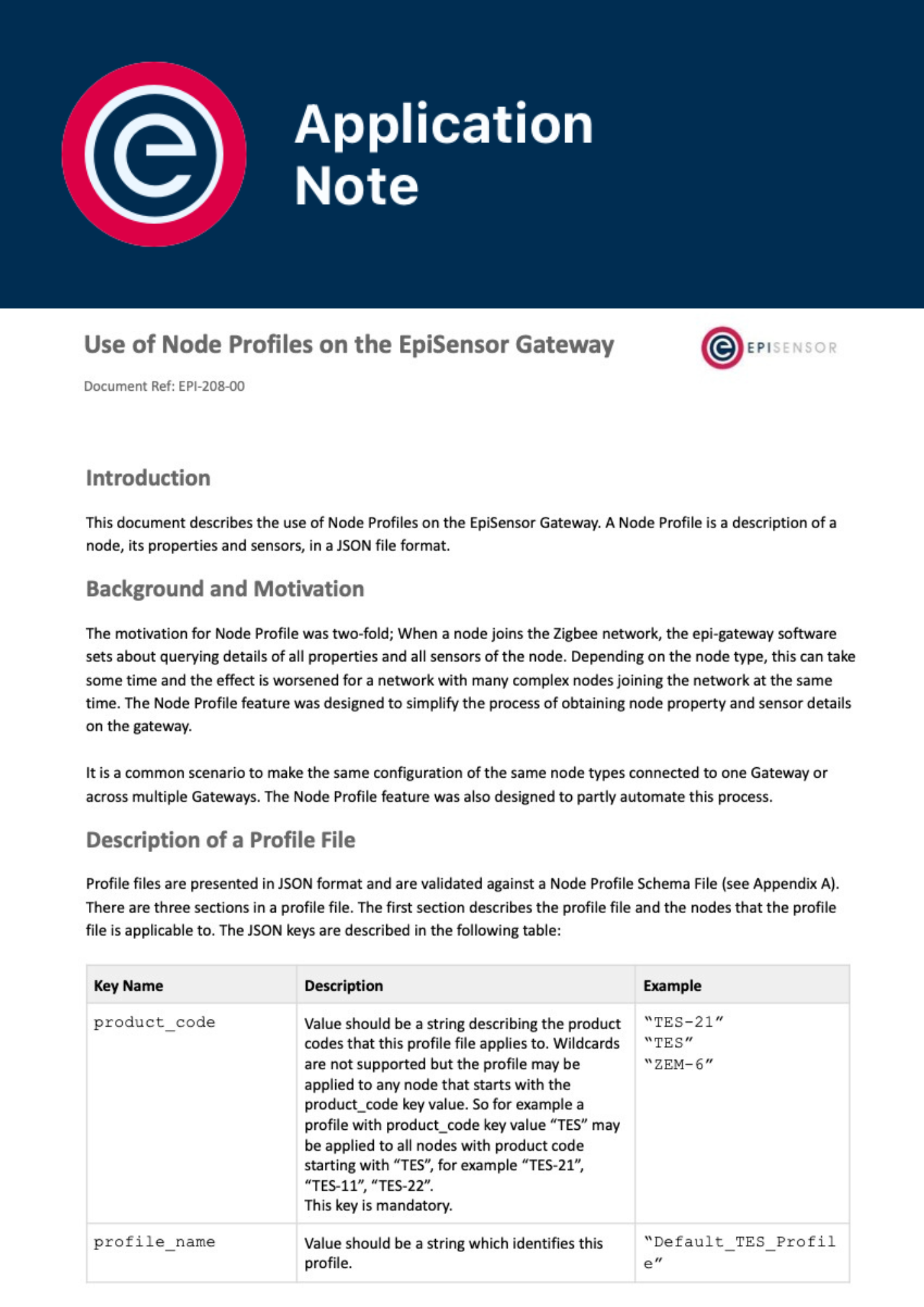 | Use of Node Profiles on the EpiSensor Gateway Application Note | This document describes the use of Node Profiles on the EpiSensor Gateway. A Node Profile is a description of a node, its properties and sensors, in a JSON file format. | Application Notes | EPI-208-00 | application-notes | ngr zgw | demand-response energy-management environmental-monitoring | |
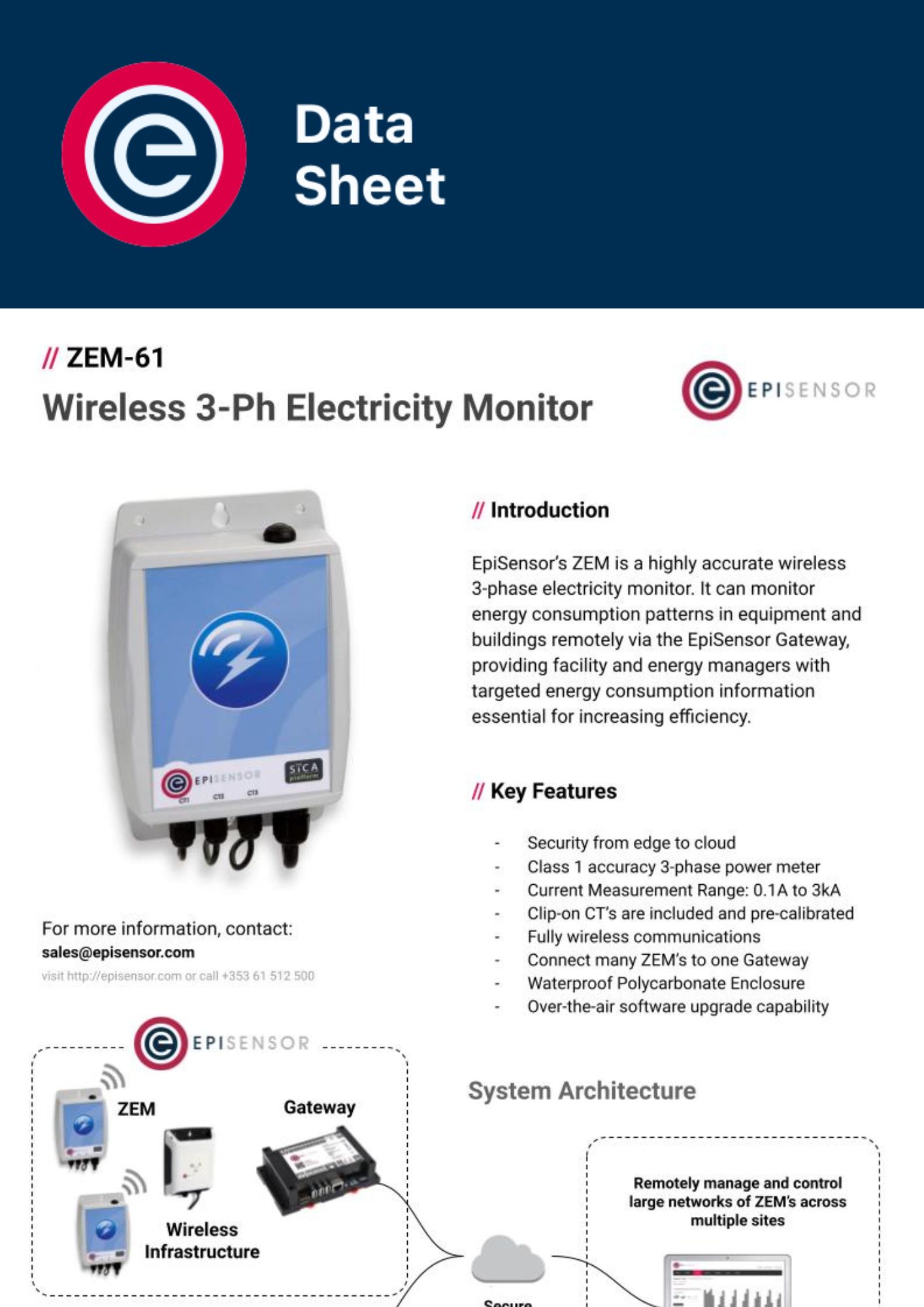 | Wireless 3-Phase Electricity Monitor (ZEM-61) Datasheet – Discontinued | EpiSensor’s ZEM is a highly accurate wireless 3-phase electricity monitor. It can monitor energy consumption patterns in equipment and buildings remotely via the EpiSensor Gateway, providing facility and energy managers with targeted energy consumption information essential for increasing efficiency. | Datasheets | EPI-122-00 | datasheets | zem | energy-management | |
 | Wireless 3-Phase Electricity Monitor (ZEM-61) Install Sheet – Discontinued | EpiSensor’s ZEM is a highly accurate wireless 3 phase electricity monitor. It can monitor energy consumption patterns in equipment and buildings remotely via the EpiSensor Gateway, providing facility and energy managers with targeted energy consumption information essential for increasing efficiency. This document shows the installation of the Wireless 3-Phase Electricity Monitor ZEM-61. | Install Sheets | EPI-096-00 | install-sheets | zem | energy-management | |
 | Wireless 3-Phase Electricity Monitor (ZEM-62) Install Sheet – Discontinued | EpiSensor’s ZEM is a highly accurate wireless 3-phase electricity monitor. It can monitor energy consumption patterns in equipment and buildings remotely via the EpiSensor Gateway, providing facility and energy managers with targeted energy consumption information essential for increasing efficiency. | Install Sheets | EPI-097-00 | install-sheets | zem | energy-management | |
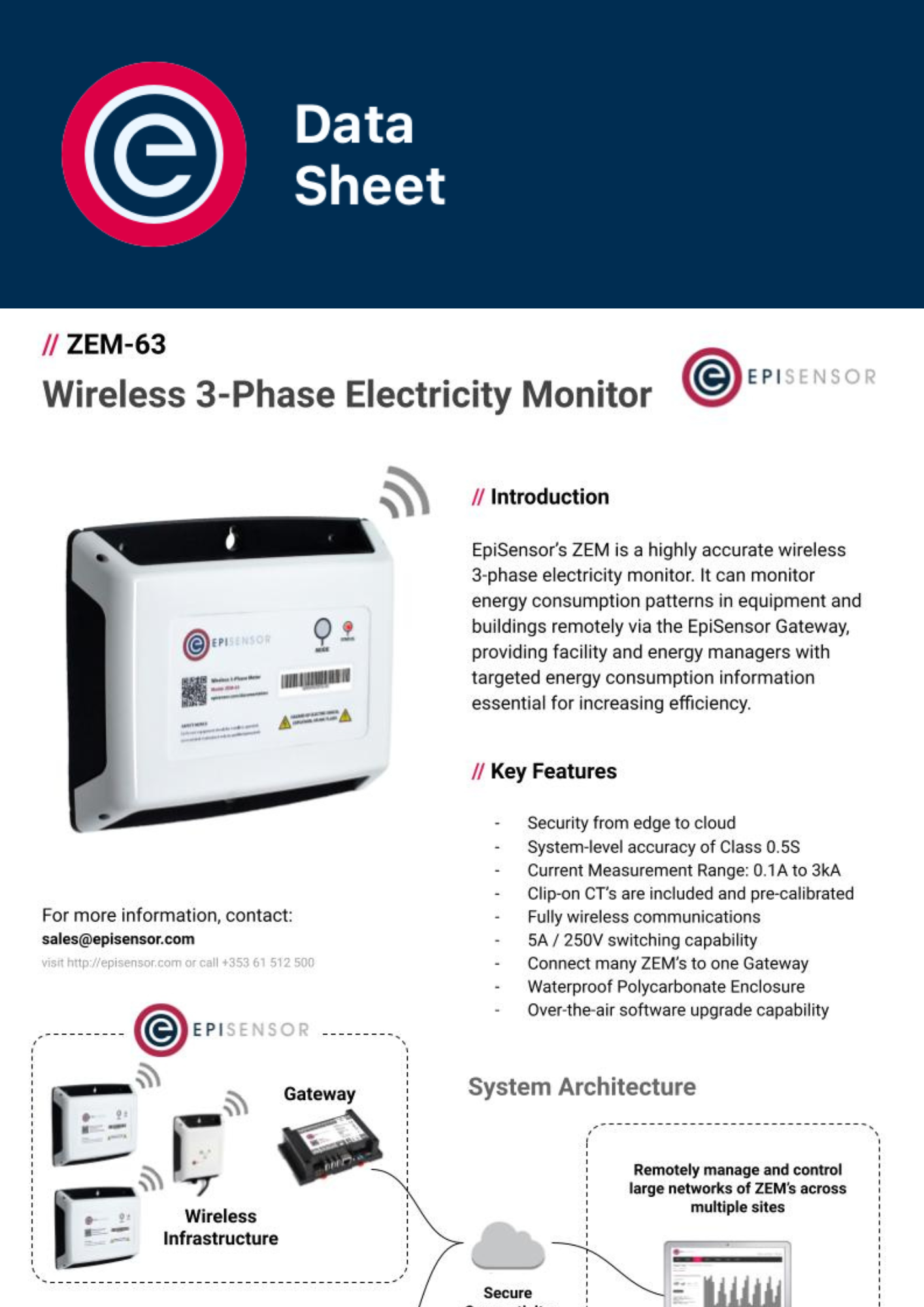 | Wireless 3-Phase Electricity Monitor (ZEM-63) Datasheet | EpiSensor’s ZEM is a highly accurate wireless 3-phase electricity monitor. It can monitor energy consumption patterns in equipment and buildings remotely via the EpiSensor Gateway, providing facility and energy managers with targeted energy consumption information essential for increasing efficiency. | Datasheets | EPI-221-00 | datasheets | zem | energy-management | |
 | Wireless 3-Phase Electricity Monitor (ZEM-63) Install Sheet | EpiSensor’s ZEM is a highly accurate wireless 3-phase electricity monitor. It can monitor energy consumption patterns in equipment and buildings remotely via the EpiSensor Gateway, providing facility and energy managers with targeted energy consumption information essential for increasing efficiency. | Install Sheets | EPI-222-00 | install-sheets | zem | energy-management | |
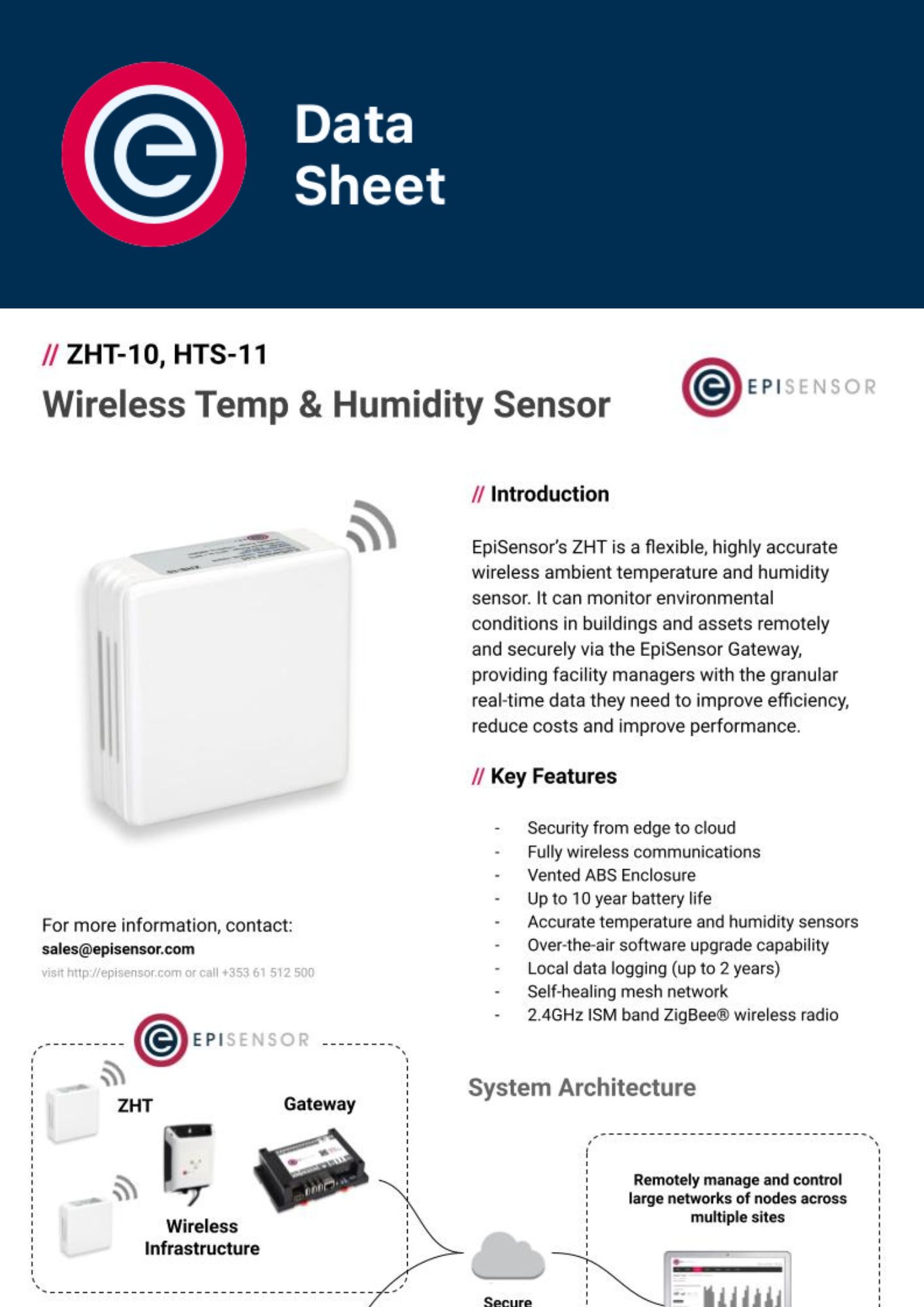 | Wireless Ambient Temperature and Humidity Sensor (ZHT-1X) Datasheet | EpiSensor’s ZHT is a flexible, highly accurate wireless ambient temperature and humidity sensor. It can monitor environmental conditions in buildings and assets remotely and securely via the EpiSensor Gateway, providing facility managers with the granular real-time data they need to improve efficiency, reduce costs and improve performance. | Datasheets | EPI-201-00 | datasheets | zht | environmental-monitoring | |
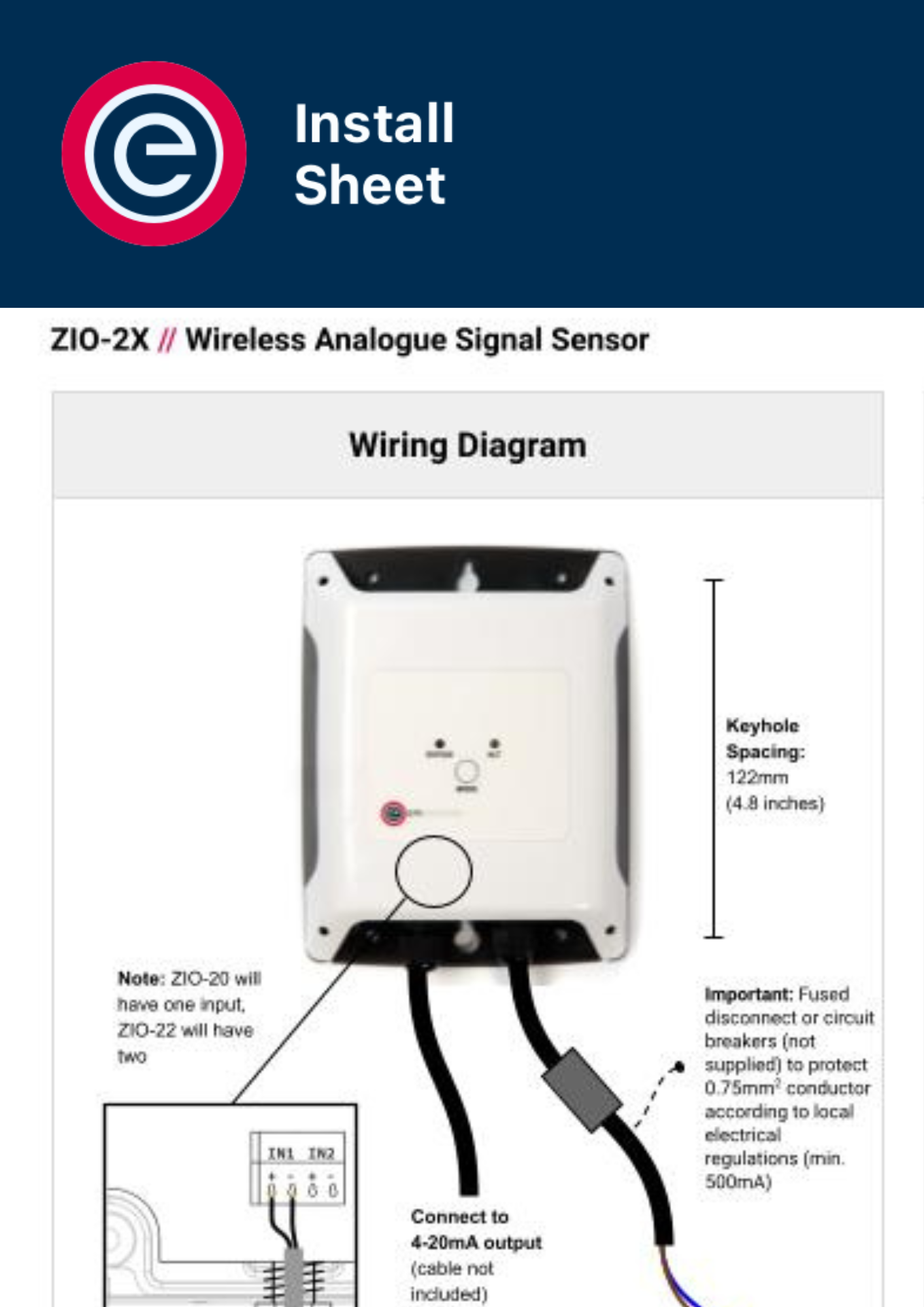 | Wireless Analogue Signal Sensor (ZIO-2x) Install Sheet | EpiSensor’s analogue signal sensor (ZIO) is a rugged, mains-powered sensor used to monitor flow rates, pressure levels, pH or any other energy related output which uses the industry standard 4-20mA current loop or 0-10V signal. | Install Sheets | EPI-091-00 | install-sheets | zio | energy-management | |
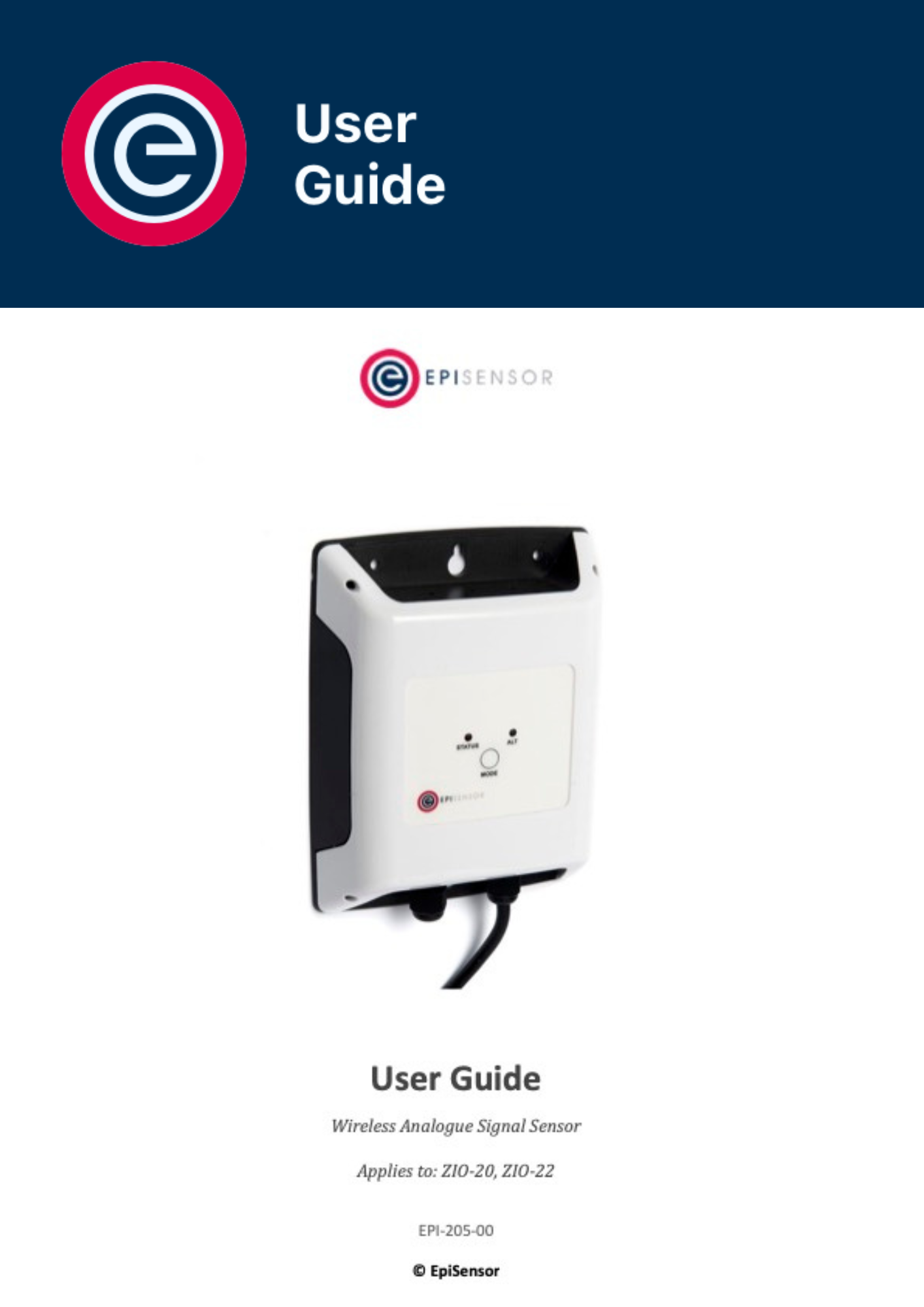 | Wireless Analogue Signal Sensor (ZIO) User Guide | User Guide for EpiSensor’s Wireless Analogue Signal Sensor (ZIO) which can monitor analogue 4-20mA current outputs from 3rd party sensors/devices. These sensors can measure a variety of real world conditions such as wind speed or direction, weights, volumes and depths. The ZIO reports the data through the wireless sensor network to the Gateway. | User Guides | EPI-205-00 | user-guides | zio | demand-response energy-management environmental-monitoring | |
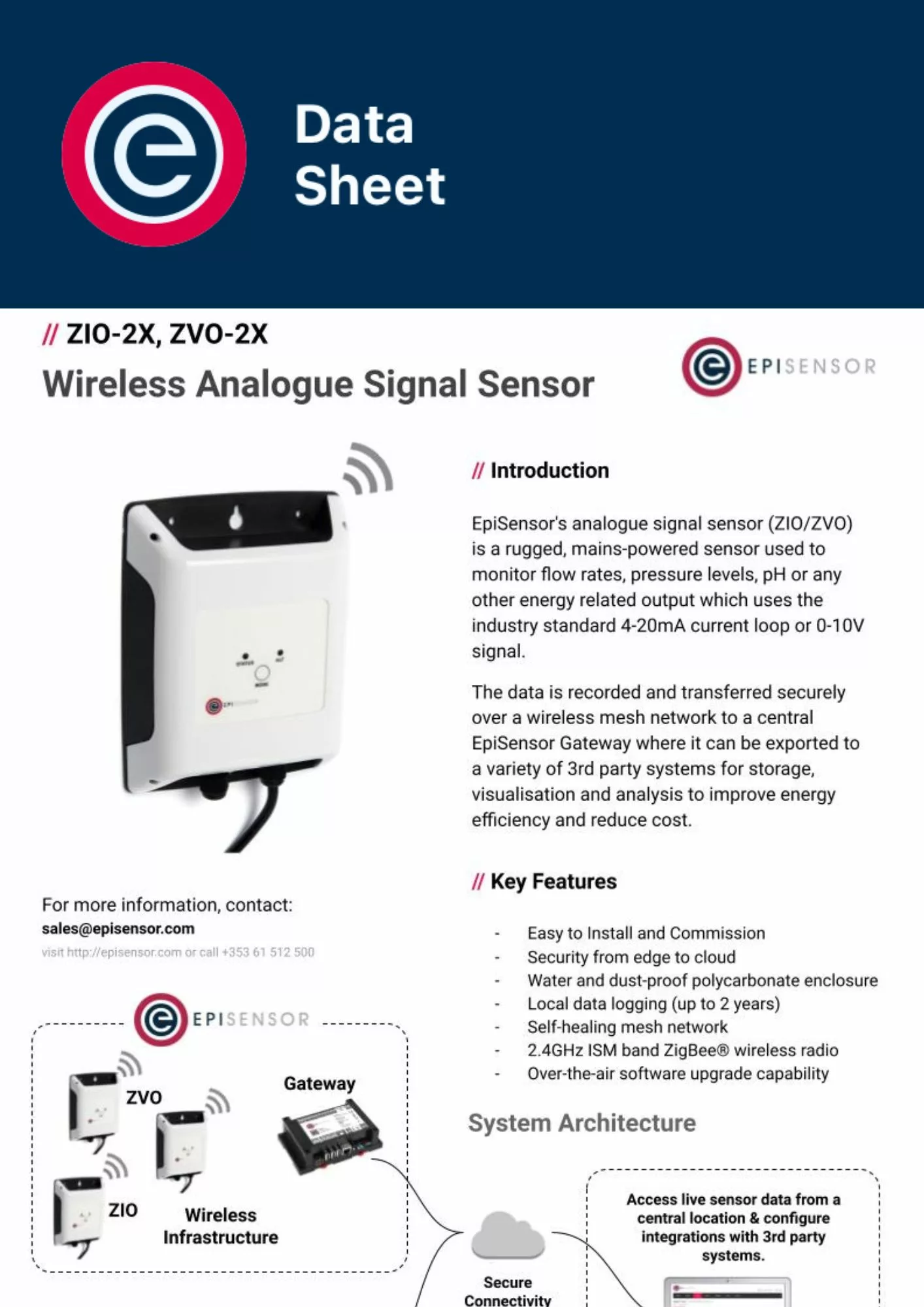 | Wireless Analogue Signal Sensor (ZIO/ZVO) Datasheet | EpiSensor’s analogue signal sensor (ZIO/ZVO) is a rugged, mains-powered sensor used to monitor flow rates, … | Datasheets | EPI-231-00 | datasheets | zio zvo | energy-management | |
 | Wireless Analogue Signal Sensor (ZVO-2x) Install Sheet | EpiSensor’s analogue signal sensor (ZVO) is a rugged, mains-powered sensor used to monitor flow rates, pressure levels, pH or any other energy related output which uses the industry standard 0-10V signal. | Install Sheets | EPI-089-00 | install-sheets | zvo | energy-management | |
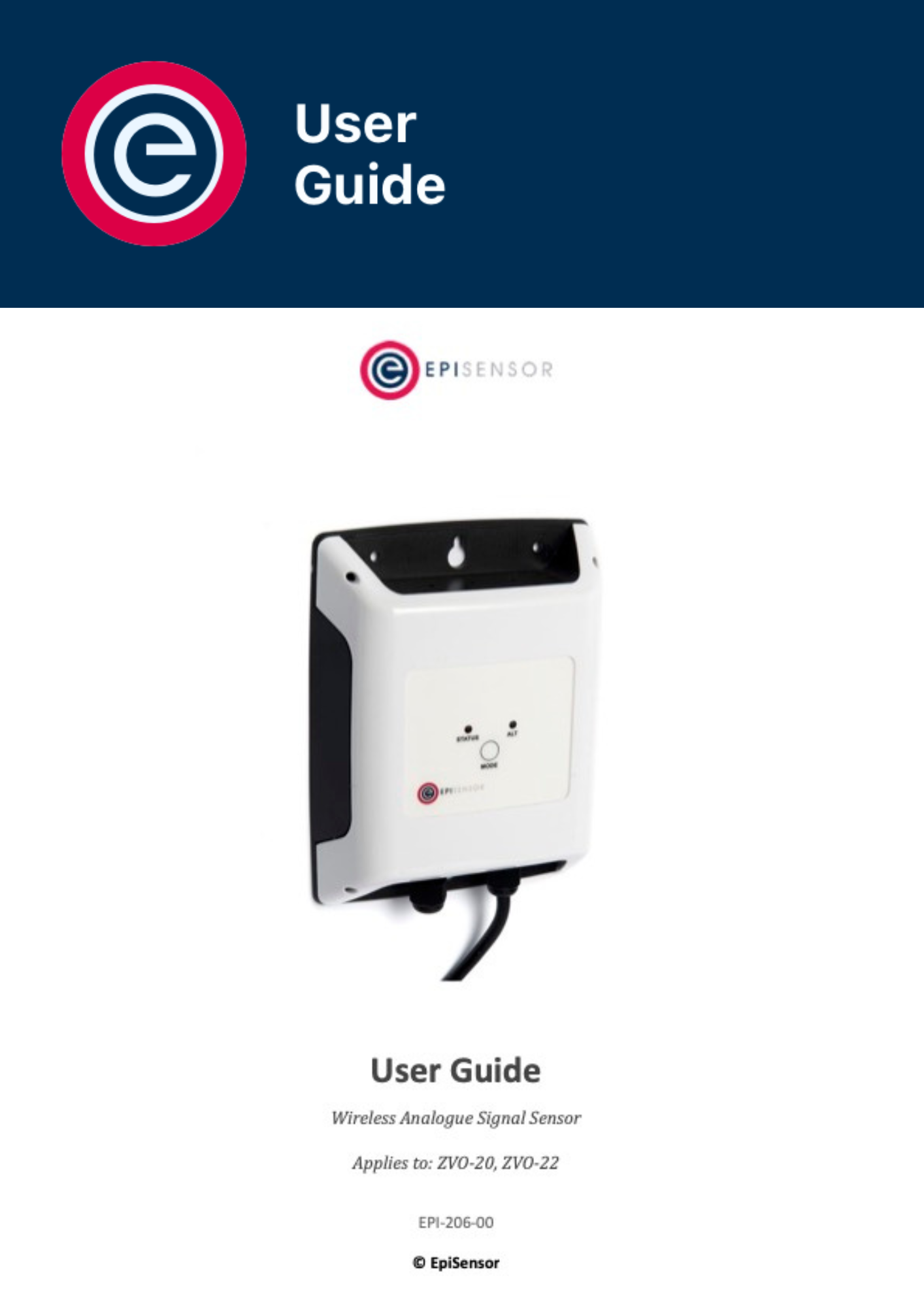 | Wireless Analogue Signal Sensor (ZVO-2X) User Guide | EpiSensor’s ZVO 0-10 Volt Sensor is intended to detect the voltage across a pair of wires from a 0-10 Volt transducer. These transducers can measure a variety of real world conditions such as wind speed or direction, weights, volumes and depths. The ZVO reports the data through the wireless sensor network to the Gateway. | User Guides | EPI-206-00 | user-guides | zvo | energy-management | |
 | Wireless Demand Response Controller (ZDR-1X) Install Sheet – Discontinued | This document details the installation of the Demand Response Controller ZDR-1X. EpiSensor’s Demand Response Controller is an all-in-one solution for large-scale Demand Side Response programs. Built on EpiSensor’s hardened Industrial IoT platform, it meets the highest standards of accuracy, reliability and security, with a consumer-class user experience that’s easy to install, configure and maintain. | Install Sheets | EPI-065-02 | install-sheets | zdr | demand-response | |
 | Wireless Demand Response Controller (ZDR-1X) User Guide – Discontinued | EpiSensor’s ZDR enables customers to participate in multiple Demand and Frequency response programs. It includes best-in-class functionality to accurately monitor electrical load (via CT’s or pulse inputs), frequency and can take action to shed load or engage backup generators based on frequency set points or commands sent from a remote network operations centre. | User Guides | EPI-078-03 | user-guides | zdr | demand-response | |
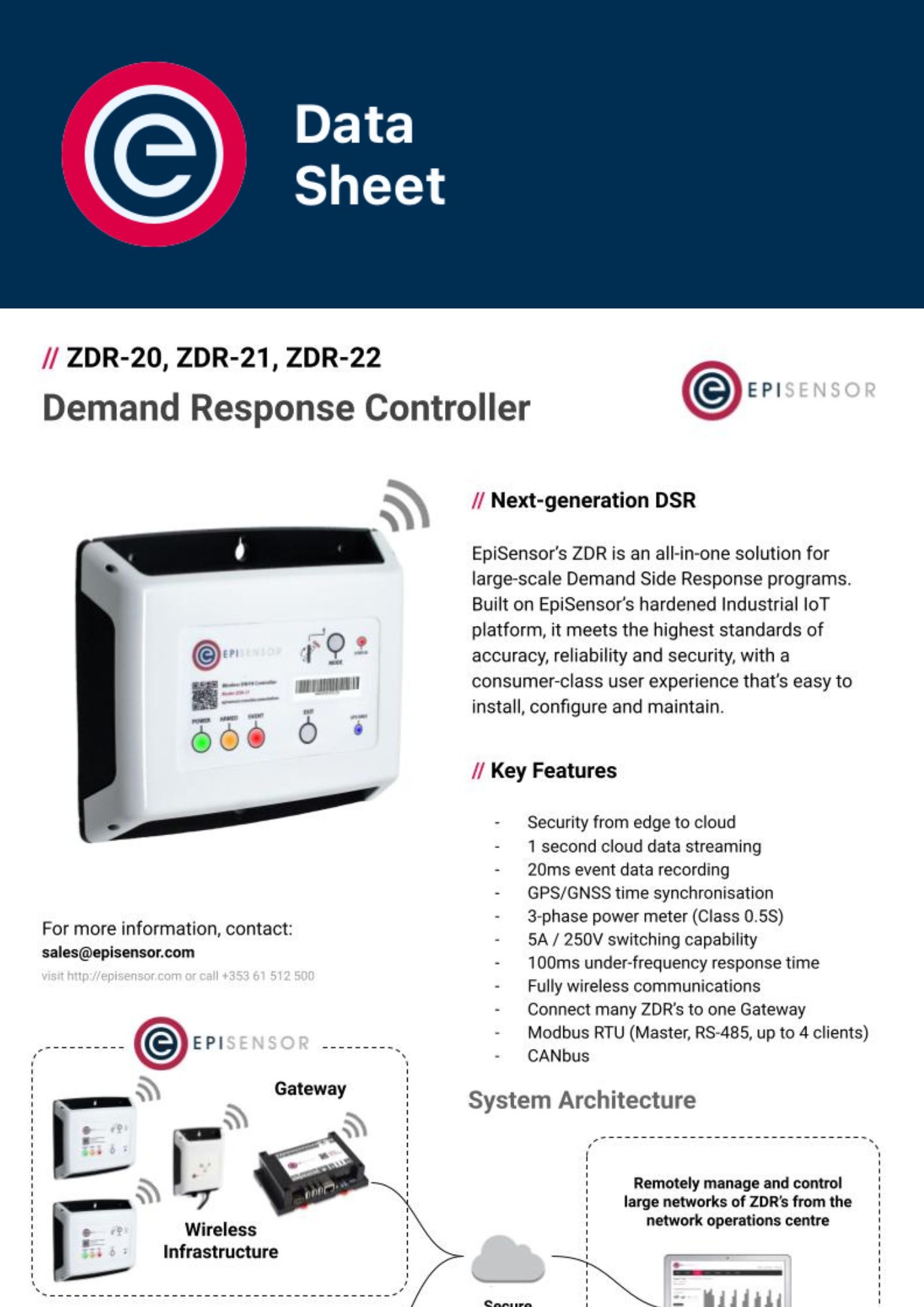 | Wireless Demand Response Controller (ZDR-2X) Datasheet | EpiSensor’s Demand Response Controller is an all-in-one solution for large-scale Demand Side Response programs. Built on EpiSensor’s hardened Industrial IoT platform, it meets the highest standards of accuracy, reliability and security, with a consumer-class user experience that’s easy to install, configure and maintain. | Datasheets | EPI-211-04 | datasheets | zdr | demand-response | |
 | Wireless Demand Response Controller (ZDR-2X) Install Sheet | This document details the installation of the Demand Response Controller ZDR-2X. EpiSensor’s Demand Response Controller is an all-in-one solution for large-scale Demand Side Response programs. Built on EpiSensor’s hardened Industrial IoT platform, it meets the highest standards of accuracy, reliability and security, with a consumer-class user experience that’s easy to install, configure and maintain. | Install Sheets | EPI-212-01 | install-sheets | zdr | demand-response | |
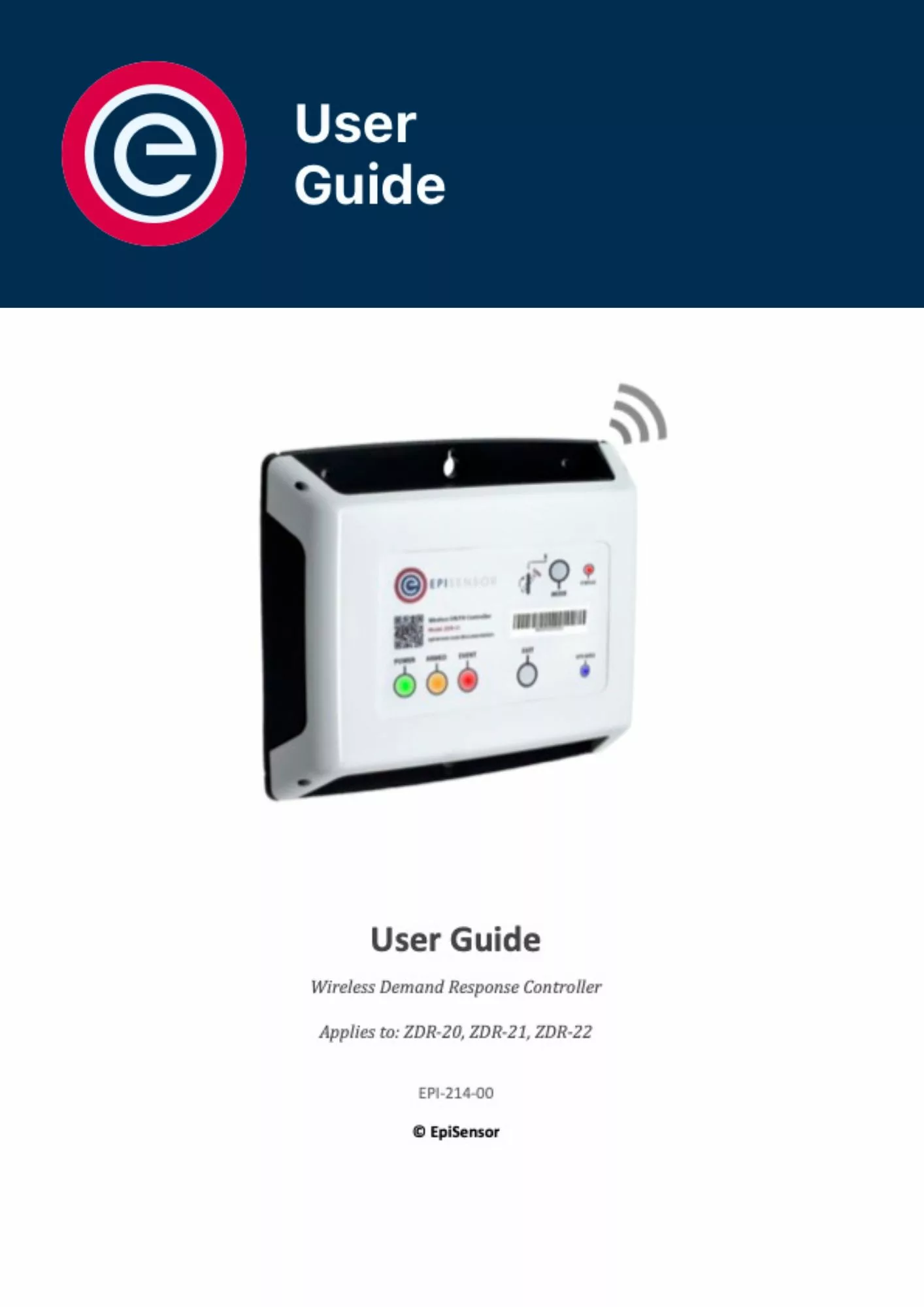 | Wireless Demand Response Controller (ZDR-2X) User Guide | EpiSensor’s ZDR enables customers to participate in multiple Demand and Frequency response programs. It includes best-in-class functionality to accurately monitor electrical load (via CT’s or pulse inputs), frequency and can take action to shed load or engage backup generators based on frequency set points or commands sent from a remote network operations centre. | User Guides | EPI-214-00 | user-guides | zdr | demand-response | |
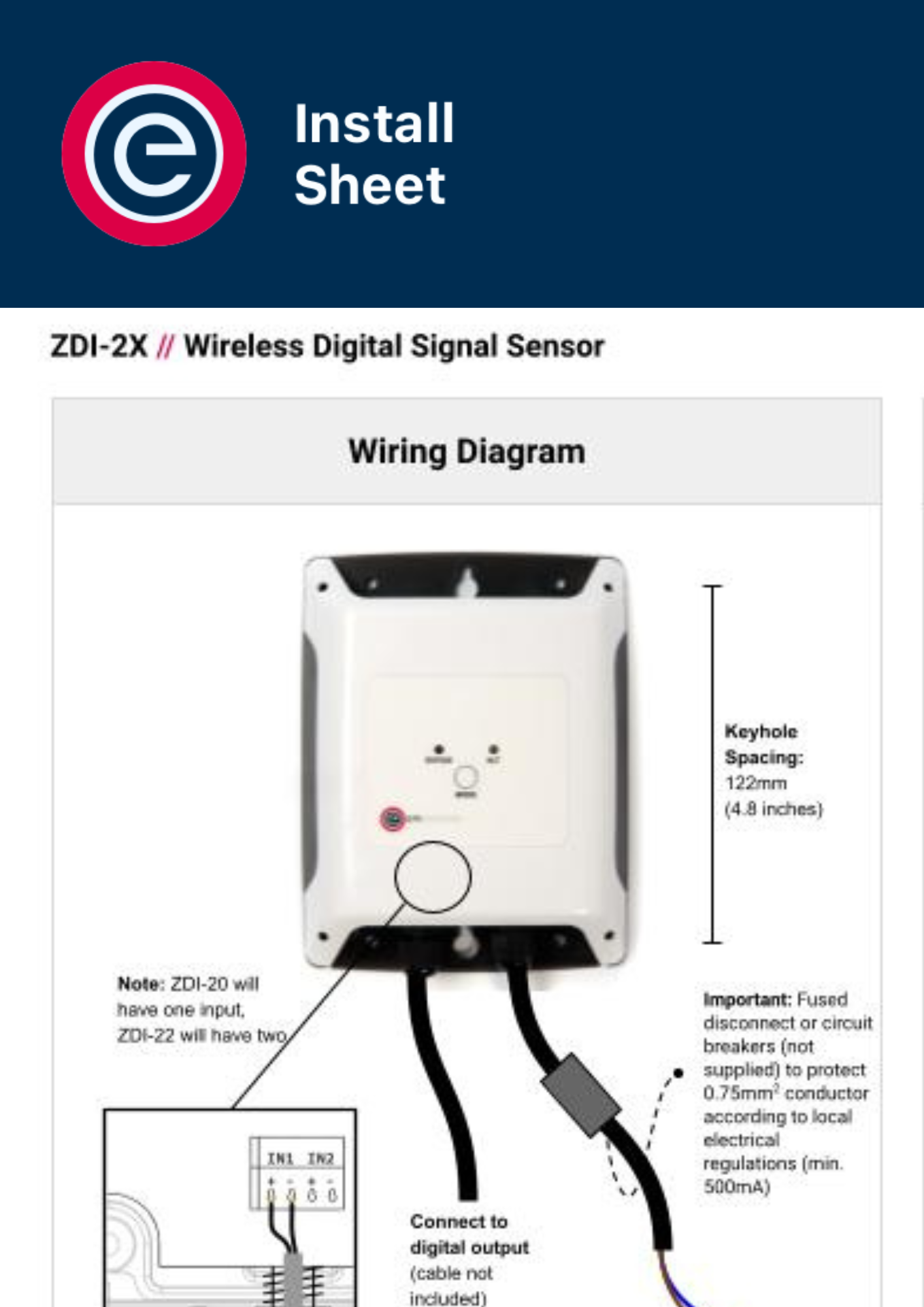 | Wireless Digital Signal Sensor (ZDI-2x) Install Sheet | EpiSensor’s digital signal sensor is used to count pulses produced by mechanical or electrical meters. These pulses typically represent a volume of liquid, water, gas, oil, heat or electricity consumed. This document shows the installation of the EpiSensor Wireless Digital Signal Sensor EpiSensor ZDI-2X. | Install Sheets | EPI-088-00 | install-sheets | zdi | energy-management | |
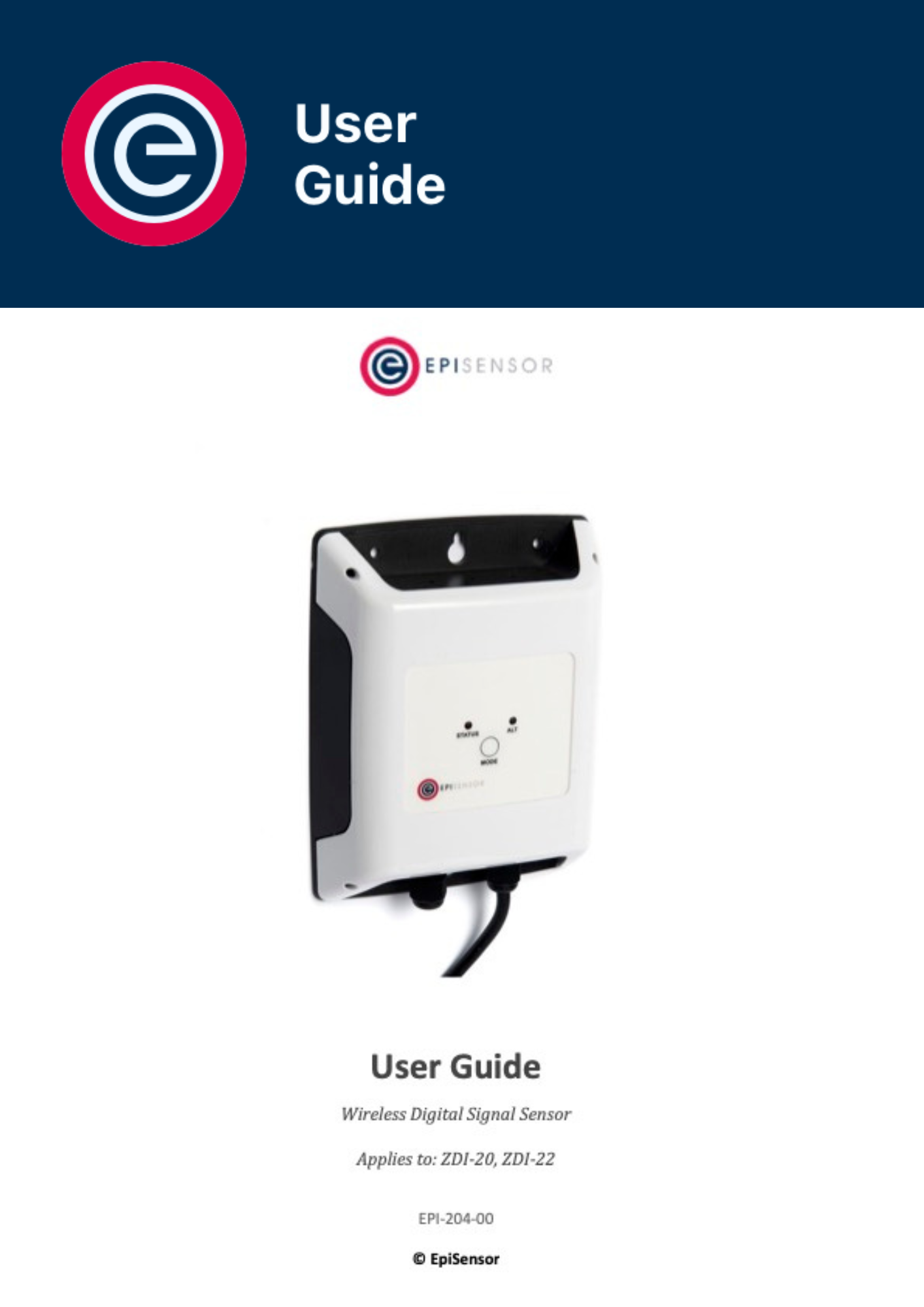 | Wireless Digital Signal Sensor (ZDI-2x) User Guide | EpiSensor’s ZDI Digital Signal Sensor is intended to detect the open/closed status of switches, for example to detect when a door in a warehouse opens, and the percentage of time that it is open for. The ZDI reports the data through the wireless sensor network to the Gateway. | User Guides | EPI-204-00 | user-guides | zdi | energy-management | |
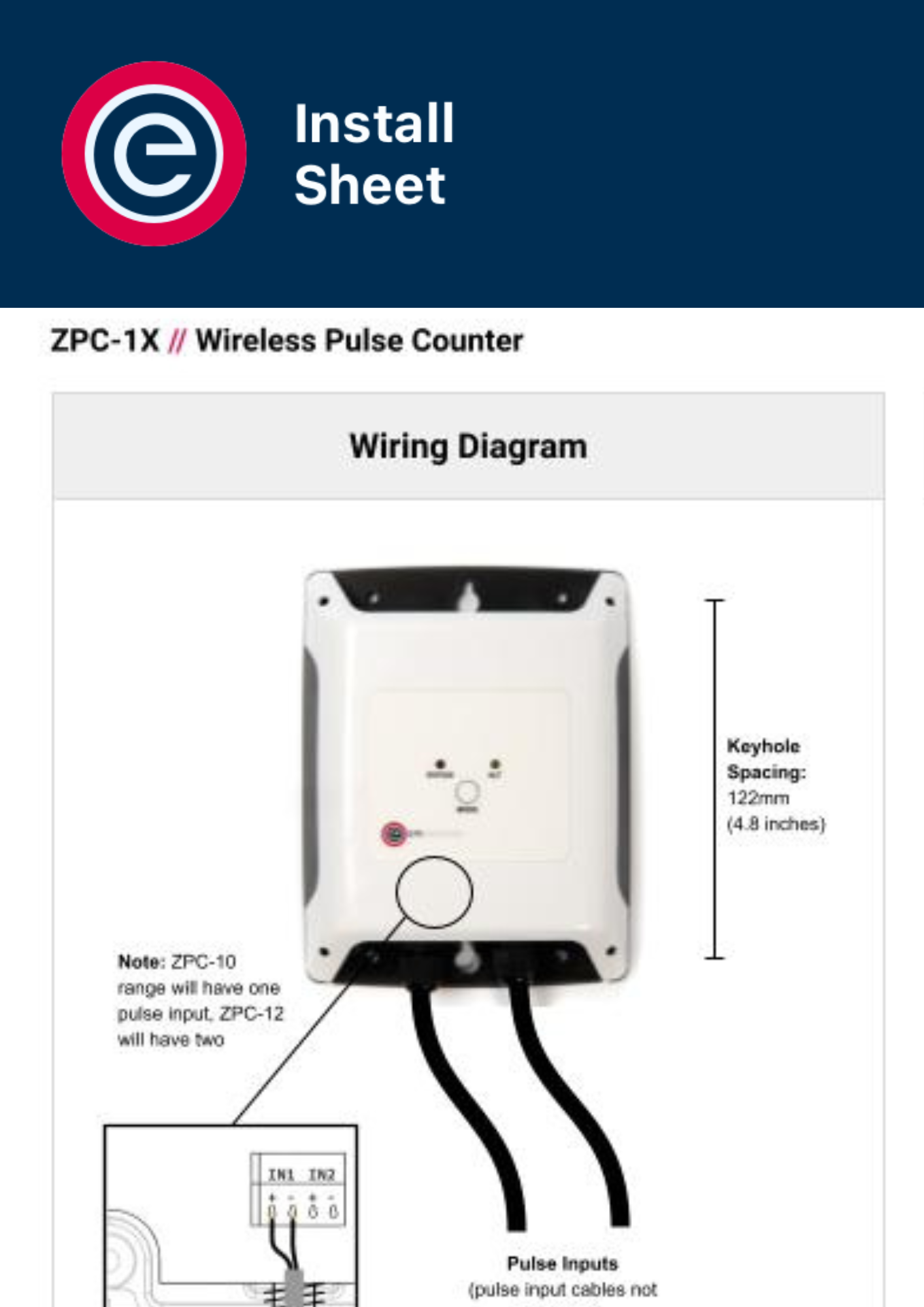 | Wireless Digital Signal Sensor (ZPC-1X) Install Sheet | EpiSensor’s digital signal sensor is used to count pulses produced by mechanical or electrical meters. These pulses typically represent a volume of liquid, water, gas, oil, heat or electricity consumed. | Install Sheets | EPI-073-00 | install-sheets | zpc | energy-management | |
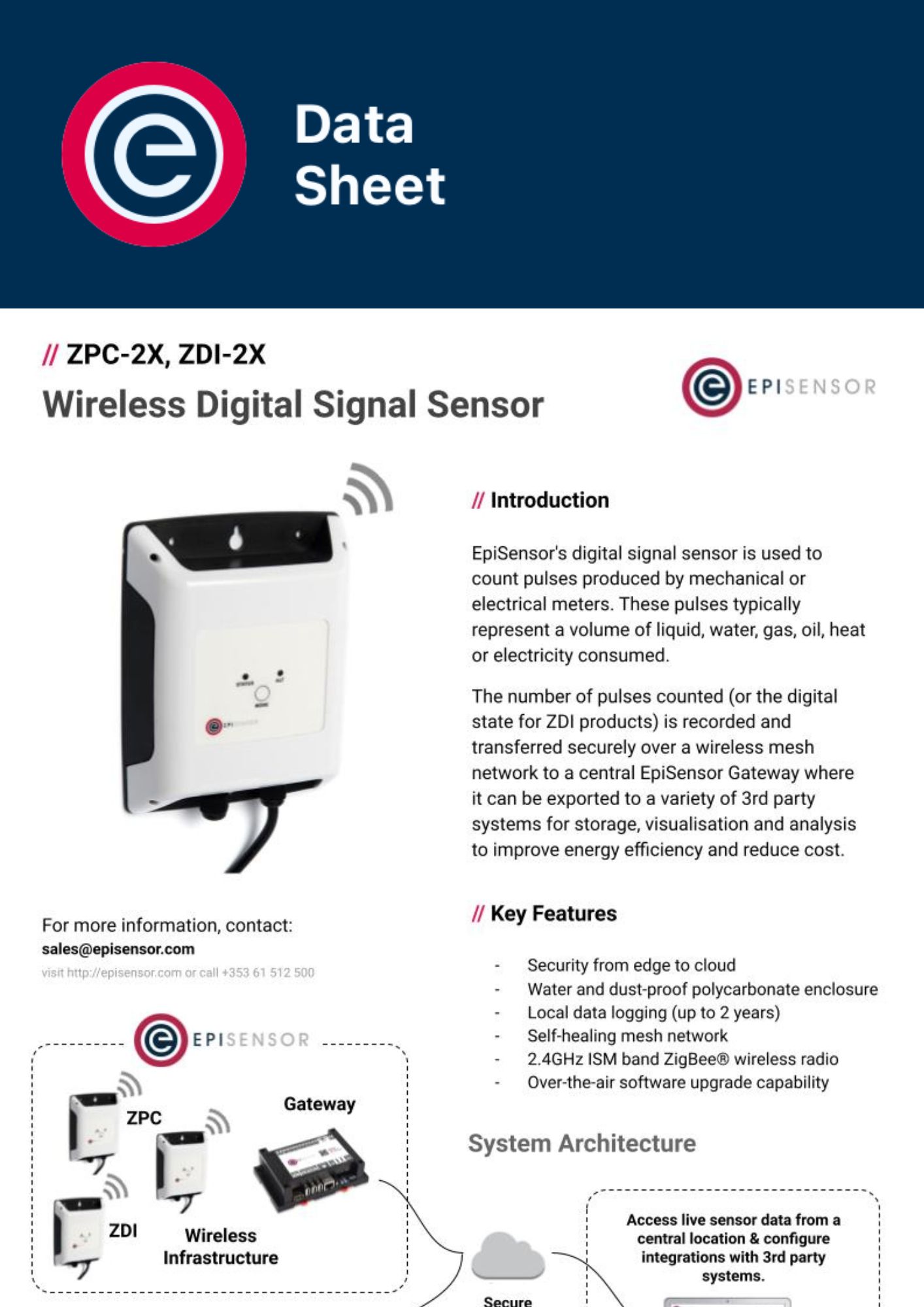 | Wireless Digital Signal Sensor (ZPC-2X) Datasheet | EpiSensor’s digital signal sensor is used to count pulses produced by mechanical or electrical meters. These pulses typically represent a volume of liquid, water, gas, oil, heat or electricity consumed. | Datasheets | EPI-072-00 | datasheets | zpc | energy-management | |
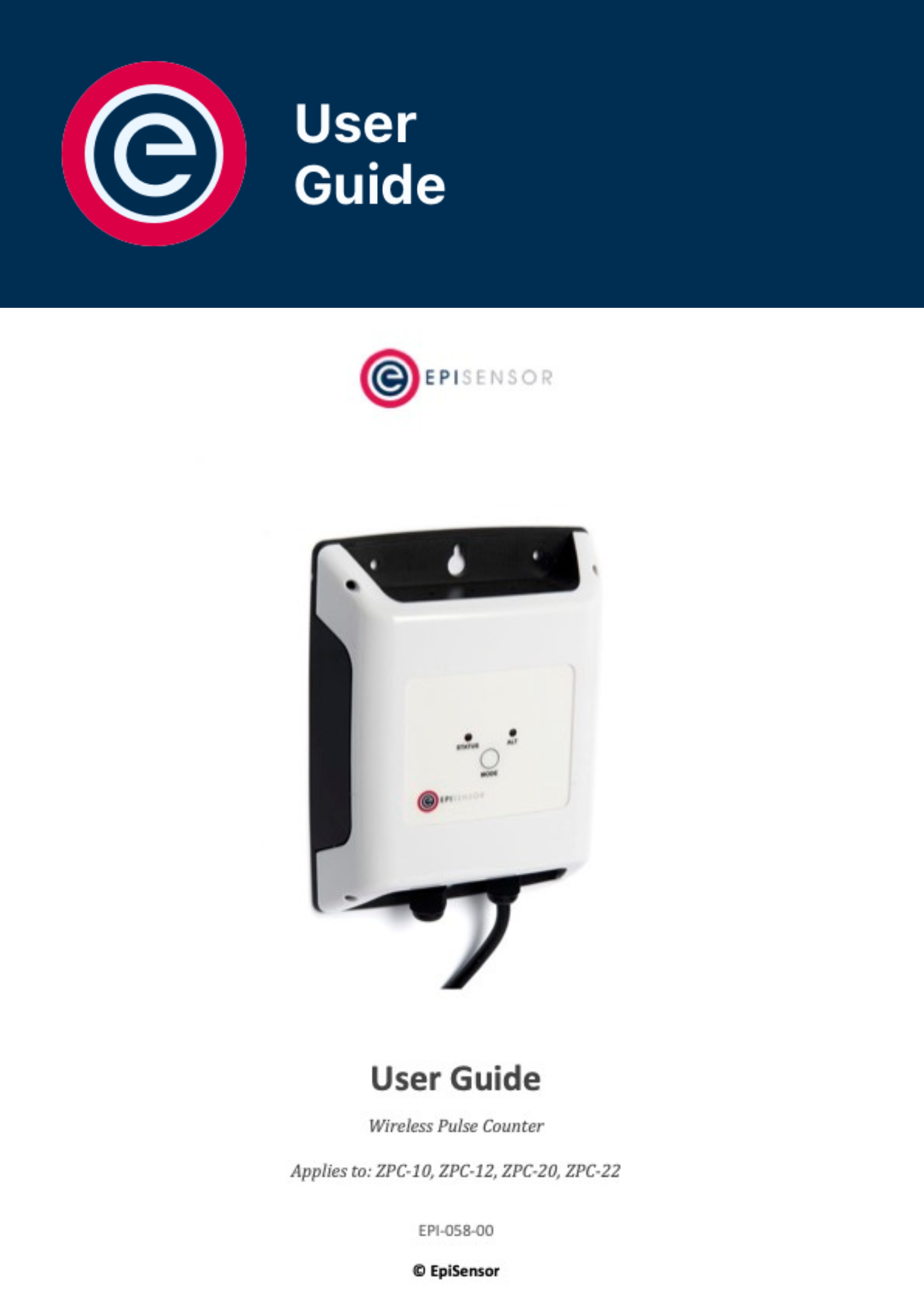 | Wireless Digital Signal Sensor (ZPC) User Guide | User Guide for EpiSensor’s ZPC Pulse Counter (Digital Signal Sensor) which is intended to interface with sensor products which produce either a dry contact (relay/switch), open collector, or an active voltage pulse output. The ZPC reports the data through the wireless sensor network to the Gateway. | User Guides | EPI-058-00 | user-guides | zpc | demand-response energy-management environmental-monitoring | |
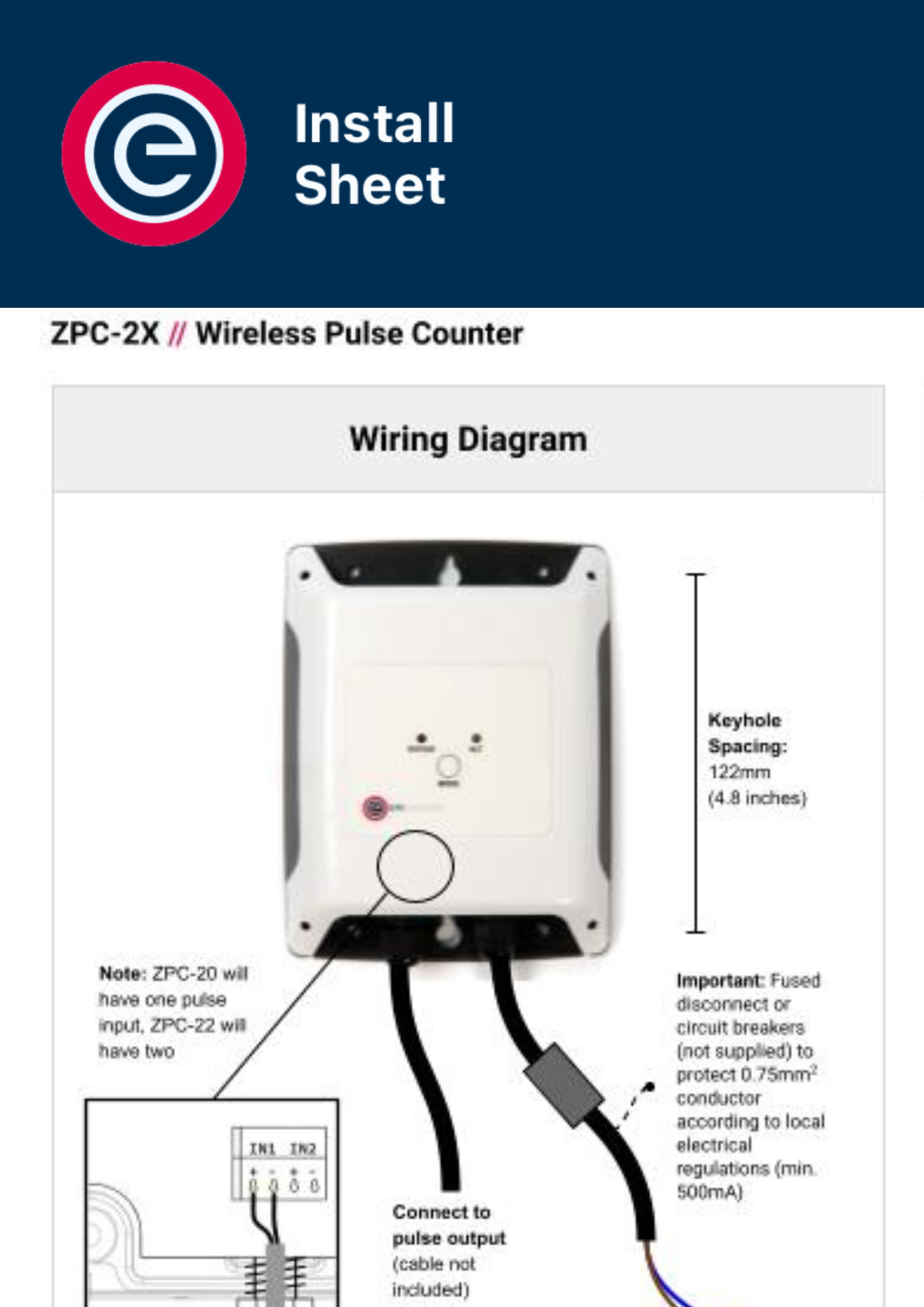 | Wireless Digital Signal Sensor EpiSensor (ZPC-2X) Install Sheet | EpiSensor’s digital signal sensor is used to count pulses produced by mechanical or electrical meters. These pulses typically represent a volume of liquid, water, gas, oil, heat or electricity consumed. | Install Sheets | EPI-074-00 | install-sheets | zpc | energy-management | |
 | Wireless Electricity Monitor (ZEM-3X) Install Sheet – Discontinued | EpiSensor’s ZEM is a highly accurate wireless single phase electricity monitor. It can monitor energy consumption patterns in equipment and buildings remotely via the EpiSensor Gateway, providing facility and energy managers with targeted energy consumption information essential for increasing efficiency. This document shows the installation of the Wireless Single Phase Electricity Monitor ZEM-3X. | Install Sheets | EPI-175-00 | install-sheets | zem | energy-management | |
 | Wireless M-Bus Interface (ZHM-20) Install Sheet – Discontinued | EpiSensor’s Wireless M-Bus Interface ZHM-20 makes it easy to collect data from wired M-Bus-enabled metering equipment. Data is transferred securely over a wireless network to a central Gateway, where it is stored and exported to a variety of 3rd party platforms for tenant billing, storage, visualisation and analysis. | Install Sheets | EPI-087-00 | install-sheets | eol zhm | energy-management | |
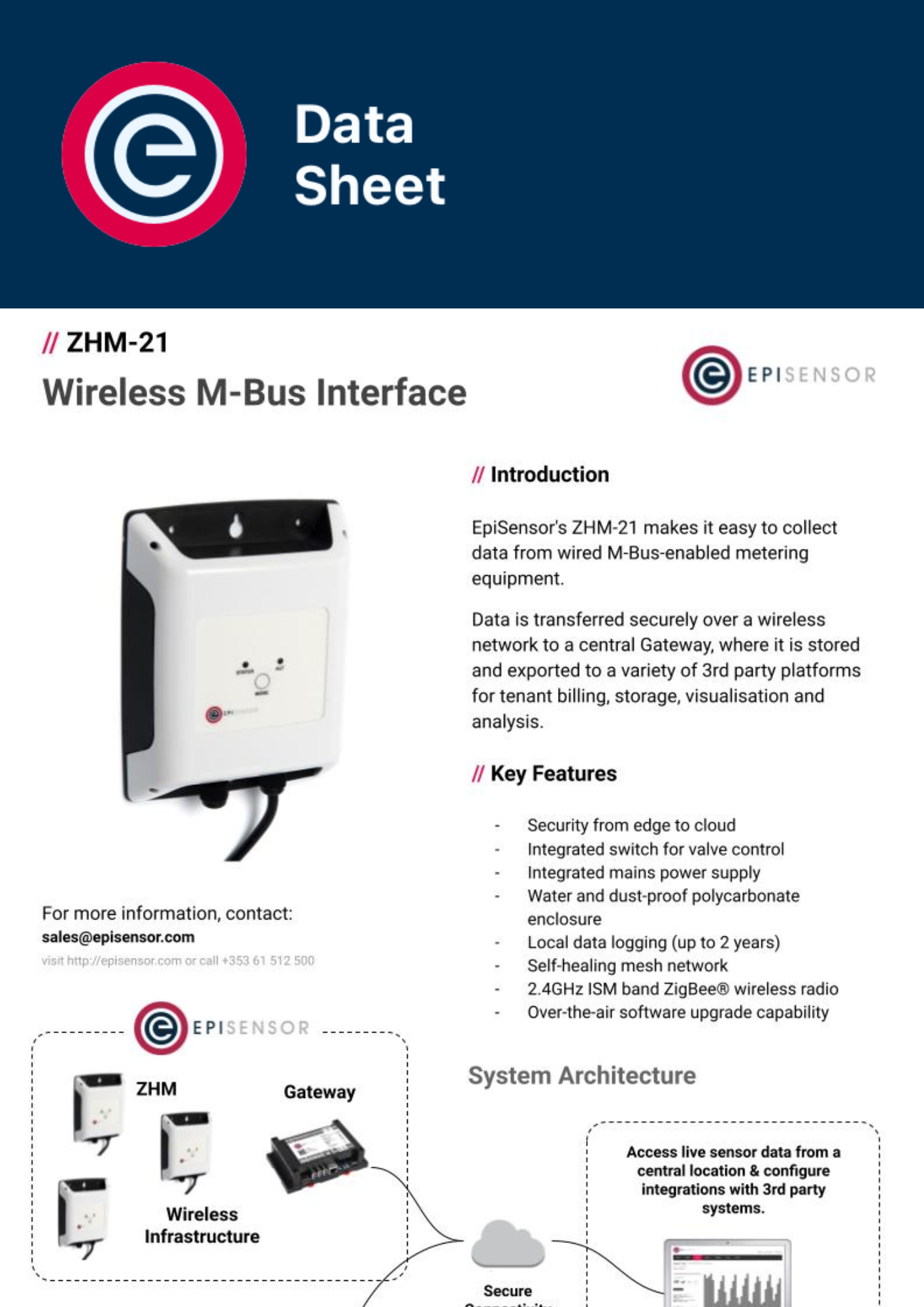 | Wireless M-Bus Interface (ZHM-21) Datasheet | EpiSensor’s ZHM-21 makes it easy to collect data from wired M-Bus-enabled metering equipment. Data is transferred securely over a wireless network to a central Gateway, where it is stored and exported to a variety of 3rd party platforms for tenant billing, storage, visualisation and analysis. | Datasheets | EPI-066-00 | datasheets | zhm | energy-management | |
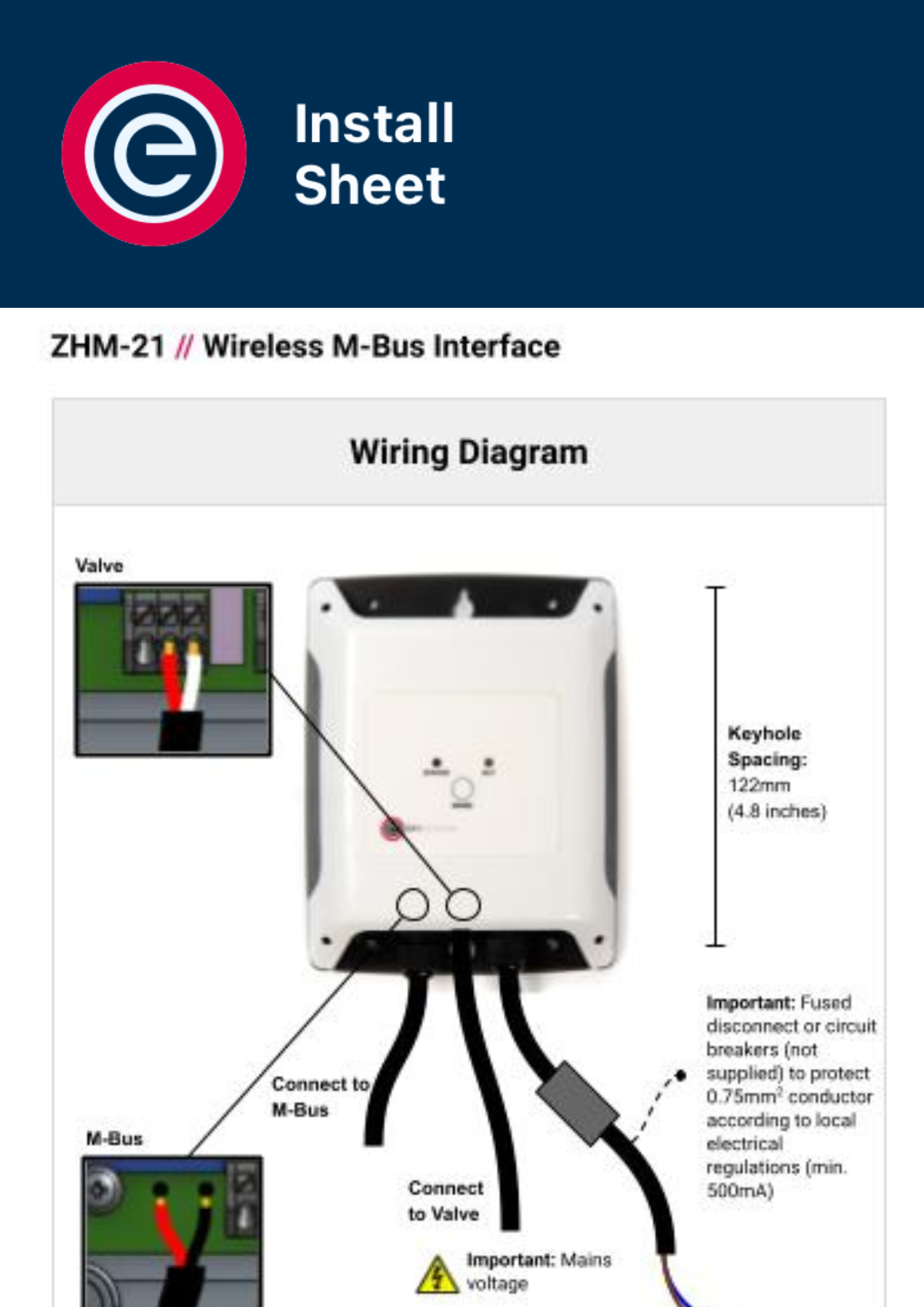 | Wireless M-Bus Interface (ZHM-21) Install Sheet | EpiSensor’s Wireless M-Bus Interface ZHM-21 makes it easy to collect data from wired M-Bus-enabled metering equipment. Data is transferred securely over a wireless network to a central Gateway, where it is stored and exported to a variety of 3rd party platforms for tenant billing, storage, visualisation and analysis. | Install Sheets | EPI-086-00 | install-sheets | zhm | energy-management | |
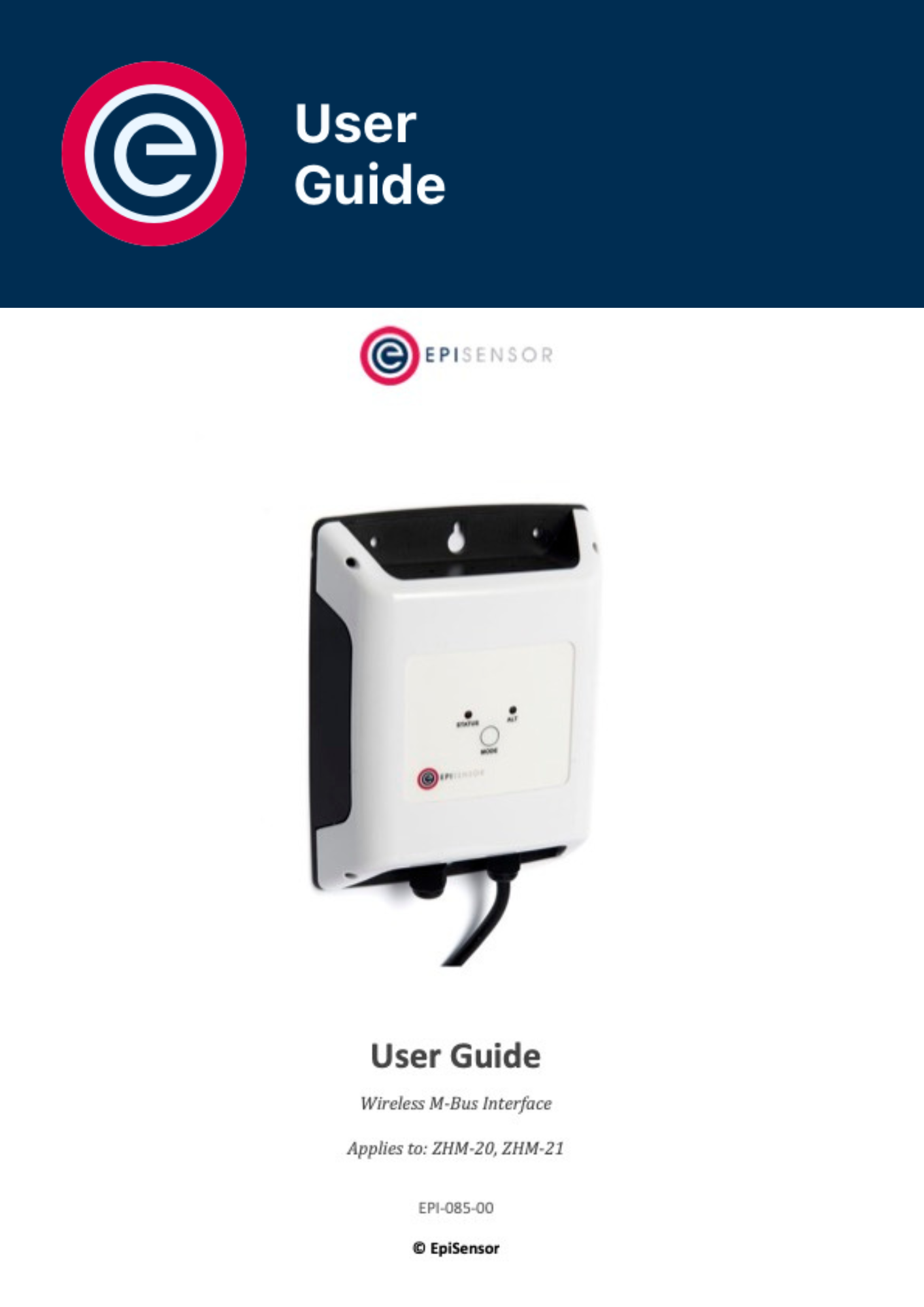 | Wireless M-Bus Interface (ZHM) User Guide | EpiSensor’s ZHM Wireless M-Bus Interface is designed to make it easy to collect data from a wide range of heating, cooling and other energy meters using the M-Bus wired communications standard. The ZHM-21 also includes a relay output that can control a valve, allowing remote shut-off via the API on the EpiSensor Gateway. | User Guides | EPI-085-00 | user-guides | zhm | energy-management | |
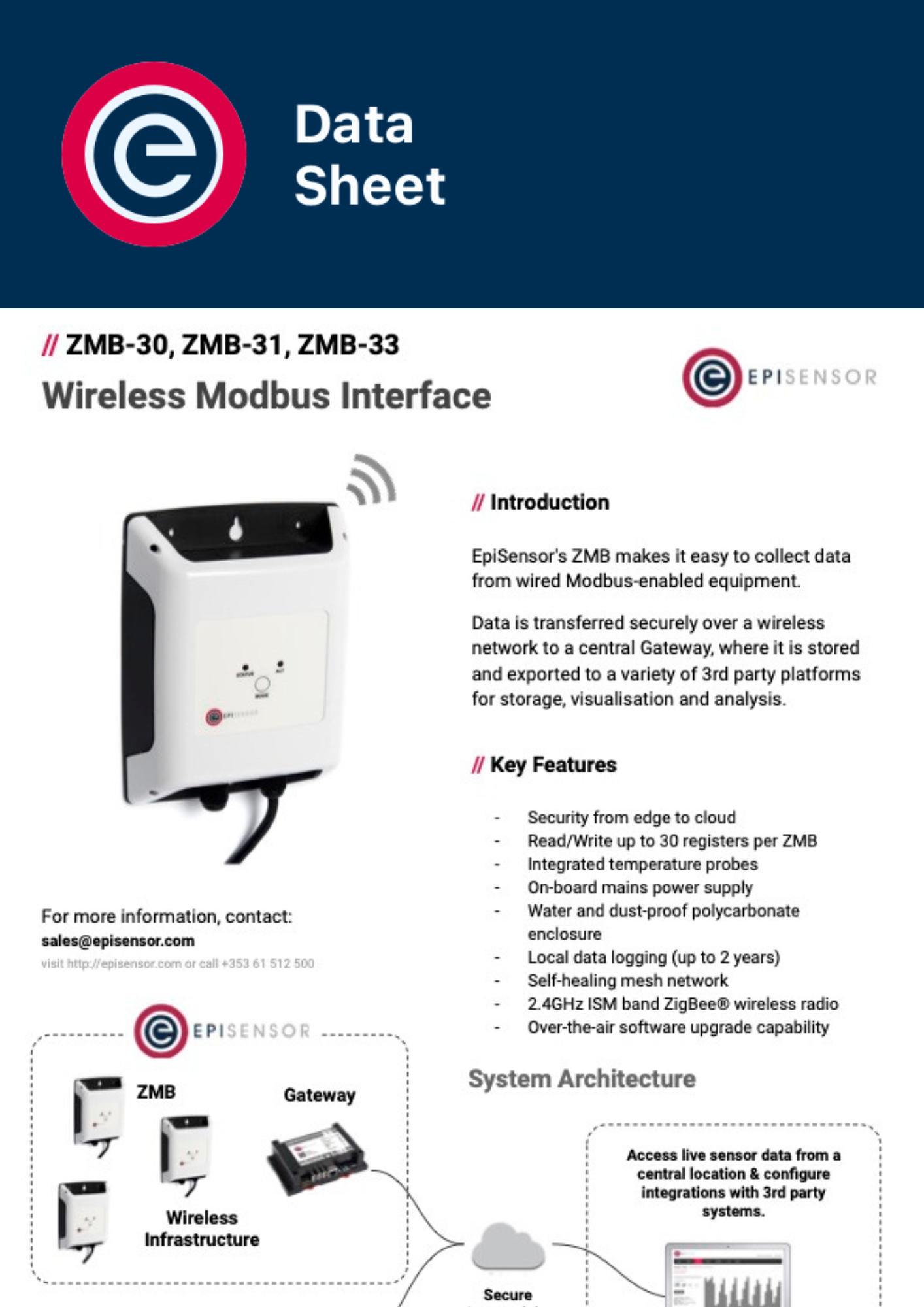 | Wireless Modbus Interface (ZMB-3X) Datasheet | EpiSensor’s ZMB makes it easy to collect data from wired Modbus-enabled equipment. Data is transferred securely over a wireless network to a central Gateway, where it is stored and exported to a variety of 3rd party platforms for storage, visualisation and analysis. | Datasheets | EPI-195-00 | datasheets | zmb | energy-management | |
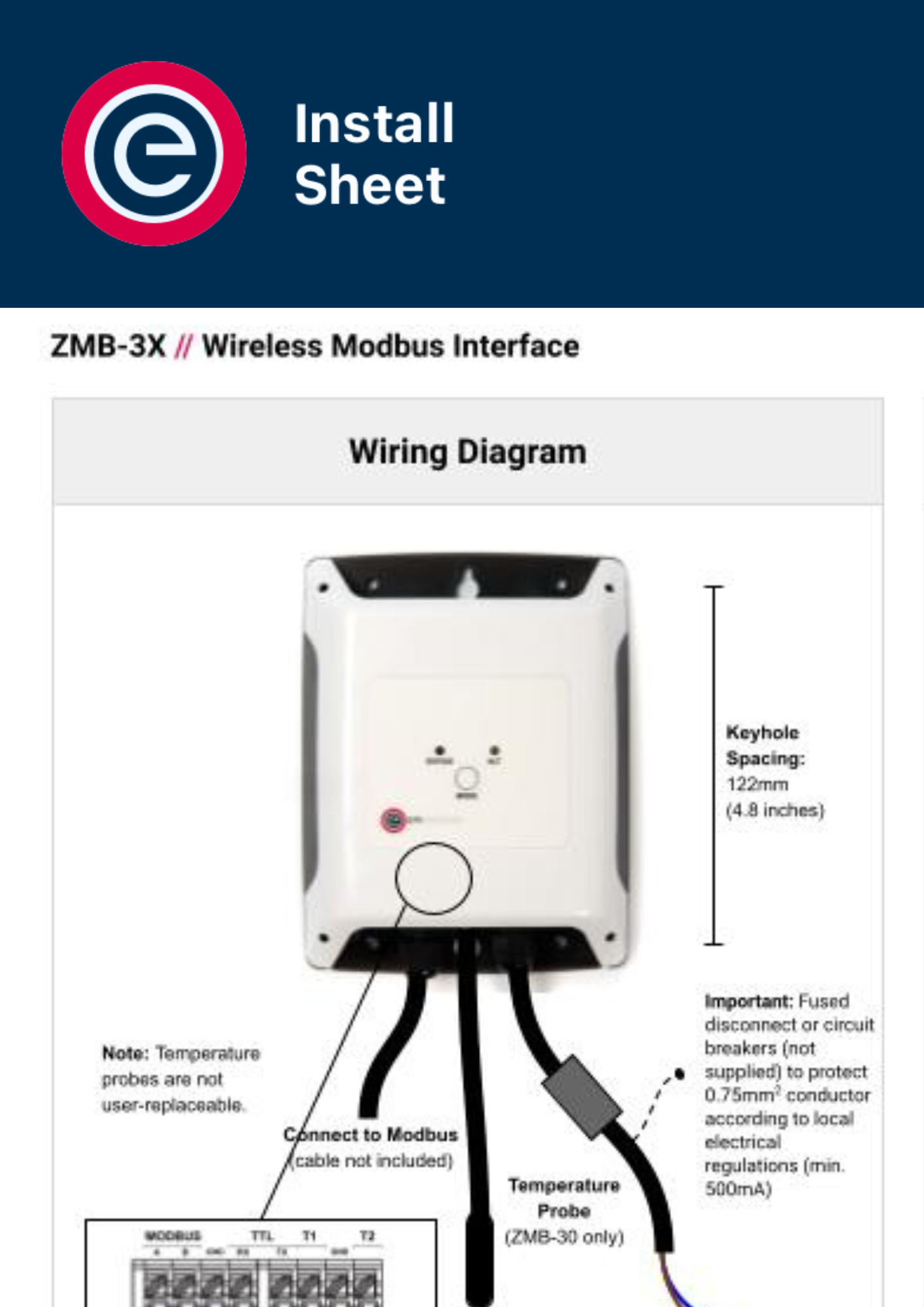 | Wireless Modbus Interface (ZMB-3X) Install Sheet | EpiSensor’s Wireless Modbus Interface (ZMB) makes it easy to collect data from wired Modbus-enabled equipment. | Install Sheets | EPI-090-00 | install-sheets | zmb | energy-management | |
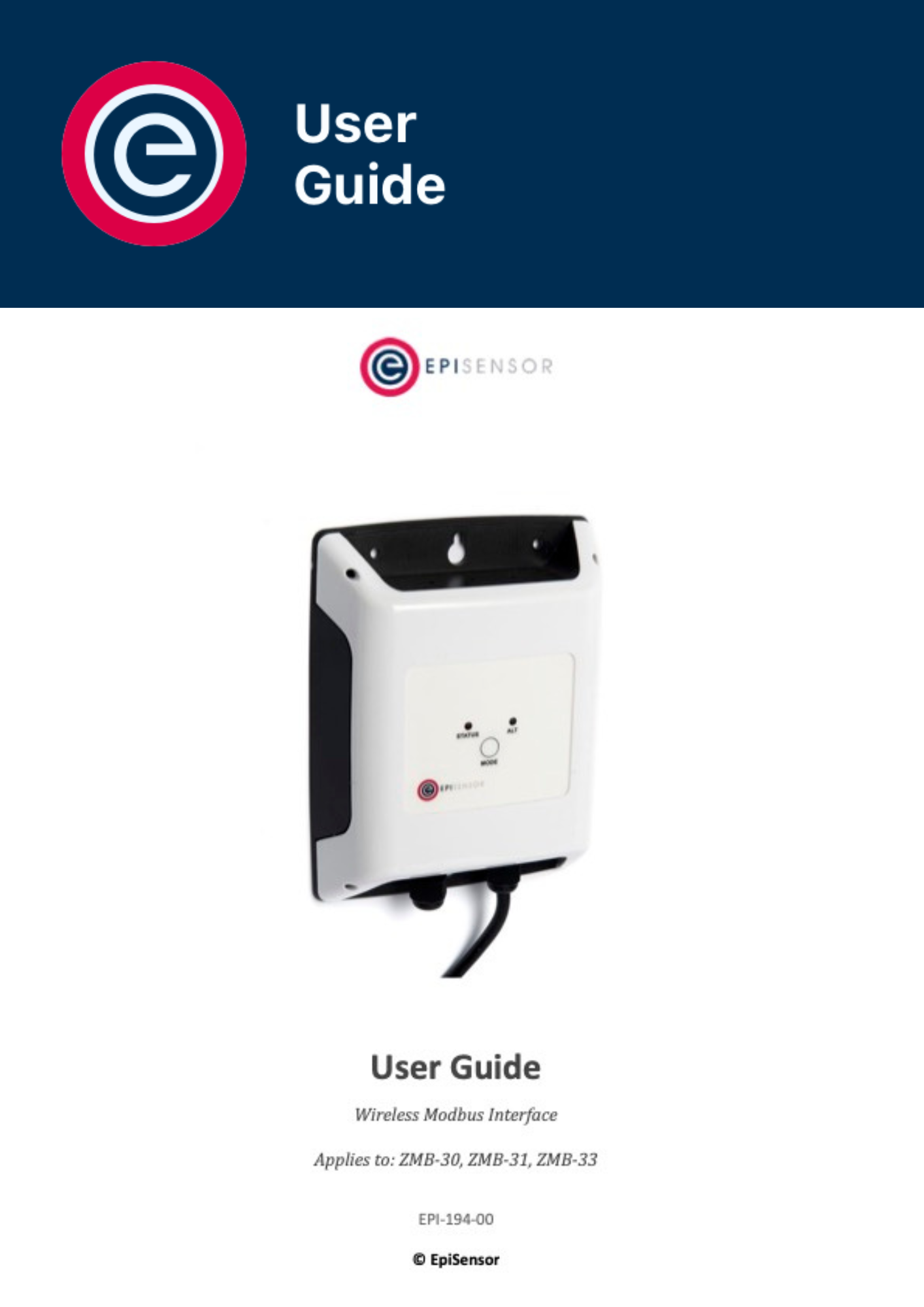 | Wireless Modbus Interface (ZMB) User Guide | User Guide for EpiSensor’s ZMB Wireless Modbus Interface is designed to make it easy to collect data from a wide range of heating, cooling and other energy meters using the Modbus RTU (over RS-485) wired communications standard. | User Guides | EPI-194-00 | user-guides | zmb | demand-response energy-management environmental-monitoring | |
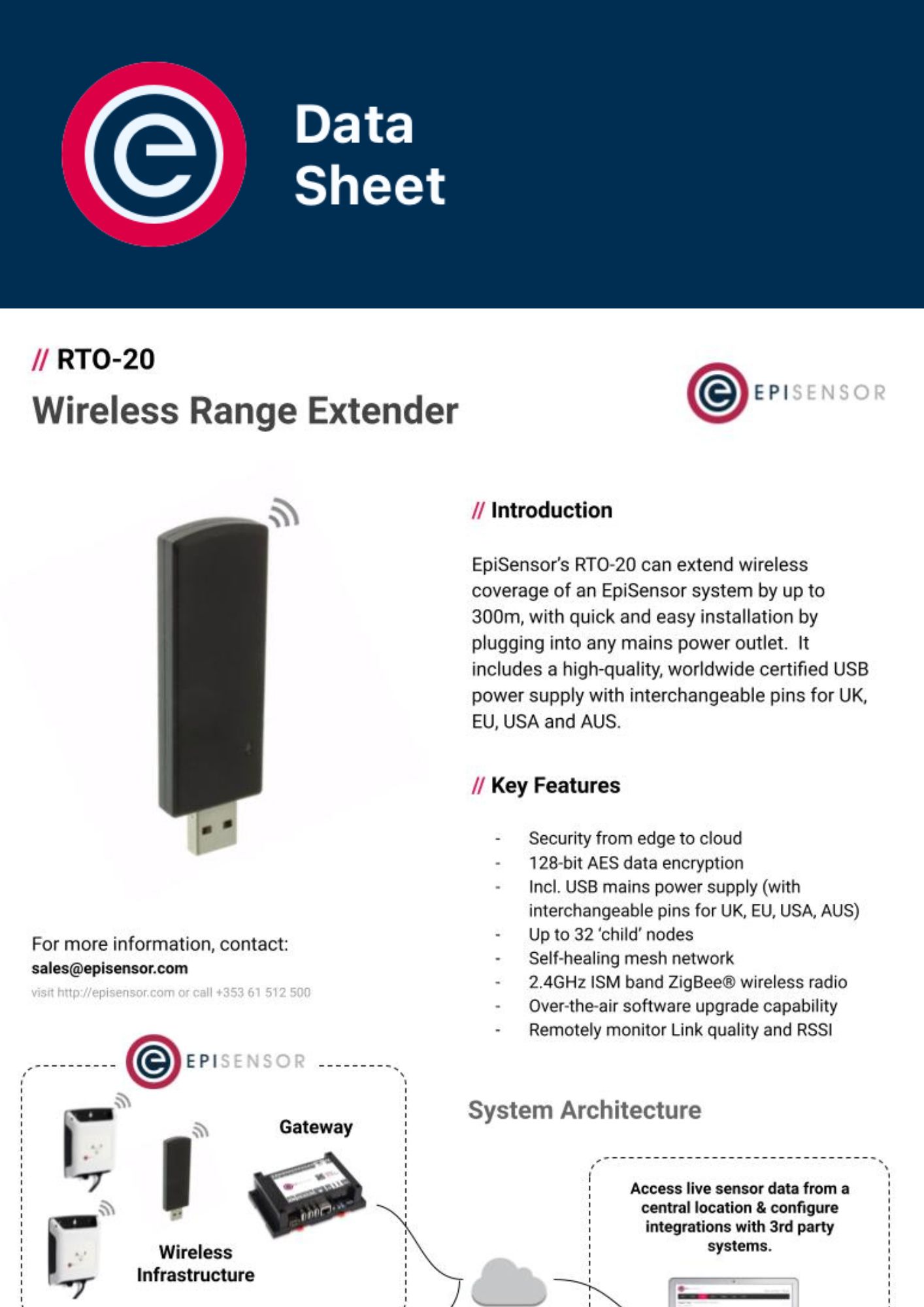 | Wireless Range Extender (RTO-20) Datasheet – Discontinued | EpiSensor’s RTO-20 can extend wireless coverage of an EpiSensor system by up to 300m, with quick and easy installation by plugging into any mains power outlet. It includes a high-quality, worldwide certified USB power supply with interchangeable pins for UK, EU, USA and AUS. | Datasheets | EPI-171-00 | datasheets | rto | demand-response energy-management environmental-monitoring | |
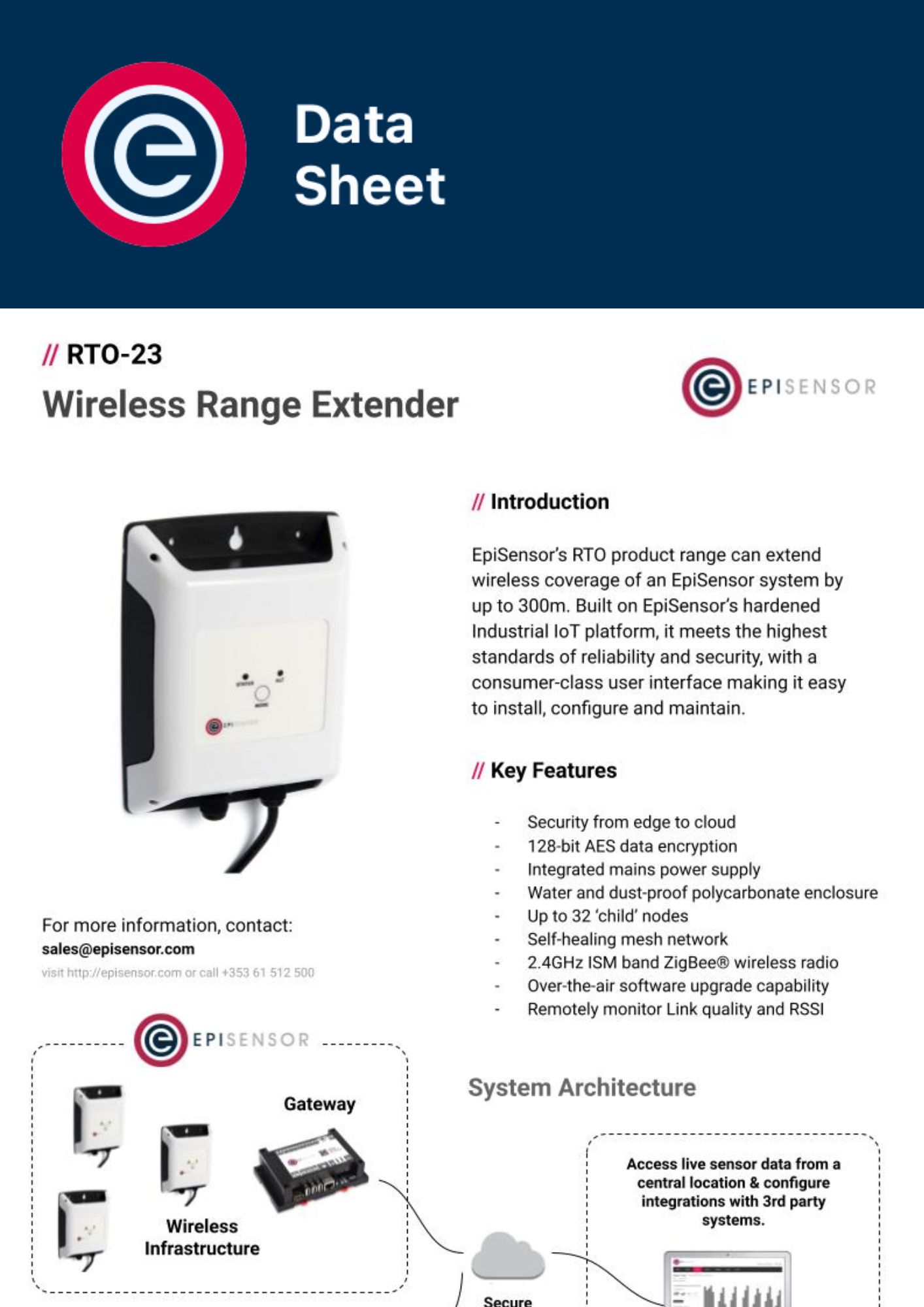 | Wireless Range Extender (RTO-23) Datasheet | EpiSensor’s RTO product range can extend wireless coverage of an EpiSensor system by up to 300m. Built on EpiSensor’s hardened Industrial IoT platform, it meets the highest standards of reliability and security, with a consumer-class user interface making it easy to install, configure and maintain. | Datasheets | EPI-066-00 | datasheets | rto | demand-response energy-management environmental-monitoring | |
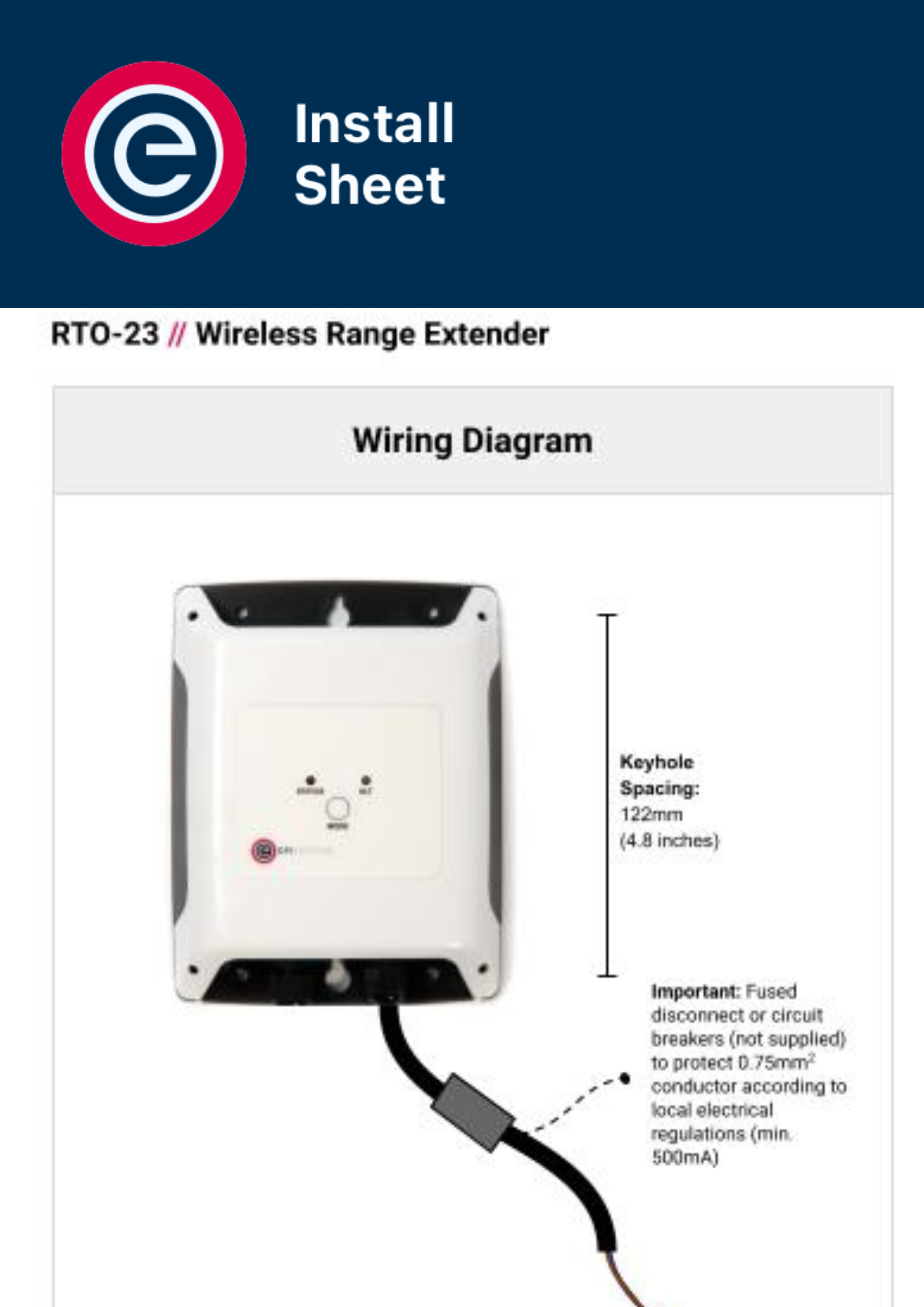 | Wireless Range Extender (RTO-23) Install Sheet | EpiSensor’s RTO product range can extend wireless coverage of an EpiSensor system by up to 300m. Built on EpiSensor’s hardened Industrial IoT platform, it meets the highest standards of reliability and security, with a consumer-class user interface making it easy to install, configure and maintain. This document shows the installation of the Wireless Range Extender RTO-23. | Install Sheets | EPI-092-00 | install-sheets | rto | demand-response energy-management environmental-monitoring | |
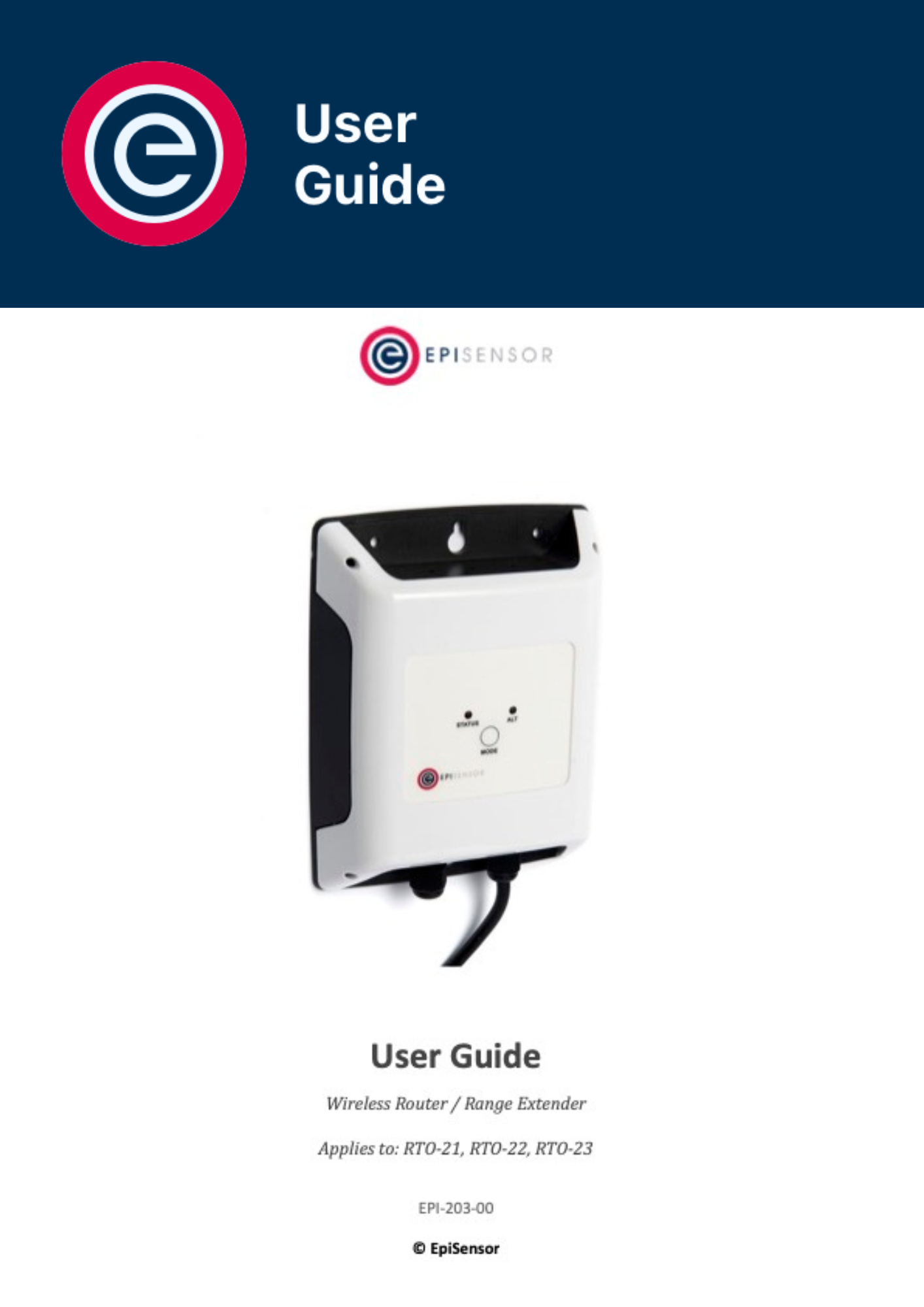 | Wireless Range Extender (RTO) User Guide | EpiSensor’s RTO Wireless Routers / Range Extenders are intended to expand the area covered by an EpiSensor wireless sensor network. They can overcome signal blocking obstacles such as walls, doors and ceilings as well as extend coverage along corridors. They can be used outside to connect a wireless network between buildings or over open ground. | User Guides | EPI-203-00 | user-guides | rto | demand-response energy-management environmental-monitoring | |
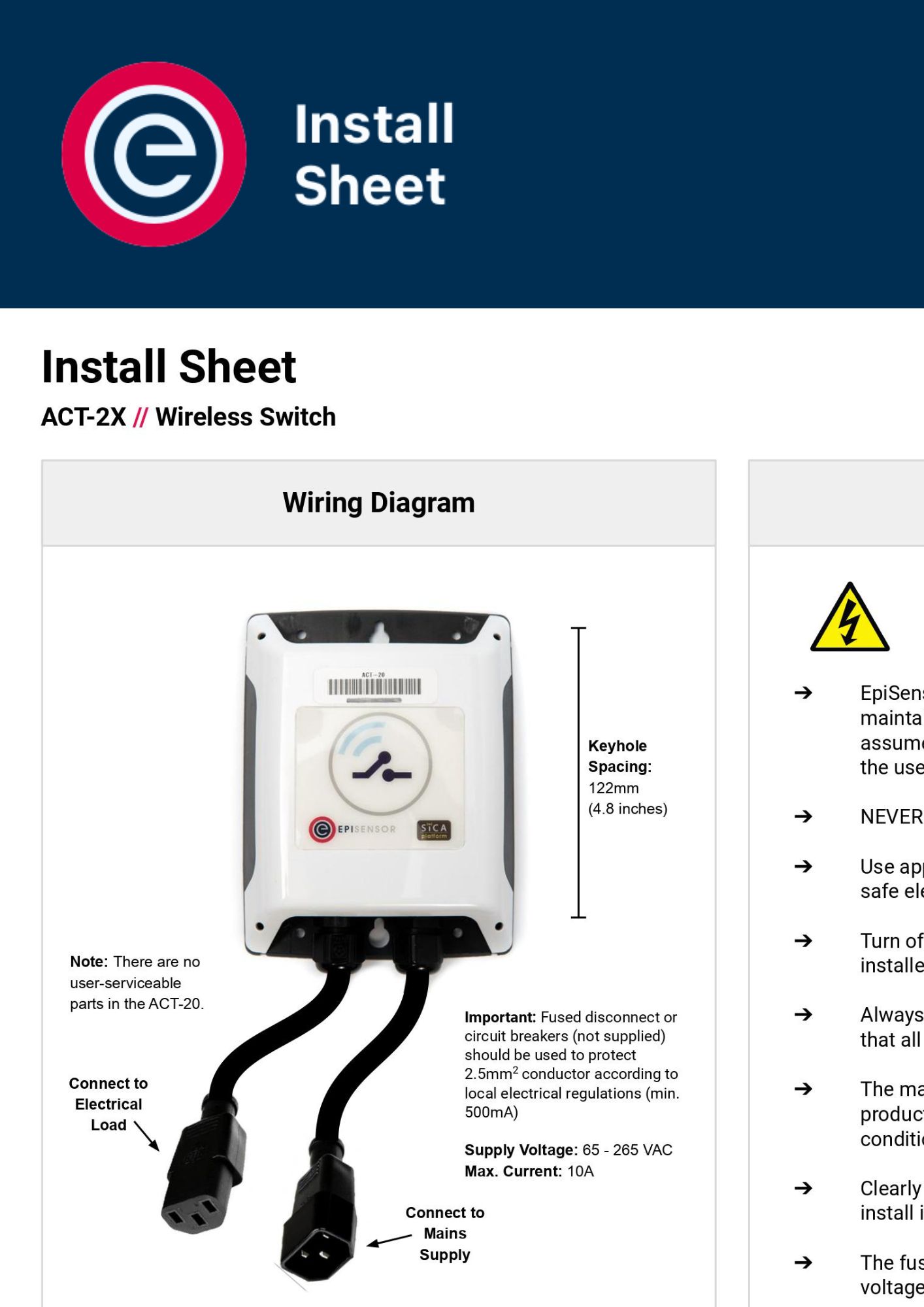 | Wireless Switch (ACT-2X) Install Sheet | This Install Sheet refers to EpiSensor’s Wireless Switch ACT 2X. This diagram gives a high level view of the integration of EpiSensor Gateway software and devices with IoT software apps over cloud networks to assist with: Temperature Monitoring | Install Sheets | EPI-098-00 | install-sheets | act | demand-response energy-management environmental-monitoring | |
 | Wireless Temperature and Humidity Sensor (HTS-1X) Install Sheet | This Install Sheet refers to EpiSensor’s Wireless Temperature and Humidity Sensor. This system diagram gives a high level view of the integration of EpiSensor Gateway software and devices with IoT software apps over cloud networks to assist with: Temperature Monitoring | Install Sheets | EPI-095-00 | install-sheets | hts | environmental-monitoring | |
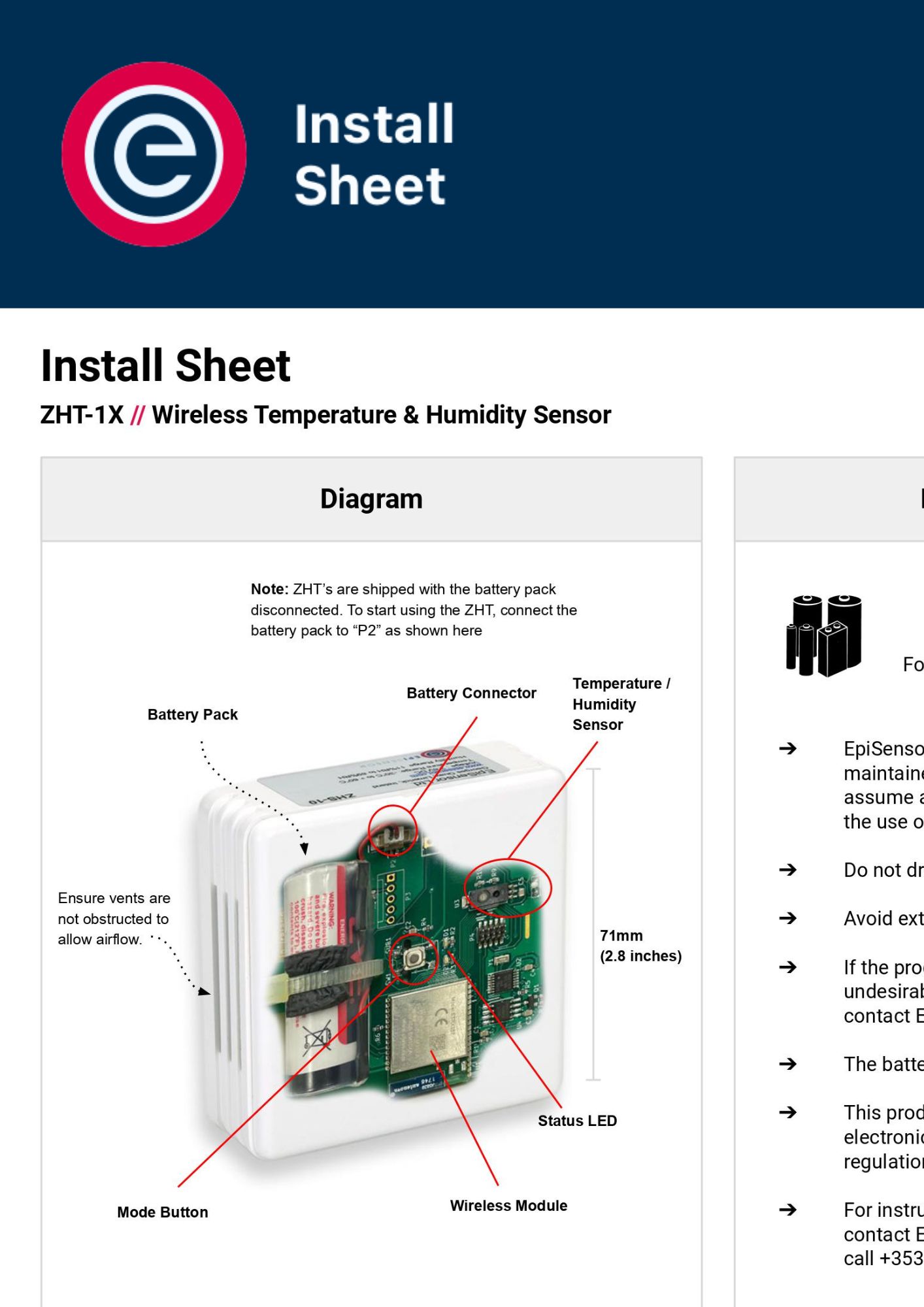 | Wireless Temperature and Humidity Sensor (ZHT 1X) Install Sheet | This Install Sheet refers to EpiSensor’s Wireless Temperature and Humidity Sensor. | Install Sheets | EPI-218-00 | install-sheets | zht | environmental-monitoring | |
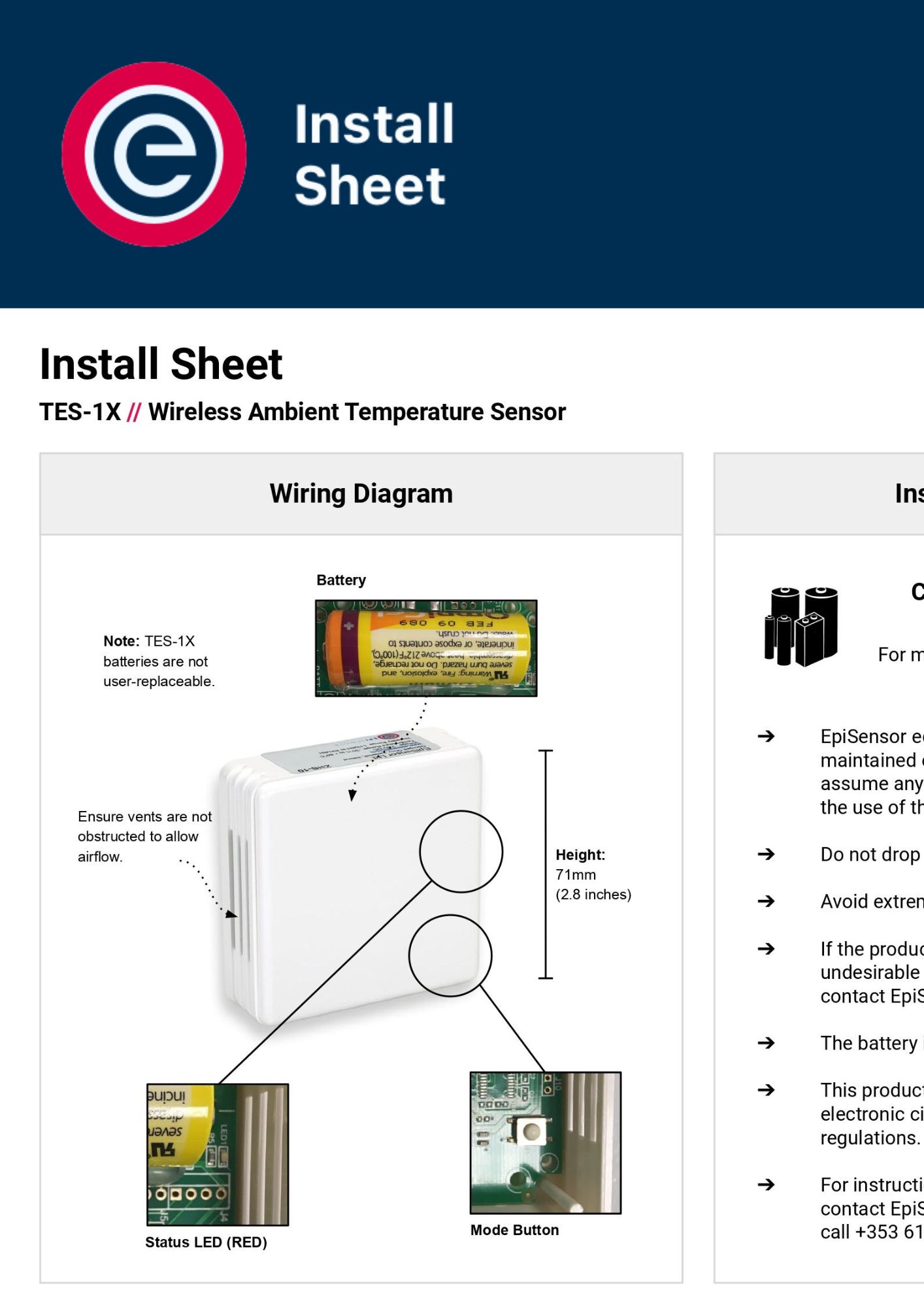 | Wireless Temperature Sensor (TES-1X) Install Sheet | This Install Sheet refers to EpiSensor’s Wireless Ambient Temperature Sensor. This system diagram gives a high level view of the integration of EpiSensor Gateway software and devices with IoT software apps over cloud networks to assist with: Temperature Monitoring | Install Sheets | EPI-093-00 | install-sheets | tes | environmental-monitoring | |
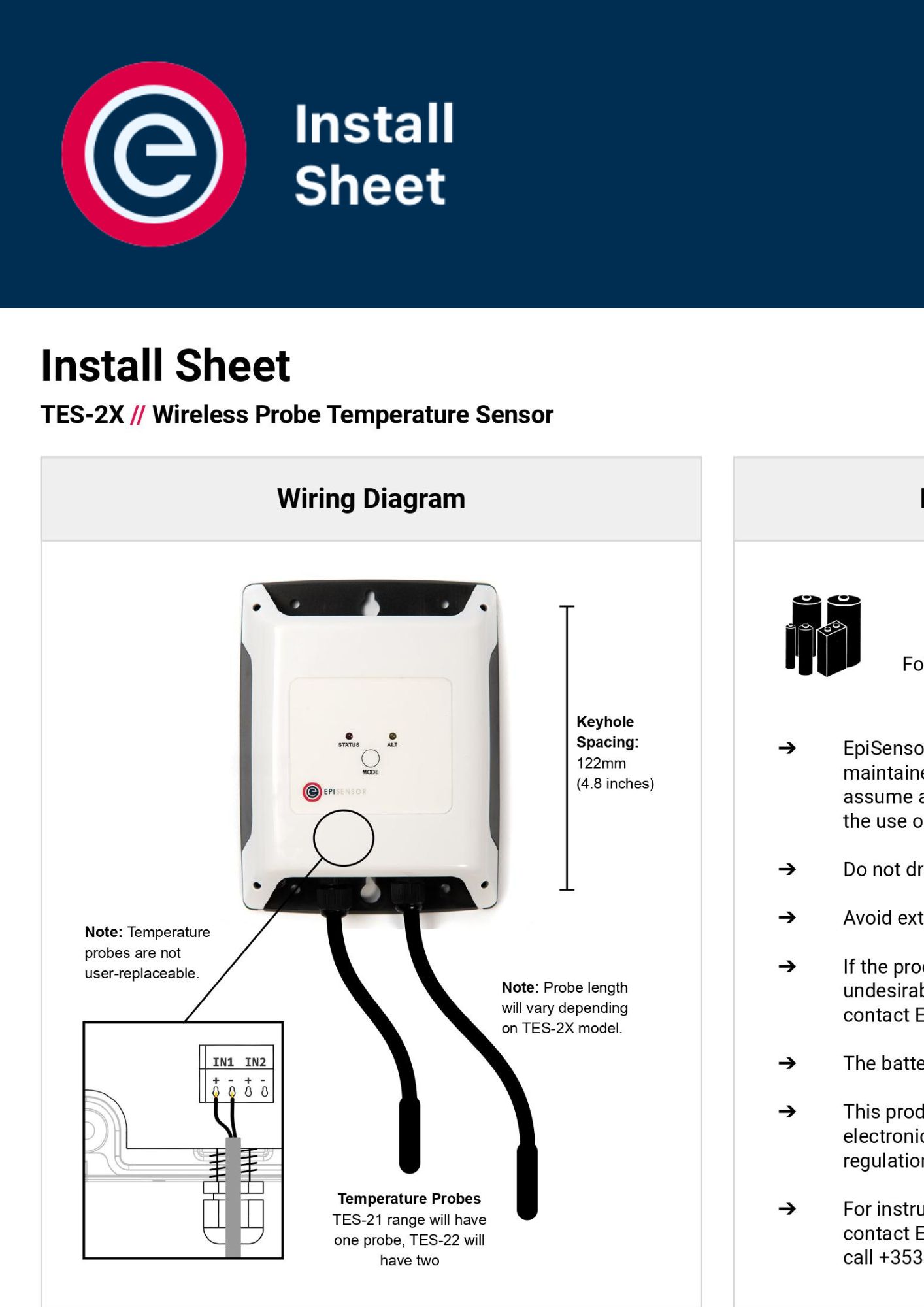 | Wireless Temperature Sensor (TES-2X) Install Sheet | EpiSensor’s TES is a flexible, highly accurate wireless single or dual-channel probe temperature sensor. It can monitor environmental conditions in buildings and assets remotely and securely via the EpiSensor Gateway, providing facility managers with the granular real-time data they need to improve efficiency, reduce costs and improve performance. | Install Sheets | EPI-094-00 | install-sheets | tes | environmental-monitoring | |
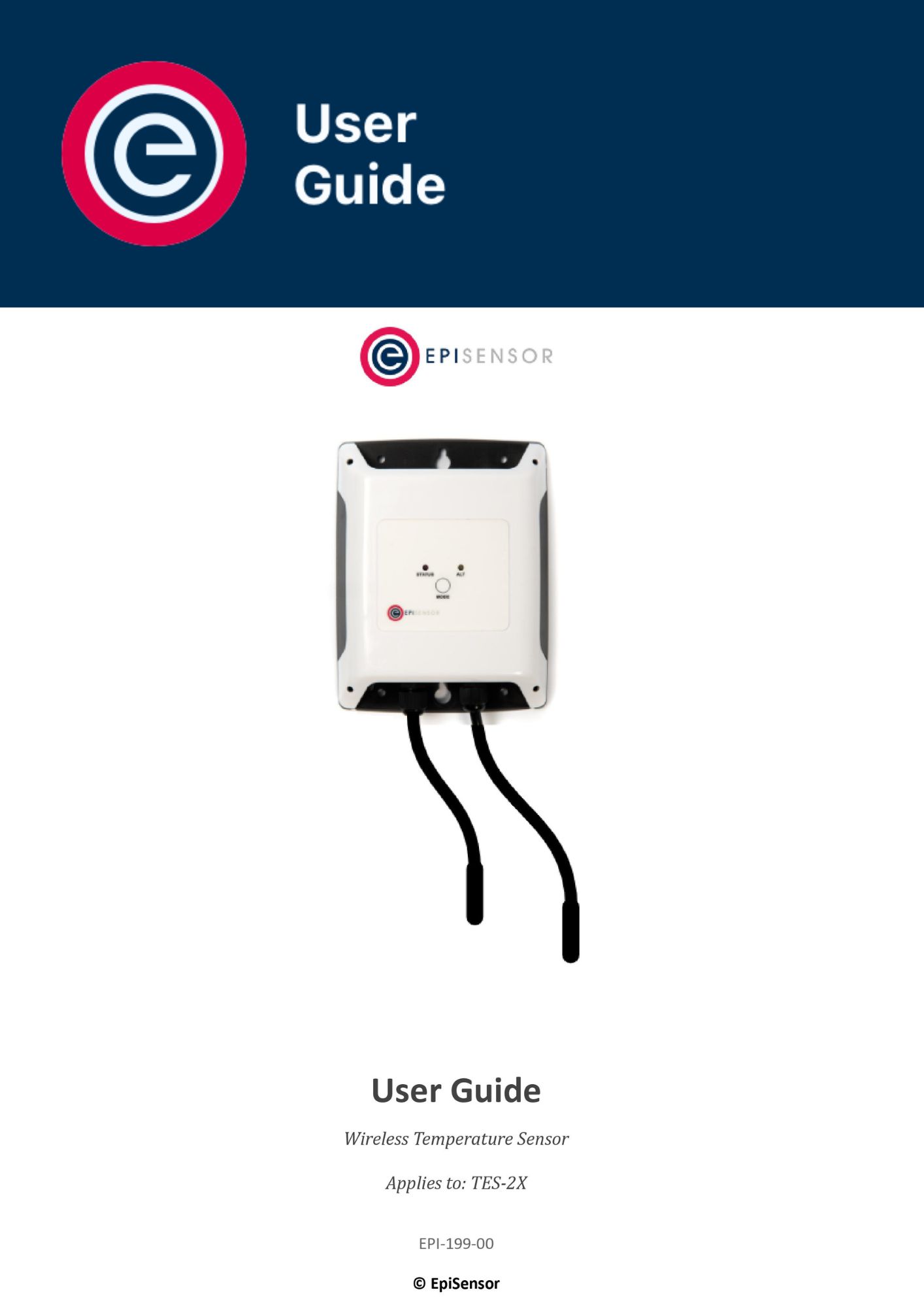 | Wireless Temperature Sensor (TES-2x) User Guide | EpiSensor’s TES-2x Temperature Sensor is intended to measure the temperature of a probe. Various probe options are available allowing the probe to be immersed in a liquid, or connected to a pipe. The probe is also available with different lengths. | User Guides | EPI-199-00 | user-guides | tes | environmental-monitoring | |
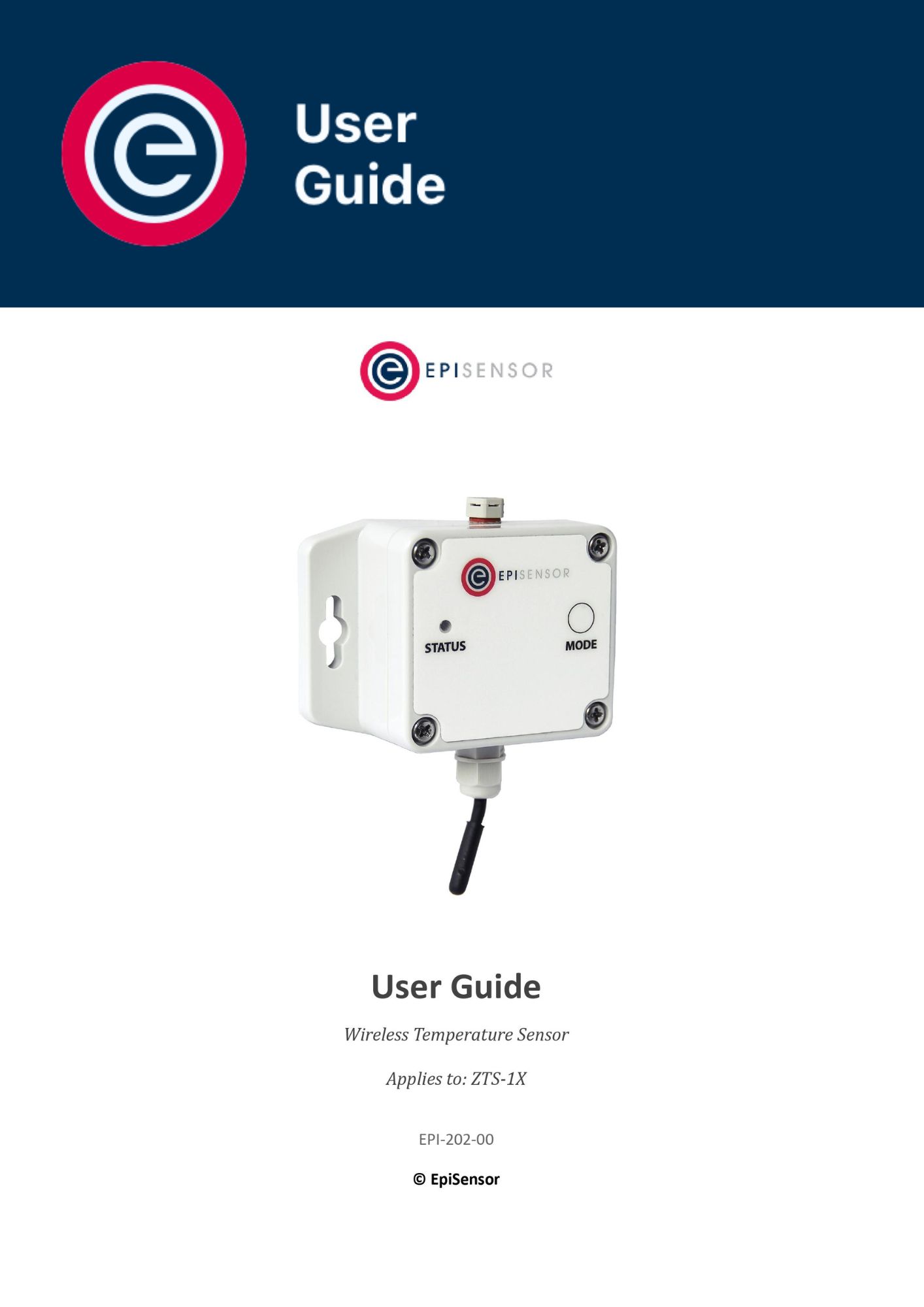 | Wireless Temperature Sensor (ZTS-1X) User Guide | This product has been discontinued. If you have purchased this product and would like to upgrade to the latest technology, please contact us. User Guide for EpiSensor’s ZTS-1x Temperature Sensor. It is intended to measure the temperature via a probe. Various probe options are available allowing the probe to be immersed in a liquid, or connected to a pipe. | User Guides | EPI-202-00 | user-guides | zts | environmental-monitoring |